


































































































Who we are
We are a Catholic healthcare service inspired by the spirit and vision of the Missionary Sisters of the Sacred Heart of Jesus.
What we believe
We are a community of care, reaching out with compassion, integrity, courage and respect to all we serve.
What we do
We provide excellence in all of our services and work to identify and meet unmet needs.
Our values are drawn from Mother Cabrini’s life and reflect her heart, her spirit, her conviction and her approach.
Compassion: Our drive to care is not just a professional duty to provide excellent quality care but is born of a heartfelt compassion for those in need, motivated by God’s love for all people.
Integrity: We believe in the power of hope to transform people’s lives and remain faithful to the bold healing mission and legacy of Mother Cabrini.
Courage: We have the strength, determination, vision and conviction to continue the work of Mother Cabrini and the Missionary Sisters of the Sacred Heart of Jesus.
Respect: We believe every person is worthy of the utmost respect and the best possible healthcare. We know that our resources are entrusted to us to use for the benefit of others.
We acknowledge the Boon Wurrung and Wurundjeri Peoples of the Kulin Nation, who are the traditional custodians of the land and waters where Cabrini Health is situated, and pay our respect to elders –past, present and emerging.

227
total publications
70 newly approved projects
50 staff, comprising 18 investigators, 24 research support and 8 research operations professionals
277 active research projects
55% of newly approved research projects are dealing with cancer
36 clinical trials started accounting for over 50% of newly approved projects
21% of newly approved projects were first in human clinical trials
$6.3M in revenue, including $3.1m in clinical trials income, $2m of philanthropic funding, and $1m from external competitive grants
112 clinical trials hosted at Cabrini
$417,714 awarded across seven internal Cabrini Foundation grants
31 new resources developed to meet the requirements of the National Clinical Trials Governance Framework
This year marks my fifth as Group Director of Cabrini Research, during which I have witnessed incredible progress across our diverse contributions to medicine.
The 2023-24 period was particularly notable for our institute, as we achieved a number of key milestones – several representing the culmination of years of effort. This progress is a testament to the dedication of our clinicians, scientists, and support professionals, while also a reflection of Cabrini’s unwavering commitment to research, made in the belief that today’s discoveries will transform the lives of future patients.
The past 12 months saw our research build upon past foundations while addressing newly emerging clinical questions. There was a total of 277 active projects this year, over 100 of these being clinical trials, alongside 227 peer-reviewed publications, which collectively attracted more than 3200 citations, underscoring the relevance and impact of our work. Pleasingly, many of these were featured in leading journals, allowing us to benchmark against global standards and advance our critical discoveries into real-world clinical settings.
Nursing Research continued to make important findings regarding hospital-acquired infections, commencing phase I of the HAPPEN trial. The department also contributed to the CLEEN study, which published critical evidence for improved health systems in The Lancet Infectious Diseases. Efforts were also made to strengthen capacity in research implementation in partnership with the Infection Prevention and Control Department at Cabrini Health, which will be supported by a newly recruited Research Fellow, joining in April 2025.
Surgery continues to work with healthcare providers across Victoria to align care more closely with patient needs by promoting the use of patient-reported outcome measures. This mission has also been realised through in-depth analyses of its longitudinal data assets, exploring personalised surgical interventions that adapt to the location and profile of patient tumours. The department has also expanded its collection of preclinical models for colorectal cancer, creating a comprehensive platform for next-generation clinical approaches that spans the full breadth of the care continuum.
Cardiology experienced marked growth in both the scope and depth of its research this year. Recent trials in electrophysiology, surgical techniques, and nuclear medicine have revealed how minimally invasive cardiac procedures are fast becoming more effective, safer, and accessible to a wider patient population. The importance of these advances is evidenced by the marked
increase in department publications, which continue to be made in high-impact journals such as JAMA, JAMA Cardiology, and the American Journal of Cardiology
Urology has sustained its strong momentum from last year to make further progress towards optimised applications of focal therapy for patients with prostate cancer. This work has occurred alongside a series of trials exploring the use of advanced imaging and theranostics, in collaboration with GenesisCare and Cabrini Imaging. New opportunities in translational research have also emerged with the appointment of Associate Professor Weranja Ranasinghe, who was awarded an Auric Innovation Grant for his work in expanding patient eligibility for radiotherapies.
Medical Oncology saw a strong focus on immunotherapies across its clinical trials program, alongside a new generation of multiple indication targeted therapies, resulting from recent advances in therapeutic development. This has informed the department’s priorities in discovery research, which seeks to better understand why certain therapies are only effective for specific cancer types and patient profiles. The department has also taken important steps in expanding its organoid program to now include gynaecologic conditions, while the exercise oncology program was featured in Nature Medicine for its contributions to the PREFERABLE trial.
Many of these achievements were showcased at the Cabrini Research Forum in November, which featured 62 posters from across the organisation’s diverse research disciplines. This annual gathering provides an invaluable platform for researchers to share knowledge, iterate improved experimental approaches, and recognise the excellence of peers. My congratulations go to all award recipients and participants for their contributions and for helping Cabrini Research maintain its drive towards discovery and innovation in patient-focused medical research.
Collaboration remains a cornerstone of Cabrini’s approach to research, enabling us to combine our clinical strengths with world-class scientific expertise to develop new biomedical solutions. This has continued through our long-standing partnership with the Faculty of Medicine, Nursing and Health Sciences at Monash University, specifically the School of Translational Medicine at the Alfred Hospital and the Monash University Biomedicine Discovery Institute.
Our partnership with Omico was also noteworthy this year, allowing us to expand our genomic profiling services through the Precision Oncology Screening Platform enabling Clinical Trials (PrOSPeCT) study. We continued our active involvement with the Monash Partners Comprehensive Cancer Consortium, working with partner organisations to ensure the dissemination of knowledge and resources throughout the rapidly evolving
field of cancer genomics. These efforts will be critical as we build our precision oncology program, supported by a $10 million philanthropic commitment from the PMF Foundation, which will introduce broadly accessible genomic profiling services for patients throughout south-east Victoria.
Considerable attention has been directed towards measures in preparation for the Short Notice Assessment Program (SNAP) under the National Clinical Trials Governance Framework (NCTGF). This is the first time Cabrini will be formally evaluated as a clinical trials provider under the Framework, which will involve up to 30 active trials, along with input from principal investigators and clinical trial participants. For Cabrini, this is an opportunity to demonstrate how patient outcomes and experiences remain at the core of everything we do, and are well embedded in our institutional processes and culture. Members from Research Governance and Quality Offices sought to capture existing strengths by working towards the highest maturity rating available under SNAP. This has required alignment of our policies and procedures with NCTGF standards, a detailed whole-of-institution gap analysis, and a subsequent action plan. These efforts were supported by an evolution in our governance structures and new strategic links to the Cabrini Board via the Cabrini Research Committee.
The Cabrini Australia Group Strategy 2021-25 has guided our work over the past four years, setting priorities and objectives in accordance with Cabrini’s core values of compassion, integrity, courage, and respect. During this period, Cabrini Research has moved closer to its goal of becoming a nationally recognised private research institute, successfully meeting most of its strategic objectives and remaining on track to address outstanding items before the end of the strategy period.
Several developments have been pivotal in laying a strong foundation for our future. Notably, the scope of our translational research continues to expand, the Cabrini Cancer Institute has opened and has driven growth in clinical trials and exercise oncology, and Cardiology Research has become an integral department in our non-cancer portfolio. Building on these new capacities, we have begun preparing for our successor strategy, which will introduce a renewed focus on securing our long-term future over the 2026-30 period.
As part of this process, extensive consultation and analysis is currently being undertaken and will inform the development of our new strategic plan. Progress to date has highlighted the likely importance of three intersecting domains – challenges across the private healthcare sector; government priorities in

medical research; and changing needs across the clinical trials ecosystem. Confronting these realities will allow us to reach a strategic framework that not only reinforces past successes, but enables us to adapt to future challenges, ensuring the delivery of a truly unique end-to-end model of care at Cabrini.
The achievements over this year would not have been possible without the dedication of our research departments, clinical and scientific partners, and community advocates. Their tireless efforts uphold our mission to deliver tangible benefits for patients. I extend my thanks to members across the Cabrini Research Committee, the Scientific Advisory Committee, the Research Governance Committee, and the Cabrini Research Consumer and Community Involvement Committee for their guidance. I would also like to acknowledge the ongoing support of Cabrini Health, our CEO Sue Williams, the Cabrini Australia Board, and the Cabrini Sisters, whose leadership and support are fundamental to our progress.
Finally, to our donors, thank you for your unwavering belief in our vision. Your generosity has built our capacity to explore life-saving interventions, attract exceptional talent, and acquire cutting-edge resources. Each and every conversation I have with you reaffirms our collective determination to advance the limits of medical research. Your support is what drives us to push the boundaries of scientific inquiry and deliver concrete, transformative benefits to patients everywhere.
Professor Gary Richardson OAM Group Director, Cabrini Research
This marks my final annual review as Chair of the Cabrini Research Committee (CRC), a role I stepped down from earlier this year. It has been a privilege to support the remarkable progress of our researchers, who have improved the lives of so many in our patient community.
Throughout my tenure, we have successfully navigated the challenges posed by SARS-CoV-2, an institutional restructure in 2021, and significant expansion across our departments, to emerge with a stronger research environment at Cabrini.
The last financial year brought notable accomplishments in our translational and clinical portfolios. While many are outlined in the annual report, the full scope of work that led to this success cannot be adequately encapsulated in any single document. That work includes efforts to build for the future and to ensure that there is continued alignment between our research and evolving patient needs, particularly as the Australian medical landscape enters a period of generational reform and change.
A key part of this foundational work has been the implementation of enhanced research governance structures. This has focused on the National Clinical Trials Governance Framework, which sets compliance standards for all health service providers conducting clinical trials in Australia. Coordinated by Dianne Biermann, a suite of policies and protocols has been developed to comprehensively prepare us for a short-notice accreditation assessment, which is expected to take place in the coming months.
Research integrity was also a priority for the CRC, as we navigated the nuanced risk classifications that are used to evaluate and manage projects conducted at Cabrini. In close consultation with the Human Research Ethics Committee at Monash Health, along with representatives from the National Health and Medical Research Council, the Cabrini Research Governance Office was able to further streamline our review pathways for low-risk projects, while also ensuring that the highest ethical standards are met at all times.
Underpinning these initiatives has been our increased engagement with patients and the broader community.The Cabrini Research Consumer and Community Involvement Committee has been extremely productive across the year,
playing a significant role in shaping projects and initiatives. A workshop held in May 2024 yielded invaluable feedback on our existing approaches. It provided an opportunity to co-design our virtual tour, which has since been developed, streamlining the onboarding process for clinical trial participants.
Throughout 2023-24, our research departments came together to draw upon their respective strengths and to collaboratively arrive at clinically important findings. This included investigations into improved antibiotic dosing (CALIPSO), hospital-acquired infection resilience, and enhanced surgical techniques. Each of these investigations, and others, provided insights that contribute to ongoing efforts to improve clinical practice at Cabrini and inform future national guidelines across a range of fields.
In highlighting the broad relevance of research and its ability to tangibly improve patient outcomes, such collaboration reinforces the vital role Cabrini has played, and will continue to play, in delivering an end-to-end model of care to patients. Solidifying these inter-departmental partnerships presents an important opportunity to form a multidisciplinary clinical research network, representing a unique endeavour for the Australian private healthcare sector.
Our non-cancer research initiatives are gaining additional and significant traction, driven by increasing contributions across several departments. Output from the Department of Cardiology Research has grown dramatically, with key publications in JAMA, the Journal of the American College of Cardiology, and the European Heart Journal. Nursing research has also expanded its reach, with recent papers published in The Lancet Infectious Diseases, The Lancet Regional Health –Western Pacific, and the Journal of Hospital Infection
To sustain and elevate the prominence of non-cancer research at Cabrini, we must focus on expanding our research capacity. The addition of a Research Fellow will strengthen nursing research, with efforts to recruit academic nursing staff through a secondment program currently being explored with Monash University. Additionally, the Intensive Care Research Unit has been renamed as the Department of Critical Care and Anaesthesia Research, a testament to its expanded activities, most notably in patient airway management.
With clinical trials representing a core function of our research, we have begun development of a precision oncology program that will better match patients to trials at Cabrini and across Australia through national consortia, such as Omico. This ambitious project will generate genomic profiles for patients, from which effective treatments can be identified, leading to a new paradigm of personalised cancer care for south-east Victoria. Currently overseen by Professor Gary Richardson OAM, the program will eventually transition to the Endowed Chair in Cancer Genomics.
Complementing this is our translational research, being conducted in our cancer research departments in Medical Oncology, Surgery, and Urology, and undertaken in partnership with the Monash Biomedicine Discovery Institute. This collaboration has made considerable progress in translating preclinical models to refine precision medicine protocols. To allow for the transition of these models from a research to a clinical context, key refinements have been made to better scale and standardise methods used during their generation and ongoing preservation. These refinements will support applications in pharmacogenomics and population drug screening which are central to the development of standardised precision oncology frameworks.
Through our commitment to continuous technology adoption, machine learning models and generative artificial intelligence have also received greater attention. These have been applied by the Department of Urology to improve patient selection for focal therapy, which will expand access to this specialised therapeutic technique. The Department of Surgery is similarly integrating these technologies to better predict colorectal cancer recurrence, analysing its collection of longitudinal clinical data to create enhanced surveillance tools that enable more dynamic clinical decision-making.
Since assuming the role as Chair in June earlier this year, Professor Terrence O’Brien has facilitated a seamless transition. He brings a wealth of clinical and research expertise in neurology and clinical pharmacology, as well as executive experience as a highly accomplished Head of the Central Clinical School and Chair of Medicine at Monash University.

Professor O’Brien will be supported by the continued leadership of Professor Gary Richardson. As Group Director, Professor Richardson has elevated Cabrini Research and will secure its long-term sustainability through key strategic initiatives which will be developed over the next 18 months in anticipation of a successor institutional strategy, commencing in 2026. The recruitment of Gavin Horrigan as Director of Research Operations in 2023, and the return of Dr Emma Baker as Director of Medical Research earlier this year, have brought renewed energy and vision that will be integral to this process and its future implementation.
In concluding my tenure as Chair, I wish to express my deepest gratitude to the CRC and our dedicated scientists, clinicians, support professionals, and consumers who have all contributed to our shared success. I am particularly appreciative of the collaborative and inclusive spirit that defines Cabrini Research. That spirit has enabled us to overcome the challenges of the past three years and emerge as a stronger institution, capable of supporting future research excellence and providing lasting benefits for our patients and community.
Professor David Copolov AO
Immediate Past Chair
Cabrini Research Committee

Professor David Copolov AO
Immediate Past Chair
MBBS PhD FRANZCP FRACP
Professor David Copolov AO is the immediate past Pro Vice-Chancellor (Major Campuses and Student Engagement) at Monash University and continues to serve as Special Adviser (Student Experience). He is also Professor of Psychiatry at Monash and at the University of Melbourne and is an Honorary Professorial Fellow at the Florey Institute for Neuroscience and Mental Health. He was the Executive Director of the Mental Health Research Institute of Victoria between 1985 and 2004. At the Institute, his research focused on the clinical and neurobiological aspects of schizophrenia. In 2020, he was appointed a Director of Cabrini Health having served as Director of the Board for the Royal Women’s Hospital (RWH) from 2014 to 2020. For nine years until 2013, Professor Copolov was a Director of the Board for the Peter MacCallum Cancer Institute (Peter Mac), the last six as Deputy Chair. He was also Chair of the Research Committees for both RWH and Peter Mac. From 2008 to 2016, he was a Director of the Australian Nuclear Science and Technology Organisation and has held several advisory appointments to the Commonwealth and State Governments, including 12 years as a member of the Victorian Ministerial Advisory Committee on Mental Health and eight years as the psychiatric expert on the Australian Drug Evaluation Committee. In 2016, Professor Copolov was made an Officer of the Order of Australia for his distinguished service to tertiary education, medicine, mental health research, and the community.

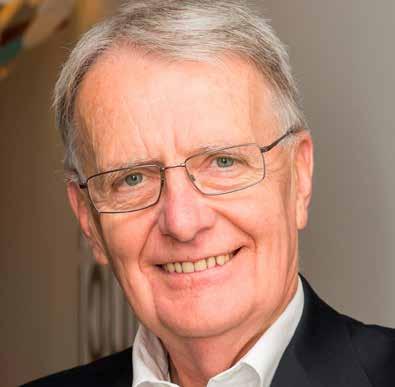
Professor Terence O’Brien is Chair of the Cabrini Research Committee, and Chair of Medicine (Neurology) and Head of the Central Clinical School at Monash University. He is also Program Director for Alfred Brain and Deputy Director of Research at Alfred Health. He was previously the Van Cleef Roet Chair of Neuroscience at Monash University and the James Stewart Chair of Medicine at the Royal Melbourne Hospital and the University of Melbourne. Professor O’Brien is a specialist in neurology and clinical pharmacology, with particular expertise in epilepsy and neurodegenerative diseases. He leads a large translational research team undertaking work in both basic and clinical research, focused on developing improved treatments for people with epilepsy and related brain diseases. Through his research, he has received 18 awards from national and international scientific bodies, including the Ambassador for Epilepsy Award from the International League Against Epilepsy, the Dreifuss-Penry Epilepsy Award from the American Academy of Neurology, and the James Lance Oration and Award, the highest honour of the Australian and New Zealand Association of Neurologists. Professor O’Brien serves on a number of professional societies including as President of the Epilepsy Society of Australia and in 2016 was elected Fellow of the Australian Academy of Health and Medical Sciences.
Professor Warwick Anderson AO is Emeritus Professor, Monash University. After completing postdoctoral training at Harvard Medical School, the University of Sydney, and the Baker Heart and Diabetes Institute, he was Head of the School of Biomedical Sciences and Professor of Physiology at Monash University. His research examined the renal causes of high blood pressure. From 1997 to 2003, Professor Anderson chaired the National Health and Medical Research Council’s (NHMRC) Research Committee and was the inaugural CEO of the newly independent NHMRC from 2006 to 2015. During his tenure, he implemented sweeping changes to the research review and funding process, expanded NHMRC’s global reach, and introduced a number of Indigenous health research programs. He served as the Secretary General of the International Human Frontier Science Program Organisation from 2015 until 2021. He has been a member of numerous international and national scientific bodies, including the Prime Minister’s Science Engineering and Innovation Council and currently chairs the Global Biodata Coalition. In 2023, Professor Anderson was made an Officer of the Order of Australia for his distinguished service to health and medical research organisations, and professional associations.
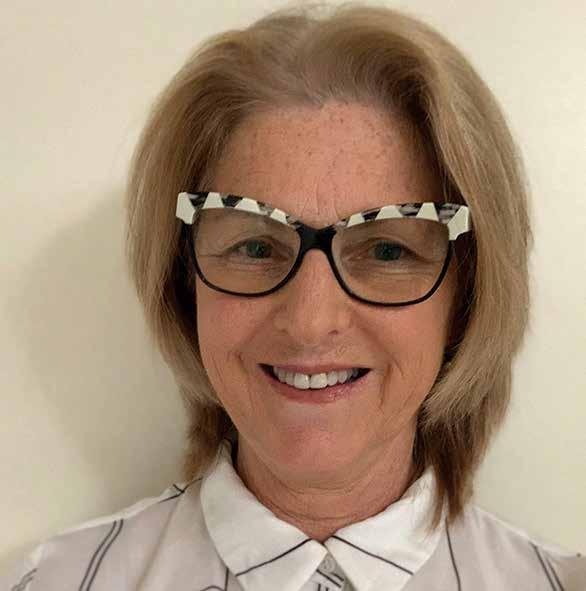

Associate Professor Caroline Brand is a consultant rheumatologist and holds appointments with the Department of Epidemiology and Preventive Medicine at Monash University and the Faculty of Medicine, Dentistry, and Health Sciences at the University of Melbourne. Throughout her career, she has had extensive inpatient and outpatient experience across both public and private healthcare sectors. Her work has focused upon the design, implementation, and evaluation of new models of care for patients with chronic conditions. More broadly, she has actively contributed towards quality and safety improvements in a number of healthcare settings across Australia. She was previously Director of the Clinical Epidemiology and Health Services Evaluation Unit, the predecessor to Melbourne EpiCentre, between 2004 and 2010. Associate Professor Brand has contributed to a number of professional organisations and government committees including as president of the Victorian Branch of the Australian Rheumatology Association, the Cabrini Patient Experience and Clinical Governance Committee, and as Chair of the Cabrini Research Committee.
Professor Sally Green is the Co-Director of Cochrane Australia and Deputy Head (Research) of the School of Public Health and Preventive Medicine at Monash University. Upon completing clinical qualifications in physiotherapy and doctoral studies in epidemiology and preventive medicine, she has conducted over 60 competitively funded research projects across a diverse portfolio that includes Indigenous health, behavioural determinants of disease, and health systems management. Throughout much of her work, Professor Green investigates effective and efficient translational pathways that take research outcomes through to sustained changes in clinical practice and policy. This is underpinned by her commitment towards improved health outcomes through research.
Professor Green is a member of the National Health and Medical Research Council, Synthesis and Translation of Research Evidence Advisory Group, and Cochrane’s International Governing Board, while also an active Cochrane reviewer.

Joseph
MCChB MSc PhD FRACS
Dr Joseph Kong is a consultant colorectal surgeon at Cabrini Hospital, the Alfred Hospital, and the Peter MacCallum Cancer Centre (Peter Mac). He is a Senior Research Fellow at Monash University and Head of the Colorectal Cancer Immunology Laboratory at the Burnet Institute. His research seeks to translate molecular discoveries, and integrate machine learning and robotics to enhance clinical applications for gastroenterological cancer. Completing surgical training at St. Vincent’s Hospital Melbourne, Dr Kong conducted doctoral research in colorectal cancer immunology at Peter Mac before completing postdoctoral fellowships at Princess Alexandra Hospital, the Alfred Hospital, and MD Anderson Cancer Center, where he received training in robotics for complex colorectal cancer surgery. Alongside his clinical and research responsibilities, Dr Kong continues an active academic role in education, training, and quality assurance in benign and malignant colorectal conditions.
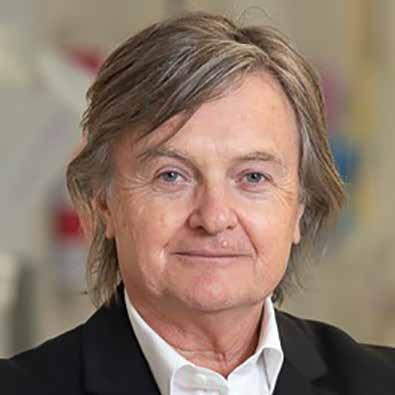
Professor Eric Morand
MD PhD FRACP FAHMS
Professor Eric Morand is Dean of the SubFaculty of Clinical and Molecular Medicine within the Faculty of Medicine, Nursing, and Health Sciences at Monash University, and Director of Rheumatology at Monash Health. His translational research focuses on glucocorticoid-induced proteins in the immune system, describing their expression and function in rheumatoid arthritis and lupus. Through the commercialisation of this work, he has co-founded three venturefunded companies and several major licencing agreements. Professor Morand also conducts clinical research in systemic lupus erythematosus (SLE), establishing the Lupus Clinic at Monash Health, and the Asia Pacific Lupus Collaboration, globally the largest prospective cohort to be assembled. He has also led an international therapeutic trial for SLE (TUKIP 2), which resulted in the multi-jurisdictional approval of anifrolumab and landmark confirmation of the interferon hypothesis for the pathogenesis of lupus in humans. Professor Morand has received several awards, including the William E. Paul Distinguished Innovator Award and Global Team Science Award from the Lupus Research Alliance; the Evelyn V. Hess Award from the Lupus Foundation of America; the Victoria Prize for Science and Innovation; and the Parr Prize from the Australian Rheumatology Association. In 2022, he was elected as a Fellow of the Australian Academy of Health and Medical Sciences.

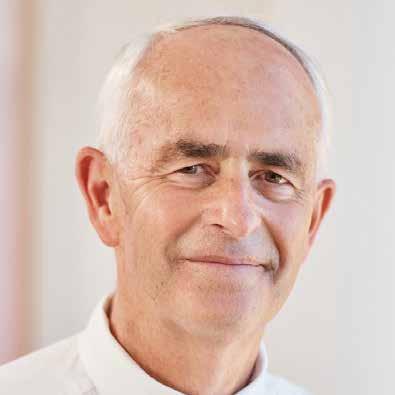
Professor Gary Richardson OAM is Group Director of Cabrini Research and the Neil Beauglehall Endowed Chair in Medical Oncology Research. After completing medical studies at Monash University, he held fellowships with St. Vincent’s Hospital Melbourne, the Peter MacCallum Cancer Centre, and the National Cancer Institute in the United States of America. Returning to Australia, he established the Monash Oncology Research Institute at Monash Medical Centre, and programs in haematology and oncology research at Cabrini Health. Professor Richardson has been Principal Investigator for over 300 clinical trials, several of which have resulted in the regulatory approval of targeted therapies and immunotherapies. His preclinical research has led to the identification of novel predictive biomarkers for breast, lung, and gynaecologic cancers, with ongoing research investigating their tumour microenvironment and immune landscape. Professor Richardson also holds several leadership roles, including with Monash Partners, and was previously President of the Medical Oncology Group of Australia, Chairman of Foundation 49, and advisory board member for the National Male Health Policy and the Victorian Men’s Health and Wellbeing Strategy. In 2017, he was awarded the Medal of the Order of Australia for services to medical oncology.
Mr Bob Santamaria has more than 40 years experience across a diverse portfolio that includes a number of landmark transactions that shaped corporate Australia. He retired as ANZ Group General Counsel in 2019, after 12 years in that role. During this time, he oversaw all major litigation for ANZ and led its response to the Banking Royal Commission. Prior to ANZ, he was a partner at Allens Arthur Robinson for 20 years, specialising in mergers and acquisitions, and corporate reconstructions, and was the Executive Partner for the firm’s Corporate Department. Since retirement, Mr Santamaria has actively contributed to the community, joining the Cabrini Research Committee upon its formation after having joined the Board of Cabrini Australia in 2020. In addition to these roles, he serves on the board of Villa Maria Catholic Homes, which delivers aged care services and support for disability and homeless communities, and the Orygen Youth Mental Health Foundation.
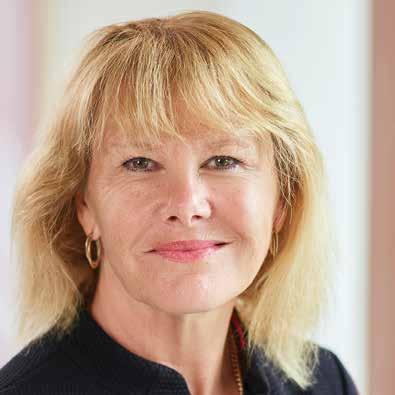

Ms Sue Williams was appointed Chief Executive of Cabrini Health in 2019, transitioning from her previous role as Chief of Health Operations. She has over 25 years’ experience in the healthcare industry at the senior management level in both public and private sectors. She has held various roles including as Director of Nursing at the Royal Melbourne Hospital, Chief Operating Officer of Hospitals at Healthscope, and Group General Manager at Spotless Group. Prior to joining Cabrini, she served as Chief Executive Officer for Peninsula Health, where she oversaw the delivery of mental health and community services to a patient population of over 300,000 people. Clinically trained as a nurse, Ms Williams has received postgraduate qualifications in business management, from Monash University, Harvard Business School, and the Australian Institute of Company Directors. Underpinning her numerous executive achievements is a commitment to patientcentric care, resonating across the Cabrini Health network.
Mr Kee Wong is the founder of e-Centric Innovations – a technology consulting firm that operates in Australia, Malaysia, and Singapore, serving large multinational enterprises and governments. He invests in a broad portfolio of industries that include technology, retail, property, professional services, and food and beverage industries in Australia and abroad. He also plays an active role in supporting socially impactful start-ups. Mr Wong is currently a board member for ASX100 listed companies Carsales.com and Invocare. He also holds numerous directorships including the Walter and Eliza Hall Institute of Medical Research, the Arts Centre Melbourne, the Victorian Government Investment Fund, and the Australian Institute of Company Directors, only a few of the organisations he serves. Amidst these commitments, Mr Wong is also Adjunct Professor of Computer Science and Information Technology at La Trobe University.
Throughout the year, the Scientific Advisory Committee (SAC) has seen a number of notable achievements from Cabrini researchers who continue to progress clinically meaningful outcomes through their work.
These cover multiple domains spanning basic, translational, and clinical research. Reflecting the breadth of research conducted at Cabrini, this diversity has necessitated growth across Research Operations. 2023-24 has demonstrated the critical importance of synergies between scientific, clinical, and professional teams, playing a vital role in producing research outputs that are not only impactful, but also responsive to the evolving medical research sector in Australia.
Over the previous 12 months, the SAC was updated on key developments in cancer research, particularly the integration of precision medicine into clinical practice. This has included plans for the Monash Academic Department for Cancer Medicine, which will draw upon the respective strengths of Monash University, Alfred Health, and Cabrini to serve patients throughout Melbourne’s south-east corridor. Anticipated for the middle of 2025, the newly formed department will grow capacity in translational oncology and provide a robust platform for multidisciplinary clinical research.
The Cabrini-Monash-Alfred partnership will be further strengthened by the development of a precision oncology program. Providing genomic profiling to cancer patients, the program will be integrated with clinical trials conducted through the Cabrini Cancer Institute, while also conducting research in cancer genomics. This ambitious initiative is supported by a catalytic investment from the PMF Foundation, which will go towards recruitment for an endowed chair and the establishment of world-class laboratory facilities.
Programs in translational research have also reached significant milestones through collaborations between the Monash Biomedicine Discovery Institute (BDI) and Cabrini Research departments in medical oncology, surgery, and urology. The organoid program is recognised throughout Australia, encompassing 300 colorectal and 150 breast cancer organoids, with a collection of ovarian cancer organoids expected in 2025. Discussions continue regarding the commercialisation of these organoids, which would allow their application for companion diagnostics in precision oncology.
The Department of Cardiology Research continues to grow rapidly, with important advances made in nuclear medicine, electrophysiology, and interventional cardiology. While sustained efforts and further resourcing are required, establishing Cabrini as a lead site for cardiac clinical trials will open new opportunities and accelerate the considerable progress already made by department researchers.
Recognising the vital role of nurses in healthcare, Cabrini has sought to build greater capacity in nursing research through the appointment of a Research Fellow. This responds to a workforce survey conducted by the department in 2022, where nurses highlighted limited doctoral funding and protected research time as primary barriers to research participation.
Discussions with the School of Nursing and Midwifery at Monash University have been productive, with joint appointment and cosupervision opportunities currently under consideration.
The SAC has also been involved in ongoing efforts to broaden the research portfolio to include orthopaedics, with Professor Karen Walker-Bone and Professor Trisha Peel providing critical insights to the Committee. Plans to allocate dedicated orthopaedic wards and theatres at Cabrini Malvern present an opportunity to enhance the delivery of musculoskeletal services through research, which will benefit a significant and growing number of patients.
2023-24 also saw Cabrini Research continue to strengthen its research governance structures in response to the National Clinical Trials Governance Framework (NCTGF). The SAC were consulted on navigating the challenges of adverse event reporting and low-risk study interpretation, which will prove critical in meeting requirements for accreditation as a clinical trials provider under the NCTGF.
The Committee also reviewed the formalisation of academic promotion policies, designed to facilitate career advancement for researchers at Cabrini. With this streamlined process in place, Professor Nathan Better and Professor David Brewster secured Level E promotions, with Associate Professor Eva Zopf promoted to Level D, representing milestones both at an individual and institutional level.
Cabrini Research has also seen a marked improvement in the number and success of its external grant submissions over the past 12 months. Sustaining this will be an important priority for Research Operations as they continue to identify areas for improvement in the support they provide to researchers. This extends to philanthropy which continues to be a vital source of funding, with Cabrini and Monash co-developing new donor strategies to not only increase contributions but also maximise their impact.
The implementation of electronic patient consent forms continues to be explored and is expected to streamline processes and ensure regulatory compliance when implemented. The reconstitution of the Data Governance Committee has allowed greater oversight of database and registry activities, promoting robust data management and security practices. These complementary initiatives will strengthen research infrastructure at Cabrini, maintaining the integrity and quality of research, as well as fostering trust with patients and stakeholders.
Partnerships remain a cornerstone of our research strategy and are facilitated by SAC members who represent organisations that make up Cabrini Research’s core collaborative network. This includes the Monash Partners Comprehensive Cancer Consortium, which has been instrumental in advancing precision medicine, specifically the establishment of the Molecular Tumour Board by consortium fellows.
The SAC was also presented with the opportunity to formally incorporate cardiology research at Cabrini into the academic structures of Alfred Health, the Baker Heart and Diabetes Institute, and the Monash Cardiology Centre. Such integration would enhance resource sharing, collaborative research, and educational opportunities, ultimately benefiting patients and the broader community. Exploratory investigations were made into a partnership with the Hudson Institute for the generation of spheroids – less sophisticated but more scalable preclinical cancer models that may provide significant value in certain clinical settings.

As we develop our next five-year research strategy, Cabrini Research will focus on expanding its clinical research, furthering collaboration and integration with partners, and translating scientific discovery into models of precision medicine. The future offers significant opportunities, and the SAC is committed to providing the guidance and support necessary to realise these ambitions.
I would like to extend my thanks to all members of the SAC for their contributions throughout the year. The Committee recognises the efforts of Professor Gary Richardson in leading Cabrini Research as Group Director, alongside the scientists, clinicians, support professionals, and consumers whose dedication has led to the institution’s success.
Professor Stephen Jane Chair, Scientific Advisory Committee
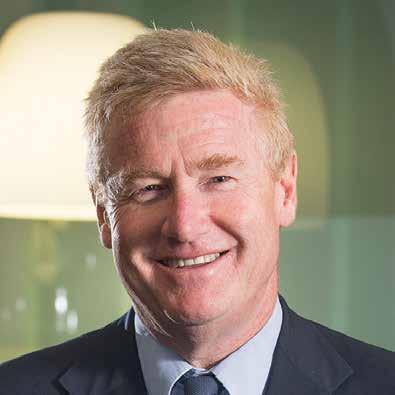
Professor Stephen Jane is Chair of the Scientific Advisory Committee for Cabrini Research and Director of Research at Alfred Health. He also holds a number of roles with Monash University including Foundation Dean for the Sub-Faculty of Translational Medicine and Public Health, Head of the Epidermal Development Laboratory, Co-Head of the Red Cell Research Group within the Division of Blood Cancers and was previously Head of the Central Clinical School. His broad research interests include both developmental and acquired disorders of the blood and skin in mouse models. Upon completing his medical studies at Monash, he underwent training in both clinical and laboratory haematology at the Alfred Hospital before completing doctoral research under Professor Hatem Salem, Director of the Australian Centre for Blood Diseases. He then went to the United States, firstly as a postdoctoral fellow at the National Institute of Health and then as a member of faculty at St. Jude Children’s Research Hospital. He returned to Australia in 1995 as a Wellcome Senior Research Fellow at the Bone Marrow Research Laboratories across the University of Melbourne and Royal Melbourne Hospital. He became its Director in 2000, a Principal Research Fellow of the NHMRC in 2005, and a Professor of Medicine at the University of Melbourne in 2006. In 2011, he assumed his current roles with Monash University, including as member of Alfred Health’s Clinical Haematology Service. Under his leadership, the school saw a four-fold increase in its competitive grant funding, recruiting over 400 new researchers and 30 laboratory heads.

Professor Chris Bain is Professor of Practice in Digital Health at the Faculty of Information Technology, Monash University. An experienced clinician and health information management and technology (IMT) practitioner, he has diverse exposure to broad aspects of the healthcare system in Australia. His research focuses upon the design, implementation, and management of operational IMT functions in healthcare organisations, across a broad range of data and technology-driven applications. With 12 years’ experience as a medical practitioner and 15 years in health IMT, he is one of few health informaticians in Australia with both extensive clinical and technological experience. Professor Bain has previously held leadership positions in the Australasian Institute of Digital Health and actively participates in jurisdictional committees on topics around digital health. In 2017, he was appointed by Monash University as its inaugural Professor of Practice in Digital Health and holds several adjunct appointments with the Faculty of Medicine, Nursing and Health Sciences while working with a multi-sectoral network of stakeholders across faculties and institutes at Monash.
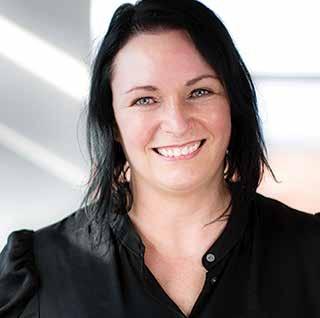
Dr Emma Baker BSc PhD
Dr Emma Baker joined Cabrini in 2015 and is Director of Medical Research at Cabrini Research. She completed degrees in medical and molecular biology before completing her doctoral research at the University of Melbourne and the Peter MacCallum Cancer Centre. She went on to complete postdoctoral fellowships in cancer epigenetics at the Baker Heart and Diabetes Institute and St. Vincent’s Institute of Medical Research. At St. Vincent’s she led independent research in oncology, continuing her work in epigenetics while also focusing on preclinical drug discovery. She has been the recipient of Middows Research, NHMRC Peter Doherty, and Cure Cancer Australia Fellowships. With Cabrini, she played a central role in its organisational restructuring, which led to the establishment of Cabrini Research as an independent body in 2021. She continues to oversee its research activities, in particular, guiding and shaping strategy across all noncancer research departments.

Professor Alex Boussioutas is Director of Gastroenterology and inaugural Director of Clinical Genetics and Genomics at the Alfred Hospital, Program Director for Specialty Medicine at Alfred Health, and Head of Gastrointestinal Risk Management at the Peter MacCallum Cancer Centre (Peter Mac) and Alfred Health. After completing degrees in medicine and science at the University of Melbourne, he completed doctoral research in genomic gastroenterology, for which he was awarded the Sir Peter MacCallum Medal for Scientific Excellence. Professor Boussioutas is dual trained in gastroenterology and general medicine and was formerly Deputy Director of Gastroenterology at the Royal Melbourne Hospital and Head of Gastroenterology at Peter Mac, while also the longest serving Associate Dean for Graduate Research at the Faculty of Medicine, Dentistry, and Health Sciences at the University of Melbourne, until 2021. As Head of the Gastrointestinal Translational Research Laboratory at Monash University and Alfred Health, his multidisciplinary research includes population health and screening, novel technologies for early cancer detection, and genomics-led discovery biology for gastric cancer. He has clinical and research interests in cancer genetics and was the only Australian collaborator for the Cancer Genome Atlas Network in upper gastrointestinal cancer, which led to landmark studies in the characterisation of gastric and oesophageal cancer.
Professor Boussioutas is President of the Gastroenterology Society of Australia and maintains active teaching appointments at Monash University, from the undergraduate level through to doctoral supervision.

Professor Wendy Brown is Head of the Department of Surgery and holds a number of positions at the Alfred Hospital, including Director of the Oesophago-GastricBariatric Unit, Programme Director of Surgical Services, and Chair of the Monash University Department of Surgery, the first woman to be appointed to that role. In addition to these roles, Professor Brown is also the Clinical Director of the Australia and New Zealand Bariatric Surgery Registry and Clinical Lead of the Victorian Upper GI Cancer Registry. Her clinical focus includes bariatric and upper gastrointestinal surgery, including cancer and reflux disease. Her research complements her clinical work, examining the processes and benefits of weight loss and optimised surgical outcomes for patients. Through her interest in registry science, she led the development of the Bi-national Bariatric Surgery Registry and is involved in several translational and clinical research projects, actively collaborating with researchers in basic science. Additionally, Professor Brown serves in a number of leadership roles, including as Chair of the Global Registry Committee and previously as Scientific Chair of the International Federation for the Surgery of Obesity and Metabolic Disorders. She is also the past-President of both the Australia and New Zealand Gastro Oesophageal Surgery Association and the Obesity Surgery Society of Australia and New Zealand. Professor Brown has been a leading voice in shaping healthcare in Australia, serving on several government committees at both Commonwealth and State levels.

Professor Andrew Forbes is Head of the Division of Quantitative Research Methodology in the School of Public Health and Preventive Medicine at Monash University. Upon completing his doctoral degree in statistics from Cornell University, he worked at Ciba-Geigy Pharmaceuticals as a postdoctoral fellow in clinical trial design and analysis. He then joined Monash University in 1992 and continues to head the Biostatistics Unit with research interests in the development of analytical methods for interrupted time series design, the application of causal modelling principles to practical problems, and latent variable methods. Professor Forbes also leads the Biostatistics Collaboration of Australia, a consortium of five universities delivering biostatistical education, and co-leads the Australian Clinical Trials Alliance Statistics Interest Group. In 2020, he was elected as Fellow of the Australian Academy of Health and Medical Sciences for his contributions to the discipline of biostatistics and its applications in clinical and public health research.
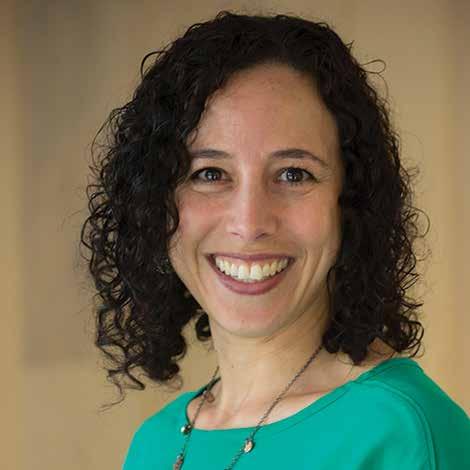


Associate Professor Caroline Gurvich is a clinical neuropsychologist at the Lisa Thurin Women’s Mental Health Centre at Cabrini and the Victoria Clinic. She also serves as Deputy Director of the HER Centre Australia and is Head of the Cognition and Hormones Group at Monash University. Her research investigates hormones and their influence on cognition across various stages of life, along with their interaction with psychological, environmental, and behavioural factors. Additionally, her research combines neuropsychological assessments with eye movement research to clearly characterise cognition. Associate Professor Gurvich is the recipient of an NHMRC Early-Career Fellowship and a Rebecca Cooper Foundation Project Grant, and several awards and prizes for her research in neuropsychology and women’s mental health. She is committed to training the next generation of clinicians and researchers in neuropsychology through doctoral supervision.
Professor Stephen Hall is a clinical rheumatologist at Cabrini, Professor within the Monash Faculty of Medicine, Nursing and Health Sciences, and Founder and Medical Director for Emeritus Research, an independent clinical trials centre in Melbourne. After finishing his medical degree at Monash University, he completed training in rheumatology at the Mayo Clinic. He has led over 250 clinical trials and is committed to the integration of new medical advances into clinical workflows for the purpose of improving patient care and safety. He has previously served as Chair of the Australian Rheumatology Association Education and Training Committee and the Scientific Programme Committee for the Australian Rheumatology Association. Committed to population-scale health care, Professor Hall was the Visiting Speaker at the Infectious Diseases Institute, Makerere University in Uganda where he conducted specialty clinics in one of the largest HIV hospitals in the world, while also working as a consultant rheumatologist for several hospitals throughout Cambodia.
Professor Anne Holland is Head of Respiratory Research at Monash University and Alfred Health, and Professor of Physiotherapy at Monash University. She is currently an NHMRC Leadership Fellow and Chief Investigator for two NHMRC Centres of Research Excellence in Pulmonary Fibrosis and Treatable Traits. Her research investigates supportive non-pharmacological therapies for people with chronic respiratory disease, including pathways for implementation. These have involved a number of clinical trials evaluating new models of pulmonary rehabilitation that address barriers of access in conventional approaches, such as the HomeBase Trial. Professor Holland’s research has informed more than 30 clinical guidelines globally and has led to several awards, including the Society Medal from the Thoracic Society of Australia and New Zealand, and the European Respiratory Society Gold Medal for Allied Health Professionals. Professor Holland currently serves as President of the Thoracic Society of Australia and New Zealand.


Professor David Kaye is Director of the Department of Cardiology and a Senior Cardiologist in the Advanced Heart Failure and Transplant Service at the Alfred Hospital. He is also Head of the Heart Failure Research Group at the Baker Heart and Diabetes Institute and appointed the inaugural Director for the Monash Alfred Baker Centre for Cardiovascular Research. His research examines the pathophysiology of heart failure, focusing on the identification of novel mechanisms that can be targeted for therapeutic intervention. Professor Kaye has extensive experience in translational research and commercialisation, with his work going on to form three early- to mid-stage medical device companies, one of which includes ASX-listed Osprey Medical. All are clinically active and are supported by 13 US patents. Professor Kaye is also the recipient of the Eric Susman and RT Hall Prizes for research excellence from the College of Physicians and Cardiac Society respectively, and was awarded the 2012 Eureka Prize for Medical Research Translation. In 2015 he was elected Fellow of the Australian Academy of Health and Medical Sciences.
Professor Julia Morphet is Head of the School of Nursing and Midwifery at Monash University. She is an experienced emergency nurse with more than 15 years of clinical experience. Transitioning to academia to deliver a postgraduate emergency nursing program, she has since gone on to become a leading researcher in healthcare workforce participation and training, exploring their impact on patient outcomes. Professor Morphet has held several senior leadership roles in nursing, including Director of Education and Deputy Head of School at Monash University, and currently serves as National President for the College of Emergency Nursing Australasia. She plays an important role in shaping Australian healthcare policy, promoting safe quality care for patients and clinicians through several committees and working groups for both the Commonwealth and Victorian Governments. In 2021, Professor Morphet received the Julie Finucane OAM Medal for Leadership in Emergency Nursing, the highest honour of the College of Emergency Nursing Australasia.


Professor Mark Shackleton is a Professor of Oncology at Monash University and Clinical Research Fellow for the Victorian Cancer Agency. He also serves as Director of Oncology at Alfred Health, Chair of Melanoma and Skin Cancer Trials, and Co-Director of the Monash Partners Comprehensive Cancer Consortium. After training in medical oncology, and at the Ludwig Institute in Melbourne, he undertook doctoral studies at the Walter and Eliza Hall Institute of Medical Research and completed postdoctoral training at the University of Michigan. His clinical interests centre on skin cancer, with his research focusing on cancer biology, developmental biology, oncogenic signalling pathways, and clinical trials. Professor Shackleton has received several major prizes for his research including the Victorian Premier’s Award for Medical Research, a NHMRC Achievement Award, a Pfizer Australia Fellowship, and a Victorian Cancer Agency Clinical Research Fellowship. In 2012, he was awarded the Australian Science Minister’s Prize for Life Scientist of the Year.
Professor Karen Walker-Bone is Director of the Monash Centre for Occupational and Environmental Health and Professor of Planetary Health at the School of Public Health and Preventive Medicine at Monash University. Also a clinically qualified rheumatologist, her research focuses on musculoskeletal health in the workplace with broader interests in workplace physical and mental health promotion, particularly with relation to both women and older workers. Before joining Monash University in December 2022, Professor Walker-Bone was Director of the Medical Research Council Versus Arthritis Centre for Musculoskeletal Health and Work in the United Kingdom. She continues to hold an honorary appointment in occupational rheumatology at the University of Southampton. Professor Walker-Bone was the recipient of the Arthritis Research UK fellowship and is a Fellow of the Royal College of Medicine.
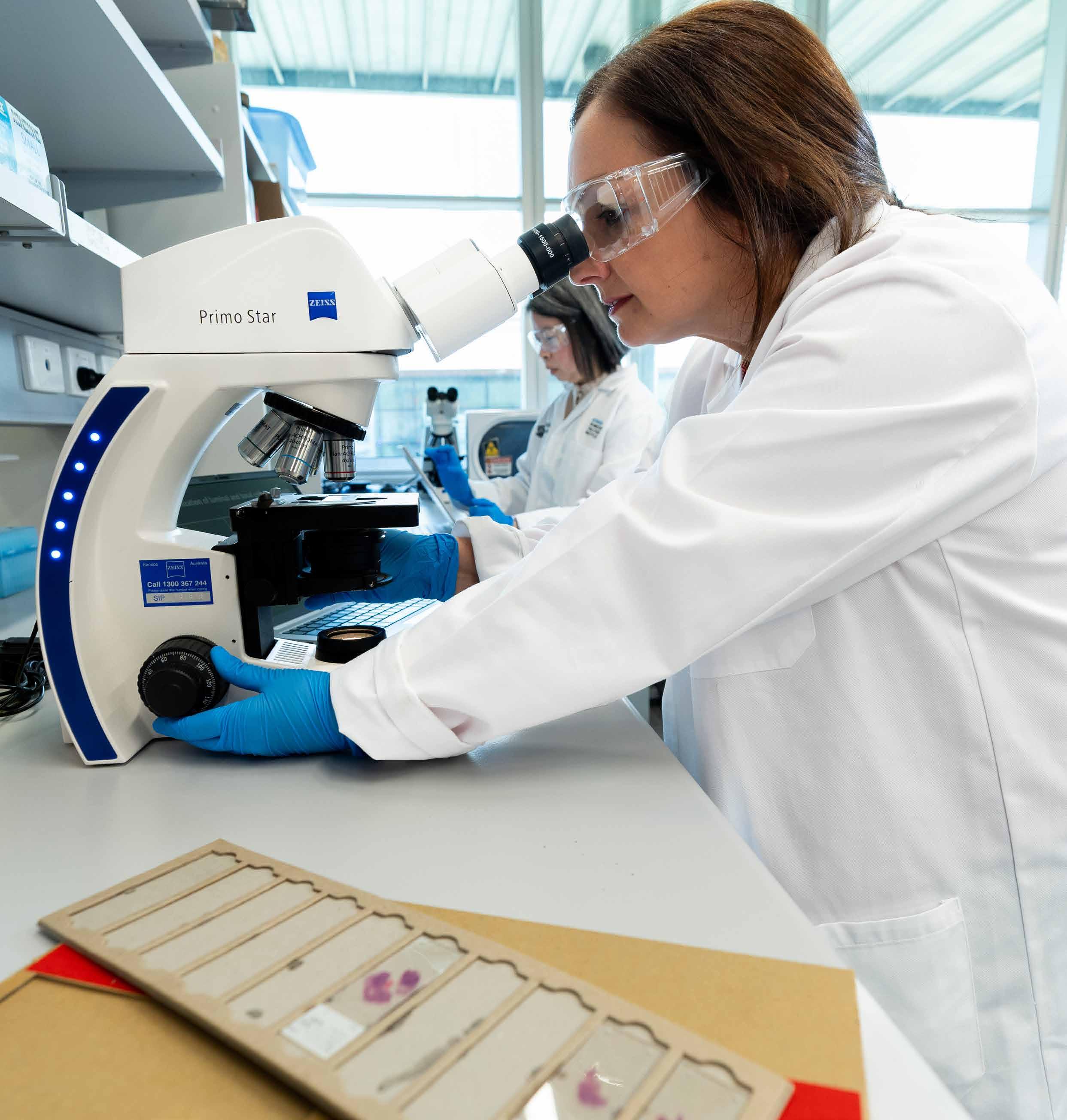
The Cabrini Research Consumer and Community Involvement Committee (CRC&CIC) had another productive year in guiding research at Cabrini.
The diversity of perspectives represented has enriched discussions across the broad spectrum of research areas in which consumers play an important role at Cabrini Research. The CRC&CIC also welcomed Professor Paul McMurrick as incoming Chair during its May meeting, thanking Professor Gary Richardson for his leadership since establishing the group.
Continuing from last year, the National Clinical Trials Governance Framework (NCTGF) remained a core area of focus, with workshops and targeted consultation conducted to enhance consumer involvement in clinical trials. This included the validation of a survey tool from Rockefeller University, introduced to better capture participant experiences, and the co-development of a virtual tour, designed to inform clinical trial participants of the resources and services available to them while receiving care.
The virtual patient tour video was co-developed with consumers. This still frame from the virtual tour shows a new clinical trial participant being met at Cabrini Malvern and directed to the Cabrini Cancer Institute.
Another key outcome has been the Committee’s review of guidelines for consumer-partnered research, a growing priority in Australian medical research and a requirement of all projects conducted at Cabrini. Recommendations for clearer and more accessible resources have since been actioned by the Cabrini Research Governance Office through revised protocols and policies that will be made available online this year. Additionally, the Committee endorsed the Cabrini Research First Nations Inclusion Action Plan, and will work with Monash Partners to identify opportunities for greater inclusion and cultural appropriateness across all research activities.
Perhaps the most impactful achievement made by the Committee was in establishing feedback channels, not only for consumers but also researchers, allowing them to integrate these views into the experimental design of their projects and their subsequent adjustments. Participation from professional support staff has been integral to this, ensuring effective dissemination to relevant stakeholders to create a streamlined and consolidated mechanism for patient-centred research.
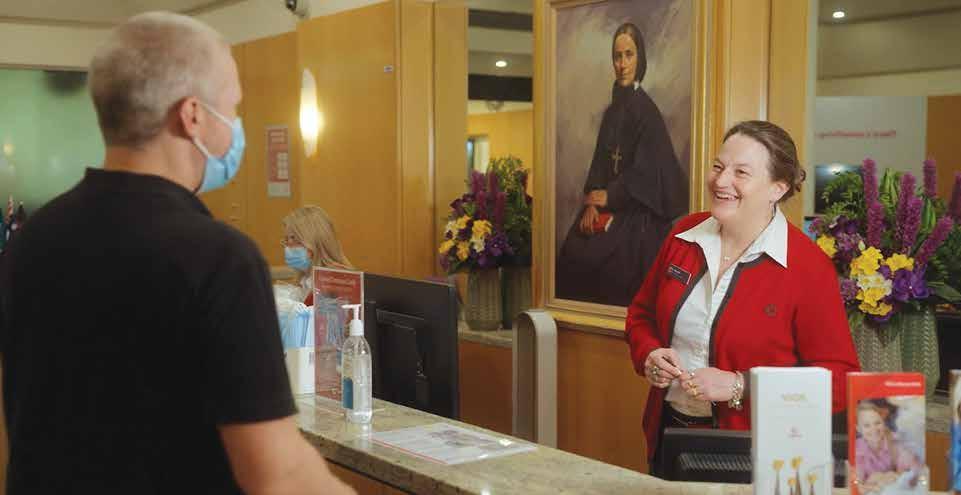
Members of the CRC&CIC and Cabrini Research Governance Committee (CRGC) come together and provide critical insights that guide research efforts across Cabrini. Forming an integral governance structure, they ensure alignment between our work and the needs and preferences of patients, caregivers, and the wider Cabrini community. This year we profile three committee members who have dedicated their time and expertise to help realise our mission to conduct patient-focused research at Cabrini.
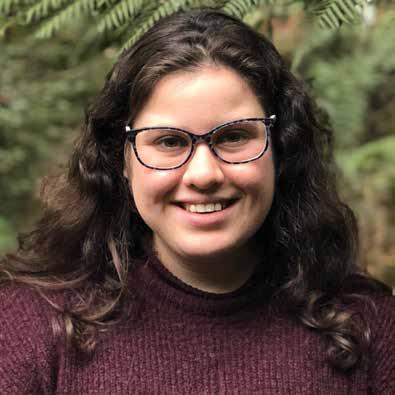
Dr Danielle Berkovic brings a dual perspective to the CRGC, both as a consumer representative and an earlycareer researcher with the School of Public Health and Preventive Medicine at Monash University. Her unique perspective as a consumer-led researcher is shaped not only by her own lived experience but also those of others who manage the burden of chronic arthritis every day.
“Medical research informs clinicians and other healthcare professionals on how to best treat their patients” she explains, adding how it can also identify ineffective, inefficient, or even harmful practices.
“Consumers are involved in research at Cabrini in a number of ways… and are responsible for advocating the consumer perspective, and for prospective and current research participants.”
Dr Berkovic emphasises that consumer contributions have shifted research priorities at Cabrini to align more closely with patient needs, enhancing their experience and outcomes following care. This impact goes further however, “aiding researchers and clinicians with their work knowing that they are directly addressing the concerns of people who are affected by the topic at hand.”
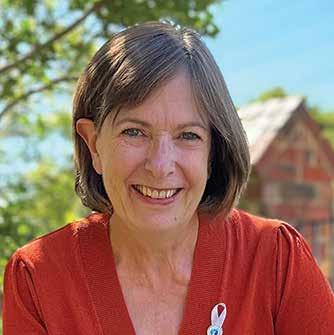
Ms Tanya Pejnovic has an extensive professional background as an allied health specialist, alongside personal experiences as a clinical trial participant. These experiences have inspired her dedication to consumer advocacy in research, having witnessed firsthand the transformative impact of medical advancements, such as life-changing treatments for macular degeneration.
When the opportunity to join the CRC&CIC arose, Ms Pejnovic did not hesitate. “Having benefited myself from medical advances it is personally satisfying to circle back and contribute to the development of future treatments for others.” This was also driven by her understanding of the vital role consumer advocates can play across all research stages, “from inception through to completion.”
Ms Pejnovic has furthered her engagement and currently serves as a member of the CRGC, collaborating with researchers, support professionals, and other advocates. Here, she has seen a unique responsiveness to the lived experiences of both patients and carers at Cabrini, noting “our voice is important in many of the decisions made… together, we are helping to shape the future of research at Cabrini.”

After decades serving as King’s Counsel, Dr David Denton began exploring how he could further contribute to the community in meaningful and lasting ways. It was then that he was asked whether he would be willing to assist the CRGC, drawing on his expertise as a legal professional and experiences as a former patient at Cabrini.
Since joining the Committee, Dr Denton has observed the meticulous preparation involved in each meeting and “the level of objective professionalism exercised by the CRGC [that] is second to none.” Moreover, he sees its enormous value in considering proposed projects and how they could impact the lives of patients, not only in terms of clinical outcomes but also in promoting genuine engagement and empowering patients with knowledge.
Through these interactions, Dr Denton recognises that “consumer representatives are not merely a necessary evil inflicted on a committee but responsible reasonable bystanders.” He has also come to appreciate the end-to-end model of care that research helps enable. “Research is of the essence of any significant medical institution in our nation [and] I am always left astonished at the amount of research undertaken at Cabrini.”
Associate Professor Melita Kenealy is a leading haematologist, widely recognised throughout the Cabrini community for her leadership as Head of Cancer Services and Director of the Blood Unit. Alongside her clinical responsibilities, she conducts research in epigenetics and myelodysplastic syndromes (MDS) – a group of rare haematological cancers that cause abnormal blood cell production in bone marrow. Additionally, Associate Professor Kenealy serves as Principal Investigator for several clinical trials in haematology, with three of her participants willing to share their experiences for this year’s annual report.
Ten years ago, Mr George Genovezos received a diagnosis of chronic lymphocytic leukaemia (CLL) from his general practitioner, who referred him to Associate Professor Kenealy at Cabrini where he was advised that, “there was no cure or medication for my condition.” Over the following years, his lymphocyte count rose rapidly and by 2023, he was experiencing severe fatigue, night sweats, stress, and weight loss.
In November of that year, Mr Genovezos saw a news report describing a successful clinical trial being conducted for CLL. He mentioned this at his next appointment and Associate Professor Kenealy informed him that she would be leading subsequent trials and that he was eligible to participate. “Of course, I jumped at the opportunity,” Mr Genovezos recalls, having lost his mother to CLL.
Within three months of commencing the clinical trial in January 2024, his symptoms improved and his lymphocyte count stopped rising.

At the three-month mark, his dosage was increased, reversing his lymphocyte count and “my fatigue was beginning to disappear. I started to feel really energetic and was sleeping well, not waking to a pool of sweat.”
Six months into the trial, Mr Genovezos feels “like a new person”, experiencing significantly diminished symptoms and no adverse side effects. With five months remaining, he hopes to ultimately hear that his condition is no longer an issue. “I am deeply grateful to Melita and her team for their unwavering support of me. They patiently explained each step of my clinical trial journey, making sure that I understood everything before experiencing the process that I was to go through.”
After being diagnosed with CLL, Ms Sophie Hill chose Cabrini upon the recommendation of her general practitioner, where she was assured that she would receive the best possible care. This was confirmed upon meeting Associate Professor Kenealy, who “has been a highly knowledgeable and empathetic haematologist.” During a routine appointment, Ms Hill was informed that her blood results indicated it was time to begin treatment and that there was a clinical trial suitable for her CLL.

Eager to improve her condition and contribute to medical research, Sophie welcomed the opportunity to participate. “I welcomed the opportunity to take part in the trial, in the hope that my condition would improve,” reflected Ms Hill, “[and] I was also keen to play a part in supporting research and development of treatment options for other CLL patients.”
An initial adverse reaction to obinutuzumab required her to be admitted to hospital for one week. However, she felt reassured having been told that potential side effects were manageable and that she had the option to cease treatment at any time. Throughout each step of the trial, Ms Hill felt exceptionally supported by the entire Cabrini team, including her study coordinator, Demis Balamatsias.
Now in remission, she describes the outcome as being “brilliant… I feel very fortunate to have had the opportunity to participate, when so many people around the world don’t have access to good and affordable healthcare. It’s my understanding that advances are happening steadily in the blood cancer sphere, and I am pleased to have played a part in the improvement and development of treatment options for CLL.”
For Mr Paul Mercer, Cabrini was a natural choice for care, given it was home to both his treatment team and a promising phase III clinical trial investigating a new protocol that combined different therapies for CLL. When his haematologist flagged the trial as an option, Mr Mercer was eager to participate and make a difference, well aware that, “a tablet-only treatment protocol has been a goal of the community for some time.”
Since enrolling in the trial, Mr Mercer’s experience has been overwhelmingly positive, confirming Cabrini’s reputation for professionalism and excellence. “I cannot thank enough the staff at Cabrini who supported me during my treatment” he notes, adding how “I received nothing but the best of care from my doctor, nurses, and the trials team,” in particular Demis Balamatsias, his study coordinator.
Demis Balamatsias (left) played a critical role as study coordinator during Paul Mercer’s (right) participation in a phase III clinical trial.
Reflecting on his participation, Mr Mercer expressed gratitude for having been able to access and contribute towards improved treatment modalities for CLL.
“I feel lucky to have been given the opportunity… I have a few months to go before completing treatment and with the improvements I have experienced, I am looking forward to resuming a more healthy and active life.”
Looking ahead, Mr Mercer remains committed to staying informed about new therapeutic developments for his condition, understanding the critical importance of clinical trials in meeting the needs of future patients. “The active involvement of patients and caregivers can only support this and should be encouraged – the development of more effective treatments with longer remission periods is a vision we can all buy into.”
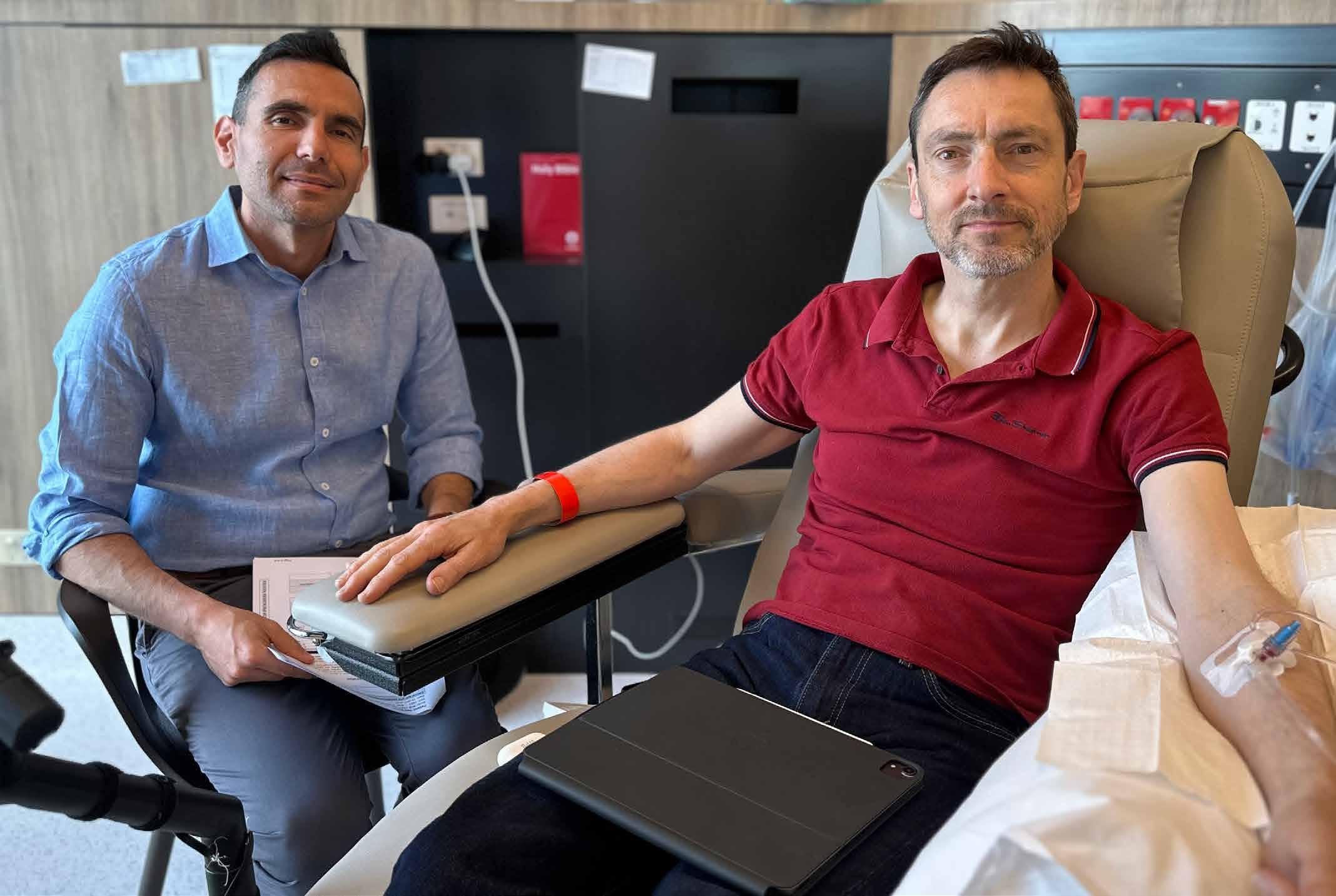
Since the beginnings of medical oncology research at Cabrini in 2001, clinical trials have redefined treatment options for our patients, connecting them to advanced investigational therapies. They have also reflected our deep commitment to continuously improve approaches to cancer, contributing to a global and rapidly evolving translational pipeline. Today, oncology trials remain central to our work and are led by a dedicated and experienced group of principal investigators. Through a shared vision to enhance standards of care for future generations, they have impacted the lives of countless patients ‒ two of whom have shared their experiences as clinical trial participants at Cabrini.
When conventional treatment options were exhausted, Mr Andrew Kregting’s medical oncologist asked whether he would consider participating in a clinical trial. After being referred to Dr Prachi Bhave at Cabrini, he was soon introduced to the promising potential of an investigational therapy, recalling how he was, “quite nervous with regard to possible side effects, but hopeful of receiving promising results.”
After commencing treatment, Mr Kregting soon realised that while the side effects were similar to those of chemotherapy –nausea and fatigue – the benefits were noticeably greater.
“My tumours have reduced in size dramatically, resulting in a remarkable improvement in energy levels, and my constant back pain, which was quite severe, has disappeared.”
Expressing his gratitude for the support received, Mr Kregting highlights the professionalism and care provided by Professor Gary Richardson and his study coordinator, Kate Chandler. “I feel lucky and privileged to have participated in this drug trial at Cabrini,” adding how he “hop[es] this will become available to even more patients with cancers similar to mine,” similarly transforming treatment pathways as it did for him.
Having seen dramatic improvements following investigational therapy, Andrew Kregting hopes more patients will be able to access such treatment through clinical trials.

For as long as she can remember, Cabrini has been an integral part of Ms Wendy Rempel’s life. “Cabrini is the best, my family has been attending Cabrini since my parents’ generation [and it] has saved my life twice – honest truth.” After experiencing the high standards of care delivered at Cabrini, Ms Rempel does not hesitate to make the four-hour journey despite the availability of nearby hospitals.
Introduced to a clinical trial by her medical oncologist, Associate Professor Jeremy Shapiro, “I was nervous, anxious but also excited – my brother-in-law participated in a clinical trial many years ago and it was successful, I believe in clinical research, and I believe that participating will help the future of treatment development.”
Reinforcing her trust in Cabrini, Ms Rempel’s experience in the trial has been overwhelmingly positive. “Everyone is beautiful,” she comments, “the assessments were a bit confronting at the start, but now I’m cruising through it—28 cycles in.”
Since commencing, her quality-of-life has improved dramatically, and is “eternally grateful and cannot thank the study team, the doctors, the hospital enough.”
Passionate about the transformative impact of clinical research, Ms Rempel has become an advocate for greater awareness and access. “Clinical research should be more supported and available at all hospitals nationally, metro and regional. I’m blessed to be with Cabrini.”

Over the next several years, Cabrini will establish a precision oncology program, supported by a $10 million gift from the PMF Foundation. This transformative investment in the future of cancer care will provide expanded access to comprehensive genomic profiling, connecting patients to advanced therapies, including clinical trials.
Despite significant advances in targeted therapies, standard of care continues to rely upon trial-and-error approaches to treatment selection. As a result, primary therapies for cancer
remain the least effective of those available for chronic disease, severely impacting survival and quality-of-life outcomes. Genomic profiling bridges these gaps by identifying key molecular features in tumours to accurately predict which therapies will prove effective for specific patients.
Through the philanthropic vision of the PMF Foundation, Cabrini will partner with Monash University to introduce genomic profiling to south-east Victoria, working with both public and private healthcare providers to ensure equitable access. This will be developed through a newly established precision oncology program, which will aim to deliver this clinical service to over 1000 patients each year, a large proportion of whom will be able to then access clinical trials.
Cabrini Research spoke with Nicola Clyne, Managing Director of the PMF Foundation, to discuss her vision for the program and the Foundation’s broader portfolio of work.
What inspired the Foundation’s decision to make such a significant investment in precision oncology at Cabrini?
This decision differs from our other funding decisions, in that it was a deeply personal one for us. My father, who had mesothelioma, died earlier this year, and his prognosis was greatly improved through his relationship with Cabrini Health, and the work of Professor Gary Richardson in particular.
His gratitude for Gary’s care and fascination with the innovations in precision oncology inspired him to make this commitment to help progress the work in this field. It was clear to us all that this type of precision treatment for cancers is the way forward and will greatly improve the quality and length of cancer patients’ lives post-diagnosis.
What are the Foundation’s values, priorities, and broader purpose, and how would you like the precision oncology program to advance these?
We are broad, rather than prescriptive, in our purpose. We simply want to support organisations to make significant, positive change in whatever field they operate in. We respect the fact that we are not the experts, and our role is to be a background enabler to the work of those who are. The fact is that programs like this require large injections of cash to advance at the rate we need them to, and as that is something we can offer, this will be the catalyst for achieving significant change.
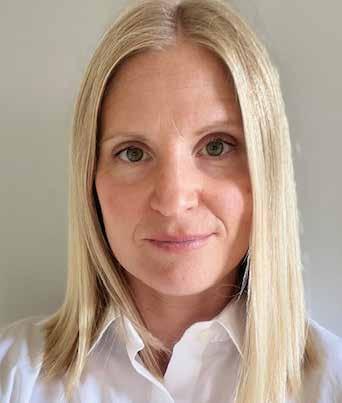

How does the program align with the Foundation’s areas of focus in First Nations communities, the environment, and education?
Honestly, it doesn’t fit into our original focus areas. Medical research, and precision oncology specifically, is something we have only supported in recent years. However, given that they represent the largest donations and longest funding agreements we have ever entered, it is now considered a focus area of the Foundation, along with those original areas of interest.
What role do you think medical research can play in serving the needs of communities?
I think that this type of research and practical application, especially considering the focus Cabrini and Monash are placing on equitable access, will have considerable impact on the lives of those community members suffering with a cancer diagnosis. I’ve observed that in the research phase, especially, these types of pioneering treatments can be expensive to the point of excluding the vast majority of patients, so it is critical that we focus on delivering equitable access.
Transforming supportive cancer care through the power of philanthropy
As part of their long-standing philanthropic commitment to Cabrini, Mrs Lee and Mr Brian Johnstone established the Auric Innovation Grant (Auric) in 2019.
Since then, it has accelerated research pathways through to clinical impact, proving critical in many of the most important research outcomes made at Cabrini.
The Cancer Exercise Laboratory within the Cabrini Cancer Institute is evidence of the transformative impact the Auric has had. Awarded the grant in 2020, the laboratory has since become a world-class site for validating and implementing trials in exercise oncology, positioning Cabrini as a national leader in this emerging field and the delivery of integrative cancer care.
A highlight of the program’s success has been its involvement in the landmark PREFERABLE-EFFECT trial, which assessed the impact of supervised exercise on fatigue and quality-of-life in patients with metastatic breast cancer. Identifying significant improvements in both outcomes, the study provided compelling evidence for the integration of structured exercise into clinical guidelines for breast cancer, while establishing a knowledge base for future implementation across different cancer types.
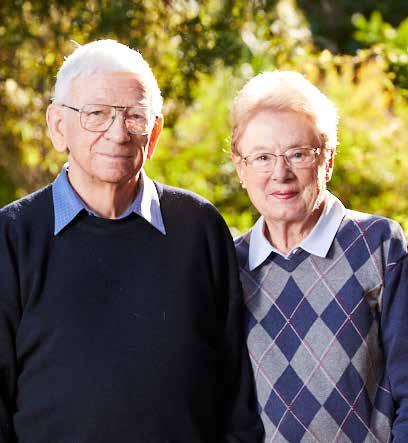
These conclusions were published in Nature Medicine, one of the leading medical journals in the world, reinforcing the rapid growth of exercise oncology over the past decade and Cabrini’s contributions to its advancement. Such milestones underscore the instrumental role of the Auric in progressing clinically meaningful findings at Cabrini and the catalytic effect it has not only on projects but whole disciplines of research.
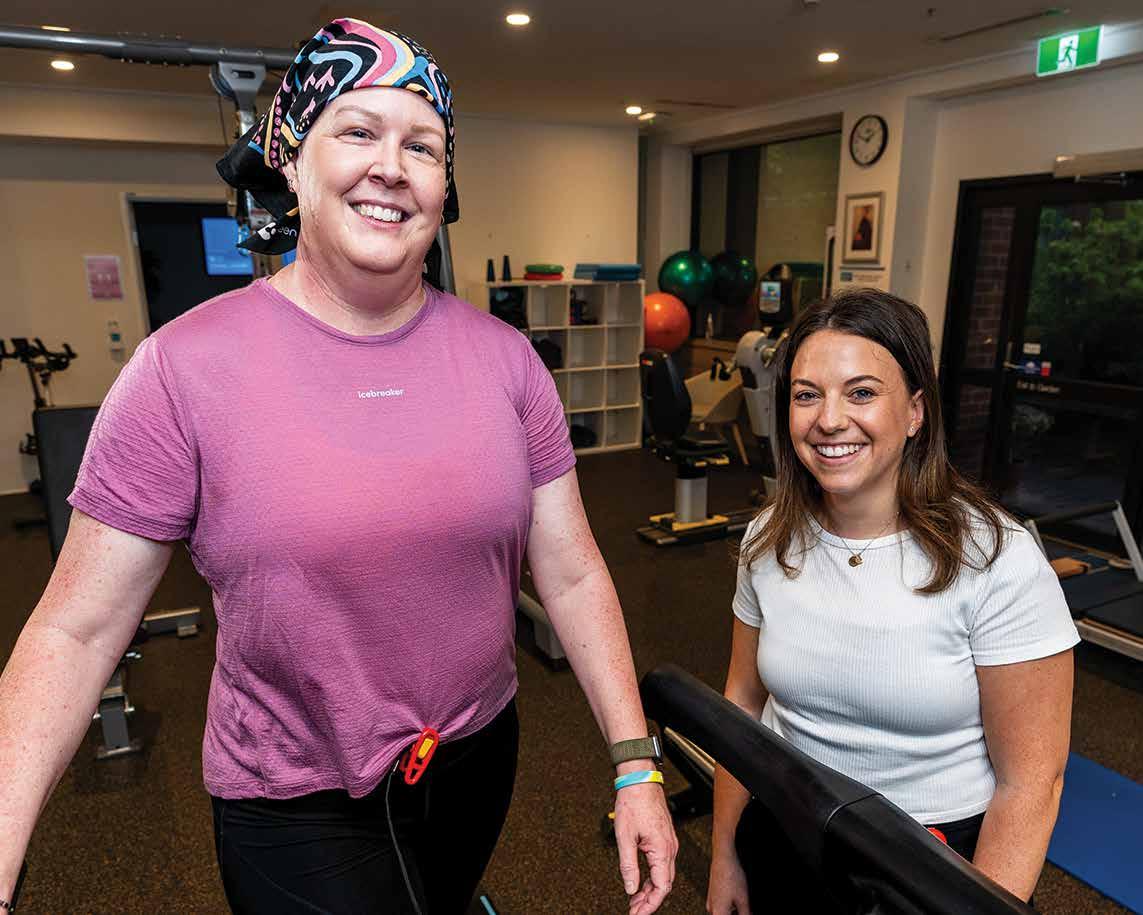
The Auric has accelerated research pathways through to clinical impact, proving critical in many of the most important research outcomes made at Cabrini.
Our work is made possible through the generosity of our community and their contributions in the form of donations and bequests. In overseeing our philanthropic relationships, the Cabrini Foundation has been instrumental in fostering powerful connections between donors and the research they help realise.
It is through this collective effort that our work is able to make an impact on countless lives, while also seeking out solutions for tomorrow’s healthcare challenges. Cabrini Research and the Cabrini Foundation would like to thank all those who supported our work throughout 2023-24.
Alan and Mary-Louise Archibald Foundation
Bamford Family Foundation
Ms Deborah Beale AM and Mr Chris Jackson
Mr Andrew and Mrs Annie Bell
The CASS Foundation
George and Freda Castan and Family
Maureen Coomber
Mr and Mrs Wal Edgar
O’Connor Duffy Foundation
Mr Andrew C Facey
The Fox Family Foundation Pty Ltd
Heidelberg Golf Club
Highland Foundation
Mr Russell Hutchinson
Lee and Brian Johnstone (Auric Innovation Fund)
Johnstone Family Foundation
Mary and Charles Kerstjens
Darren Lockie
Eirene Lucas Foundation
Mr David and Mrs Barbra MacDonald
Peter Marriott
Christine and Denis McConnell
Elizabeth Nixon
Pratt Foundation
M and J Rockman Foundation
Rotary Club of Brighton
Neville and June F M Smith
Rodney and Ann Smorgon Family
Graham and Annette Smorgon
Paul and Rose Spano
G and K Stansen
Mr Douglas Stutt
The Stewardson Charitable Trusts
Margaret Walkom Trust
Edward Wilson Trust
In Memory of Suzanne Young
Neil Beauglehall
Elaine Louise Benger
Nance Nevasa Buchanan
Gary George Conway
Dr Betty Elliott
Harold Francis
Peter Greenham
Hamling Bequest in memory of Fiona Hamling
Peter Richard Hicks
Florence Sheila Johannes
Doreen Johnson
Heather Jones
Douglas Alan Keillor
Irene Kozica
Mary Alice Mann
June Masson
Veronica Choo Neo Png
Paula and Alexander Reinders
Grace Saunders
Leslie Alfred Shapland
The Brian J Sutton Charitable Trust
Hugh Lauder Wallace
The collaborative relationship between Cabrini Research and Monash University has advanced the delivery of patient care across a broad range of conditions.
Founded on a shared belief in the transformative potential of medical research, the partnership has leveraged the unique strengths of each organisation, bringing together both scientific and clinical excellence.
Such synergies have played a critical role in ensuring the translation of Monash research, with Cabrini clinicians ensuring clinical relevance for improved patient outcomes. As Director of the Monash Biomedicine Discovery Institute, Professor John Carroll describes this partnership as “having reached a genuine mutual collaboration where discoveries go to the clinic and the clinical experience is now able to feedback to inform research.”
Organoids have emerged as a particular area of strength for the Cabrini-Monash partnership, with established collections for breast and colorectal cancer expanding to include ovarian cancer over the past year. Able to faithfully replicate tumour structures and behaviours, organoids provide new scientific pathways to better understand cancer biology, while also simulating patient responses to treatments, representing an exciting tool for precision medicine. Today, laboratories led by Professors Helen Abud and Paul McMurrick are working together with the hope that these organoids will lead to improved targeted therapies for colorectal cancer.
While research forms the foundations for the partnership, Professor Terence O’Brien, Head of the School of Translational Medicine at Monash University, Cabrini Australia Board Director, and Chair of the Cabrini Research Committee, also notes that it extends further to include clinical education and training; research governance structures; and shared bioresources, data, and infrastructure. Underpinning these diverse arrangements are “jointly appointed and adjunct clinical academics and researchers in the fields of cancer medicine, surgery, ICU, nursing, psychiatry, and cardiology, who have professorial chairs appointed through the School of Translational Medicine, as well as significant research programs in neurology, stroke, neurosurgery, and haematology.”
In 2023, Professor Christina Mitchell AO, Executive Dean of the Faculty of Medicine, Nursing, and Health Sciences, spoke to these collaborations and the enduring relationship between both organisations. Following is an excerpt from this speech.
‘The partnership between Monash University and Cabrini Health is a testament to the potential of what can happen when visionary institutions unite their strengths. Monash University is a world-class medical research and education provider, while Cabrini Health is committed to exceptional patient care. Together, we’re turning dreams into reality.
This collaboration isn’t just a partnership; it’s a lifeline for patients. It’s the reason why new treatments are discovered faster, why diagnostic tools are more precise, and why medical care is more personalised. The impact of a hospital with robust research and clinical trials programs reaches far beyond its walls. It makes things better… better for patients, better for the healthcare system, and better for future generations.’

Professor Christina Mitchell AO Executive Dean, Faculty of Medicine, Nursing and Health Sciences, Monash University
Cabrini Health has partnered with Omico, a national network that leverages expertise and resources across Australia to accelerate genomic profiling and enhance patient participation in cancer clinical trials.
A key component of this collaboration is Omico’s Cancer Screening Program (CaSP), which provides free comprehensive genomic profiling to eligible patients throughout Australia.
Approximately 20 patients are referred by Cabrini clinicians to CaSP each month, allowing them to benefit from advanced genomic technologies and bioinformatic pipelines for early cancer detection and personalised treatment strategies.
By delivering these benefits, the program represents a key step toward realising the vision of Professor David Thomas, Founder and Chief Science and Strategy Officer of Omico, where “research is an absolutely pivotal part of what should be regarded as standard of care.”
Participation in CaSP also forms a critical component of Cabrini’s broader aim to implement structural improvements to healthcare delivery through research that is not only aligned with but embedded into clinical services. By doing so, the highest possible standards of care can be met as medical advances and innovative technologies are adopted, demonstrating the tangible impact delivered by Cabrini through its comprehensive, end-to-end research hospital model.
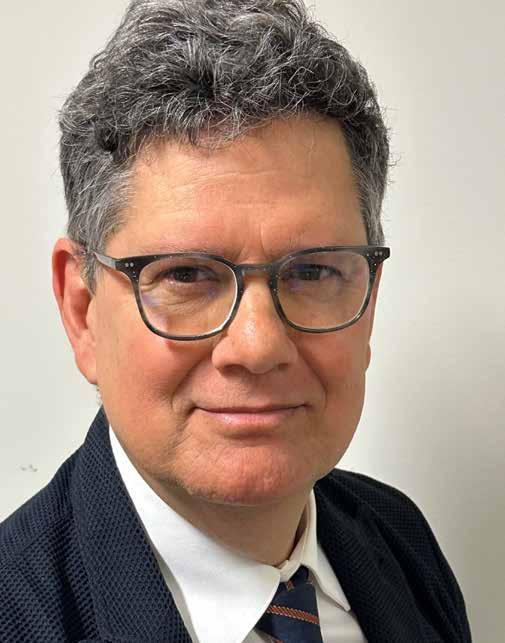
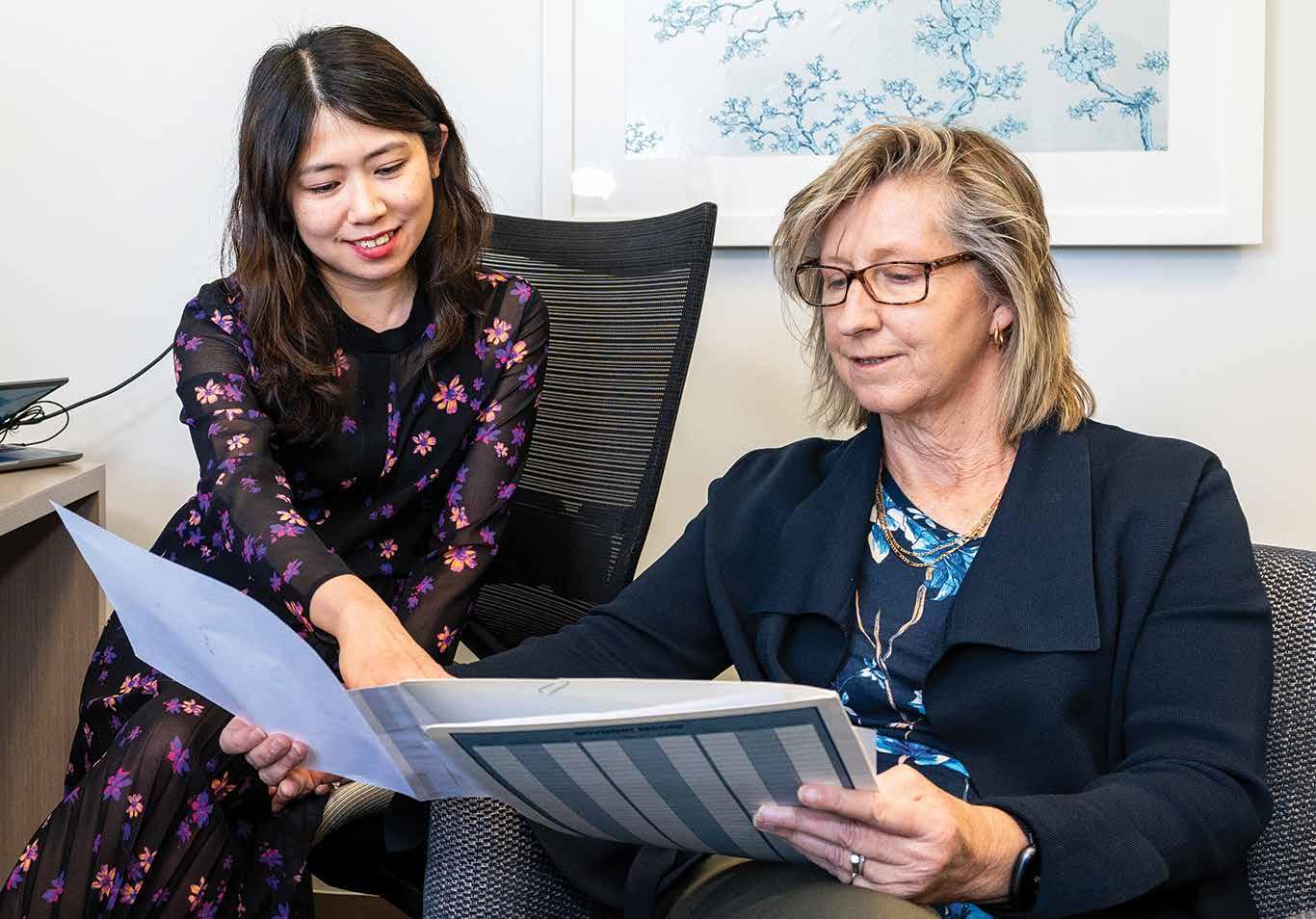
Led by the Prostate Cancer Research Group at the Monash Biomedicine Discovery Institute, the MURAL Collection (MURAL) was established in 2021, forming an extensive library of prostate cancer patientderived xenografts (PDXs).
Generated by implanting human tumour tissue into modified mouse models, these PDXs closely mimic prostate cancer tumours, offering a powerful tool to predict how patients will respond to treatment.
Through Professor Mark Frydenberg AM, the Department of Urology played a leading role in the realisation of MURAL, with all 70 PDXs in the collection derived from samples collected at Cabrini. This was supported by a broader collaborative effort, with hospitals, medical research institutes, and universities across Melbourne coming together to overcome the significant technical challenges involved in generating and sustaining these prostate cancer models.
Today, MURAL stands as a globally significant reference bioresource, complemented by corresponding clinical data and patient samples to support diverse initiatives in prostate cancer research. Amongst these, novel strategies are being explored to mitigate high treatment resistance rates resulting from the structural complexity and adaptive behaviours characteristic of prostate cancer. By doing so, MURAL hopes to create an accelerated pipeline of therapeutic candidates that can effectively target the specific mechanisms responsible for prostate cancer and its progression to advanced and metastatic disease.
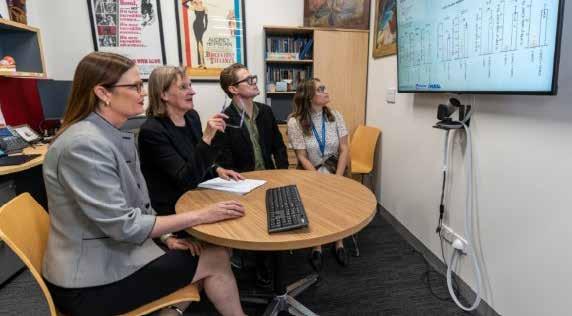

Clinical leadership by Cabrini has enabled MURAL to overcome considerable technical challenges in the generation, application, and maintenance of prostate cancer patient-derived xenograft (PDX) models.
The Cabrini Research Annual Report for 2023-24 outlines the commitment of our researchers and their progress across a wide range of clinical areas.
It gives me an immense sense of pride knowing that Research Operations have played a vital role in these achievements, supporting all our researchers to focus on our core mission – to transform patient lives through clinically impactful research. The excellence shown throughout Research Operations results from the leadership of our managers and the support provided by every single member of their respective teams.
Our Director of Medical Research, Dr Emma Baker, returned from parental leave in February 2024, giving us an opportunity to rethink the backfill measures implemented to cover her absence over the past 12 months. Following our mapping of people and priorities, we were able to pivot quickly to a new institutional structure that streamlined our processes and increased our capacity to meet new challenges and opportunities. Through this change process, Dr Brenton Um moved into a role focused on our long-term strategy and the commercial development of our research assets, while continuing to develop existing and new research programs.
Dianne Biermann, recruited in 2023 to position us in relation to the National Clinical Trials Governance Framework (NCTGF), was promoted to the role of Research Quality Manager in recognition of her experience and contribution since joining Cabrini. Following our anticipated accreditation, Dianne will action a research integrity program for all Cabrini researchers in 2025. These accreditation initiatives have been supported by Ioana Logan who transitioned from general administrative duties into a research quality role. Our Research Operations Administrator, Fiona Beckwith, left Cabrini in May 2024 and we thank her for her contributions and wish her all the best in her future endeavours. We have been fortunate to recruit Gayle Pettigrew to the role and look forward to her joining our team in July 2024.
There were a number of exciting growth initiatives across our research departments that were supported by Research Operations over the last year:
• Workshops conducted with our medical oncologists in early 2024 led to a better understanding of the barriers faced in their engagement with clinical trials. These learnings resulted in the development of a new engagement strategy which has already demonstrated promising early uplift.
• The team also contributed to growth in the Department of Urology, supporting the recruitment of Associate Professor Weranja Ranasinghe as Deputy Academic Director of Urology, and Ashley Baring as Research Assistant. Expansion across the department was made possible by the continuing support of the Pratt Foundation.
• Arrangements were put in place to bolster nursing research by appointing an academic Research Fellow through the School of Nursing at Monash University, seconded full-time to Cabrini. Additional plans were made to create a nursing research internship program that will provide salary support for a Cabrini nurse to pursue their research interests one day a week for up to 12 months.
Research Operations continued to support career development initiatives, including the reintroduction of an academic promotion scheme at Cabrini after a long hiatus following the COVID-19 pandemic. This scheme resulted in the promotion of Nathan Better and David Brewster to adjunct Clinical Professors and Eva Zopf to adjunct Associate Professor (Research). The team also coordinated an internal professional development program, opening opportunities for personal growth that would also provide value for Cabrini Research.
Finally, we were pleased to support two staff to work remotely from Germany and Spain for an extended period of time. These overseas placements reflect evolving approaches to productivity and an understanding of the long-term institutional benefits gained by exposing staff to different research environments. I am confident that by sharing their insights with Cabrini colleagues, new operational processes and models will be populated and adapted for future adoption and optimisation.
Over recent years, there has been a strategic focus on increasing the amount of funding secured through external grants. Research Operations has been active in horizon scanning and promoting upcoming granting opportunities, connecting specific researchers with grant opportunities. Alongside these traditional responsibilities, our management team has sought to maximise the likelihood of success for our applications by leveraging our wide-ranging capabilities in grant writing, industry engagement, and biostatistics. This renewed approach has led to several early successes, including $666,680 from the National Breast Cancer Foundation that will support our translational breast cancer research conducted out of the Monash Biomedicine Discovery Institute in Clayton.
In addition to grants acquisition, Research Operations has also developed enhanced tools for smart grants management. Our Data Governance and Registries Manager, Dr Stefanie
Elbracht-Leong, developed a bespoke Project Tracker on REDCap which has enabled us to capture and maintain grant related information and documents, while also automating communications to researchers flagging upcoming reporting milestones. It has also increased our capacity to manage research budgets and dynamically respond to project management queries from researchers.
The team has continued to contribute, coordinate, and drive several important research related committees, including the:
• Cabrini Research Committee (a sub-committee of the Cabrini Australia Board);
• Scientific Advisory Committee;
• Cabrini Research Governance Committee;
• Cabrini Research Heads of Department Committee; and
• Cabrini Research Consumer and Community Involvement Committee.
These committees have enabled Cabrini to make important decisions related to the direction of our research within an ethical and risk mitigated framework that is in line with worldclass scientific and clinical benchmarks. By tapping into the immense collective expertise of senior clinical academics and scientists, as well as health consumers, across these committees, Cabrini has been able to strengthen its already resilient governance structures.
Similar contributions have been made by Research Operations to other committees and initiatives, reflecting our vital role across the Cabrini network. These have involved:
• the Cabrini Health Quality and Safety Management Committee;
• the Cabrini Health Mission and Identity Committee (154 Wattletree Road);
• the Cabrini Health Work Health and Safety Committee;
• the Peter Meese Memorial Lecture;
• the Cabrini Health Postgraduate Scholarship Panel;
• Cabrini Foundation donor events; and
• Workday remediation and other human resource systems improvements.
Promotion of our research has always been a priority to make sure internal and external audiences are not only aware of but

also a part of our clinical breakthroughs. To this end, the Cabrini Research website has undergone updates that will be made public over several stages in the next 12 months. This progressive approach ensures continued alignment with accreditation standards and allows for iterative improvements to be made in response to feedback from consumers and our community.
One notable change has been the inclusion of a virtual patient tour, designed to optimally onboard Cabrini patients commencing a clinical trial so that they better understand how their treatment journey will unfold. A supplementary sponsor tour has also been developed, outlining our demonstrated expertise, infrastructure, and resources for prospective pharmaceutical and biotechnology companies seeking to identify suitable sites to trial their diagnostic and therapeutic candidates.
Overall, 2023-24 has been a year where Research Operations has dug deep, reaping great rewards from their collective efforts. While no doubt felt on an individual level, that sense of achievement is amplified when framed against the dedication and service the team has provided to Cabrini researchers and collaborators. I would like to thank everyone for their contributions over the past year and look forward to another filled with even greater success.
Gavin Horrigan Director of Research Operations, Cabrini Research
The Cabrini Research Governance Office (CRGO) provided site-specific assessments and lower-risk reviews for 70 studies during 2023-24 through a nonHREC (Human Research Ethics Committee) pathway. Entering its fifth year, this streamlined ethics process has proven to be effective and efficient, appropriately meeting the requirements of Cabrini and the scope and scale of its clinical research.
The Cabrini Research Governance Committee continues to play an important role in this, overseeing research activities and ensuring adherence to ethical and governance standards. CRGO facilitated 11 monthly meetings for the 16-member multidisciplinary group, which includes three active consumers. The committee’s contributions have enhanced not only the governance but also the quality of research at Cabrini.
The past year also saw a restructuring of CRGO with the elevation of Michele Tonkin to Research Governance Manager and Donna Li’s transition to the role of Research Governance Officer alongside Deb Macdonald. Occurring in early-2024, these moves have achieved greater operational efficiency while enabling more comprehensive oversight and support for projects. Additionally, CRGO revised its fee schedule to be aligned with external governance services, improving its financial sustainability.
Aligning with quality improvement actions carried out for the National Clinical Trials Governance Framework (NCTGF), CRGO has:
• Updated its HRECTrack software to capture key performance indicator data for enhanced assessment of clincal trials
• Revised participant information and consent forms to meet NCTGF requirements
• Incorporated NCTGF obligations and language into office documents and legal agreements.
Concurrent to this, CRGO updated its pre- and post-approval resources, most notably the Cabrini Research Governance Handbook, while also developing a suite of new policies, such as Safety Monitoring and Reporting in Research. The honorary researcher appointment process was also refined with the aim of streamlining and promoting greater collaboration with external researchers. These updates have since been reflected on the research governance webpage with the hope of enhancing clarity and accessibility, following feedback from the CRC&CIC regarding NCTGF resources.
A notable accomplishment from the past year was the 100 per cent good clinical practice compliance rate achieved by principal investigators at Cabrini, and the near-perfect compliance from associate investigators and support staff. These results reflect an institutional commitment to the highest possible clinical and ethical standards in research.
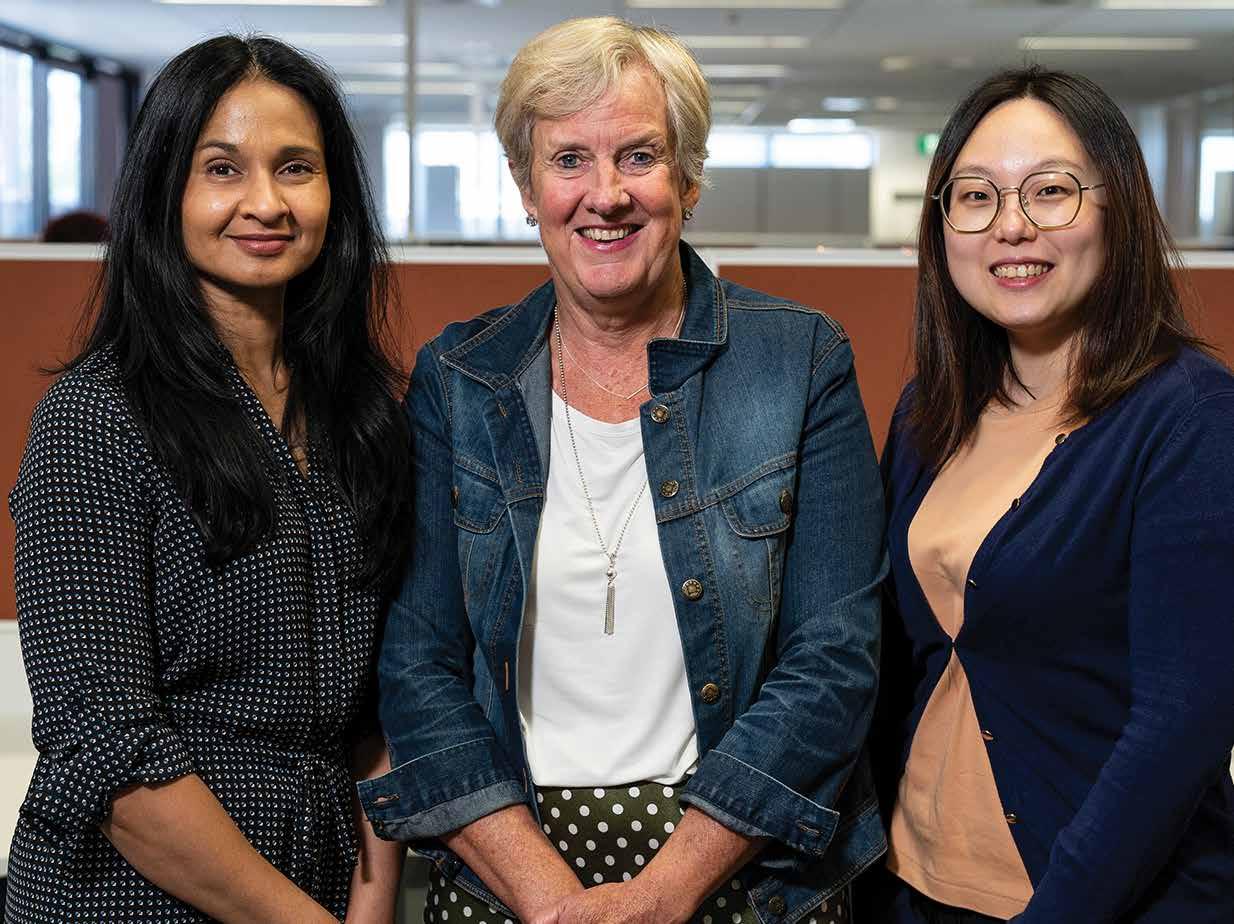
The Short Notice Assessment Program (SNAP) is a mandatory component of the National Clinical Trials Governance Framework (NCTGF).
Anticipated in late-2024, this assessment will involve sampling of up to 30 active studies and form the basis for Cabrini’s accreditation as a clinical trials provider.
In response, comprehensive preparations for SNAP have been made over the 2023-24 period, overseen by Dianne Biermann who was promoted to the role of Research Quality Manager in January. Key initiatives include the quarterly provision of clinical trials performance reports to the Cabrini Research Committee to ensure continuous oversight and transparency at all institutional levels.
Additionally, a broad governance review and quality improvement plan were both implemented. This included a survey of the clinical research workforce, designed to better

understand their respective training needs and Cabrini’s safety culture. Enhanced incident and safety monitoring mechanisms were also introduced to strengthen corrective and preventative actions, alongside research integrity training, which saw a soft initial launch earlier this year and will be made mandatory for all Principal Investigators over the next few months.
Communication with trial participants has also improved – particularly around healthcare rights, open disclosure, participant feedback, and consumer-partnered research –promoting greater trust and engagement. Learning from and responding to consumer perspectives has long been a focus for Cabrini through its community-focused work, enhanced by the CRC&CIC and its contributions.
The efforts made over the past 12 months build upon an institutional commitment to research excellence through safe and ethical practices.
As the NCTGF is implemented across the healthcare sector, this work will place Cabrini in a strong position to demonstrate a mature research governance culture as defined by the Framework’s accreditation standards.
Clinical trials are essential in advancing medical research and accelerating patient access to innovative therapies.
However, these rely heavily on the dedication of clinician researchers who balance their clinical responsibilities to serve as trial investigators. Last year, 13 clinician researchers were principal investigators across 37 trials, evaluating therapeutic and diagnostic candidates sponsored by academia and industry.
Dr Prachi Bhave is a medical oncologist who leads the Early Phase Clinical Trials Program at Cabrini. Passionate about advancing therapeutic candidates for cancer, she oversees the screening, enrolment, and management of patients, particularly those with solid tumours unresponsive to primary treatment.
Under her leadership, early-phase trials at Cabrini have grown to include a diverse range of candidates, including advanced chemotherapies and immunotherapies, targeted treatments, and vaccines. Of these, Dr Bhave has been Principal Investigator for:
• AMT-562 and AMT676, first-in-human phase I studies evaluating antibody drug conjugates against advanced solid tumours positive for HER3 and CDH17 genes, respectively;
• D3L-001-100, a phase I study evaluating an antibody therapy against advanced solid tumours positive for HER2; and
• INI-4001-101, a phase I study evaluating an immunotherapy against advanced solid tumours, both as a standalone and combination therapy.
Dr Prachi Bhave combines research and clinical care to elevate standards of cancer care at Cabrini and organisations throughout Greater Melbourne.
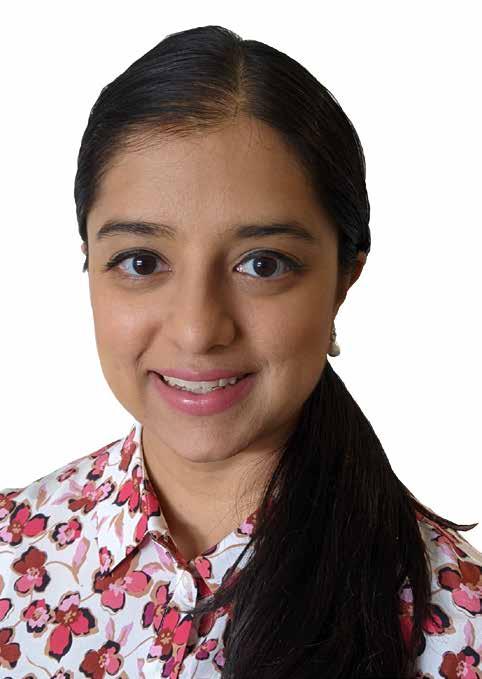
Through her clinical roles, Dr Bhave has supported the use of biomarker- and panel-based genomic profiling to better match her patients to clinical trials, including participation in the Cancer Screening Program administered by Omico. As an advocate for personalised models of cancer care, she currently serves as a Monash Partners Comprehensive Cancer Consortium Clinical Fellow, working with partners to implement precision oncology for south-east Victoria.
Beyond her clinical efforts, Dr Bhave is currently completing her doctoral research at the Peter MacCallum Cancer Centre, focusing on melanoma, one of her clinical sub-specialties. Her work explores the tumour microenvironment, using multiomic technologies to identify key molecular features and linking these to melanoma progression and recurrence through computational causal inference methods. Through this, she intends to develop predictive models capable of accurate patient risk stratification, ultimately creating preventive tools for melanoma recurrence.
Co-development to effectively support trial participants at Cabrini
Following consultation with the CRC&CIC, the concept of a patient virtual tour emerged in order to better facilitate the on-boarding process for study participants.
Its aim was to outline essential information about the facilities, resources, and services available to patients, empowering them as they navigate their clinical trials journey.
Over the past several months, consumers, investigators, and the clinical trials team have come together to co-develop this virtual patient tour. Now available on the clinical trials webpage, this online resource offers separate tours for Cabrini Malvern and Brighton, informing patients while also providing an opportunity to familiarise themselves with each hospital’s environment, fostering a greater sense of comfort.
In addition to the virtual tours, webpage content has been updated to provide further information on clinical trials for patients, clinicians, and sponsors. This includes a list of current trials organised by condition, ensuring access to the most relevant and up-to-date information concerning the clinical trial program at Cabrini.
Precision Oncology Screening Platform enabling Clinical Trials (PrOSPeCT) was launched last year to provide genomic profiling, conduct research, and build sovereign capacity in precision oncology.
Supported by $185 million in public and private funding, it is the largest cancer genomics initiative in Australia and the flagship program of Omico, a national network of cancer service providers that includes Cabrini.
In realising this vision, PrOSPeCT has established a traineeship program, designed to build the knowledge and expertise needed to implement precision oncology across different clinical settings.
In October 2023, Kate Hurford and Ella Knox from the oncology trials team participated in this immersive program, deepening their knowledge of genomics, clinical trials, and the complex intersection between each.
Combining workshops, eLearning modules, and mentoring sessions, the multi-modal methods used by the program also offered an opportunity to engage with other clinical trial groups and share experiences and insights across this rapidly evolving field. As Cabrini continues to develop its own precision oncology program, such professional development opportunities will prove critical as it builds the human capital needed to effectively connect patients to cancer clinical trials.
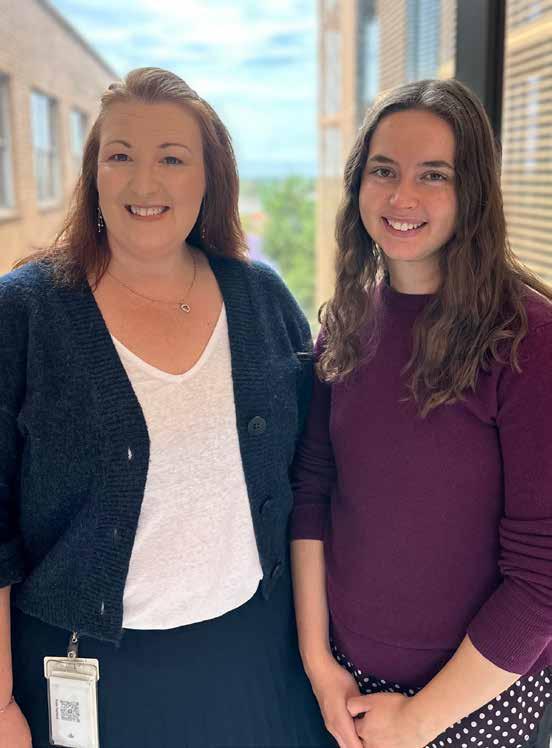
Oncology trials team (left to right) Caitlyn Wannenburg, Dulash Fernando, Simer Khaira, Ella Knox, Leyna Tran, Demis Balamatsias, Judith Ortega, Koby Scarff, Rochelle Woods, Gabriel Qi, Betty Dassios, Kate Chandler. Not Pictured: Kate Hurford, Dina Cherfi, Shelly Xu, Jogi Baby.
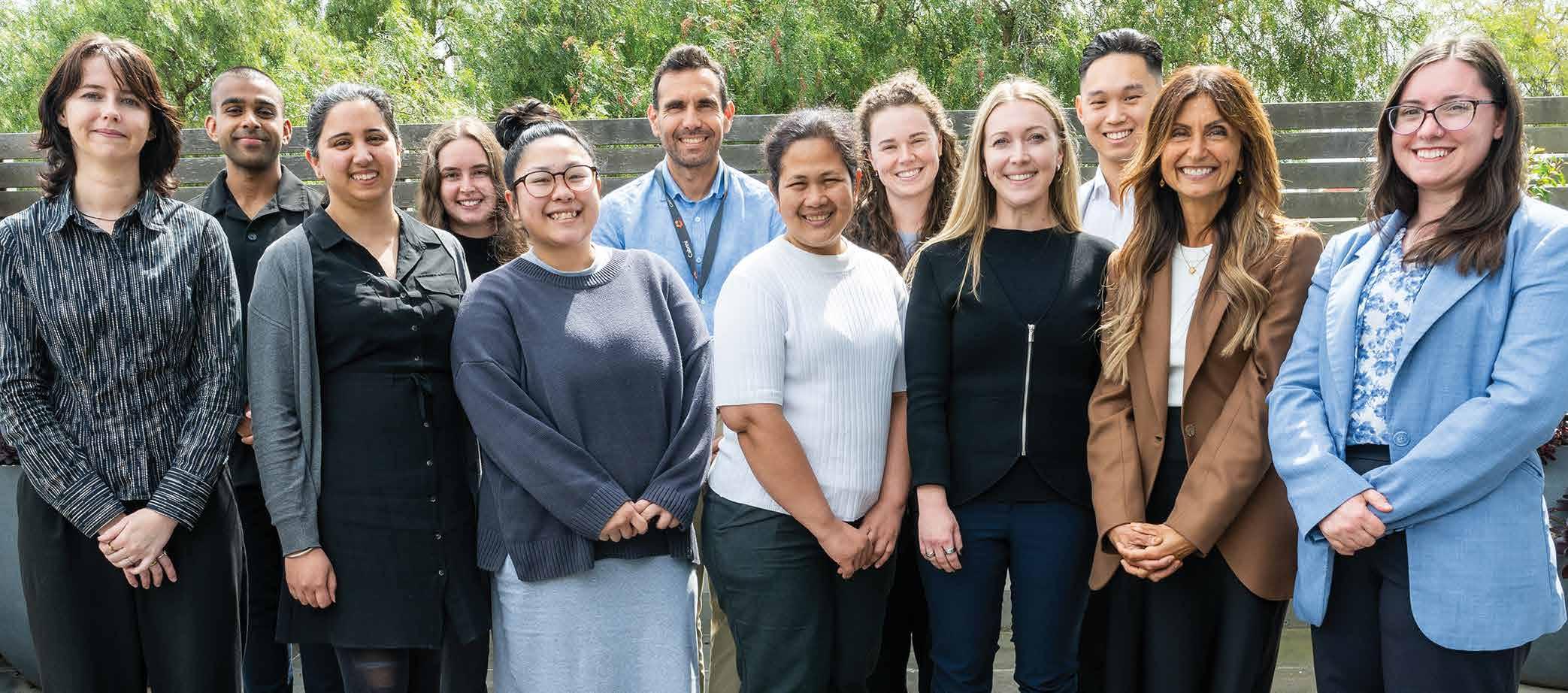
Data management has continued to be a core priority for Cabrini Research, aimed at satisfying objectives set out in the Cabrini Australia Group Strategy 2021-25.
Over the past year, this has involved renewed efforts to further embed health informatics into research, providing a dynamic platform that supports the rapidly evolving needs of researchers and elevates the scientific and clinical approaches that drive their work.
Recognising data as a growing strategic asset for Cabrini Research, Dr Stefanie Elbracht-Leong was appointed to the newly formed role of Data Governance and Registries Manager earlier this year. Bringing a wealth of experience in overseeing data infrastructure across research, healthcare, and industry, she has led a series of structural initiatives, from their design, implementation, and ongoing improvement.
A key area of focus has been the introduction of sound data management practices that further ensure robust privacy protections for patients and their data. Involving a collective effort from Cabrini’s six database managers, existing internal databases and registries have been updated in line with national and international data protocols, with data collection and management processes also consolidated. This has occurred while:
• incorporating quality improvements that meet global performance benchmarks;
• increasing the number of internal databases across oncology, cardiology and urology; and
• collaborating with external clinical quality registries (CQRs) in flagship areas of clinical care.
Underpinning this has been the development of revised data governance and management policies, and their dissemination across the wider Cabrini research community. The revival of the Data Governance Committee has been central to this, bringing together members across a range of disciplines to oversee all database and registry activities involving Cabrini patients.
Chaired by Dr Elbracht-Leong, the Committee has begun establishing guidelines to promote a standardised approach to data throughout Cabrini Research. It has ratified the new Data Management, Access and Sharing Policy that sets clear institutional requirements around the capture, analysis, dissemination, re-use, and storage of data. Additionally, the Committee has fostered partnerships with national CQRs, to inform improved internal practices, and both optimise and accelerate data-driven insights for patients.
Through these efforts, the Data Governance Committee has worked closely with the Research Governance Office to enhance data processes and pathways across the full spectrum of projects conducted at Cabrini. It is hoped that with these synergies, a rigorous data ecosystem can be advanced towards expanded research efforts and in turn, improved patient outcomes.

Vana Madelli, Matthew Horrigan, Mary Temidayo (left to right) and Karen Peasley (not pictured) manage databases containing longitudinal clinical data that help improve standards of care and inform the direction of research at Cabrini.
The Global Burden of Disease (GBD) study represents the most comprehensive effort to understand the impact of disease on humanity.
Established by the Institute for Health Metrics and Evaluation in 1992, the study has tracked changing prevalence patterns and determinants for a diverse range of diseases, and currently involves more than 200 countries and a collaborative network of over 8000 scientists and analysts.
In May 2024, The Lancet published a special issue on the landmark initiative, representing one of the most important scientific publications of the year.
Cabrini Research is connected to the GBD study through Associate Professor Mohammad Asghari-Jafarabadi, who oversees biostatistics at Cabrini Research. Since 2023, Associate Professor Asghari-Jafarabadi has coauthored 11 of the 22 publications he has contributed to as part of the study, including research quantifying:
• the burden posed by nervous system disorders (The Lancet Neurology);
• the impact of smoking on life expectancy (The Lancet Public Health); and
• the influence of 288 factors on mortality (The Lancet).
This work forms just one component of his broader scope of research, which involves interdisciplinary collaborations with several departments at Cabrini, alongside the supervision of medical students participating in the research scholarship program. Reflecting his commitment to advancing knowledge and policy for human health, Associate Professor AsghariJafarabadi was again recognised as being amongst the top two per cent of researchers in the world by the Stanford Meta-Research Innovation Centre.
THE GBD STUDY OFFERS A POWERFUL RESOURCE TO UNDERSTAND THE CHANGING HEALTH CHALLENGES
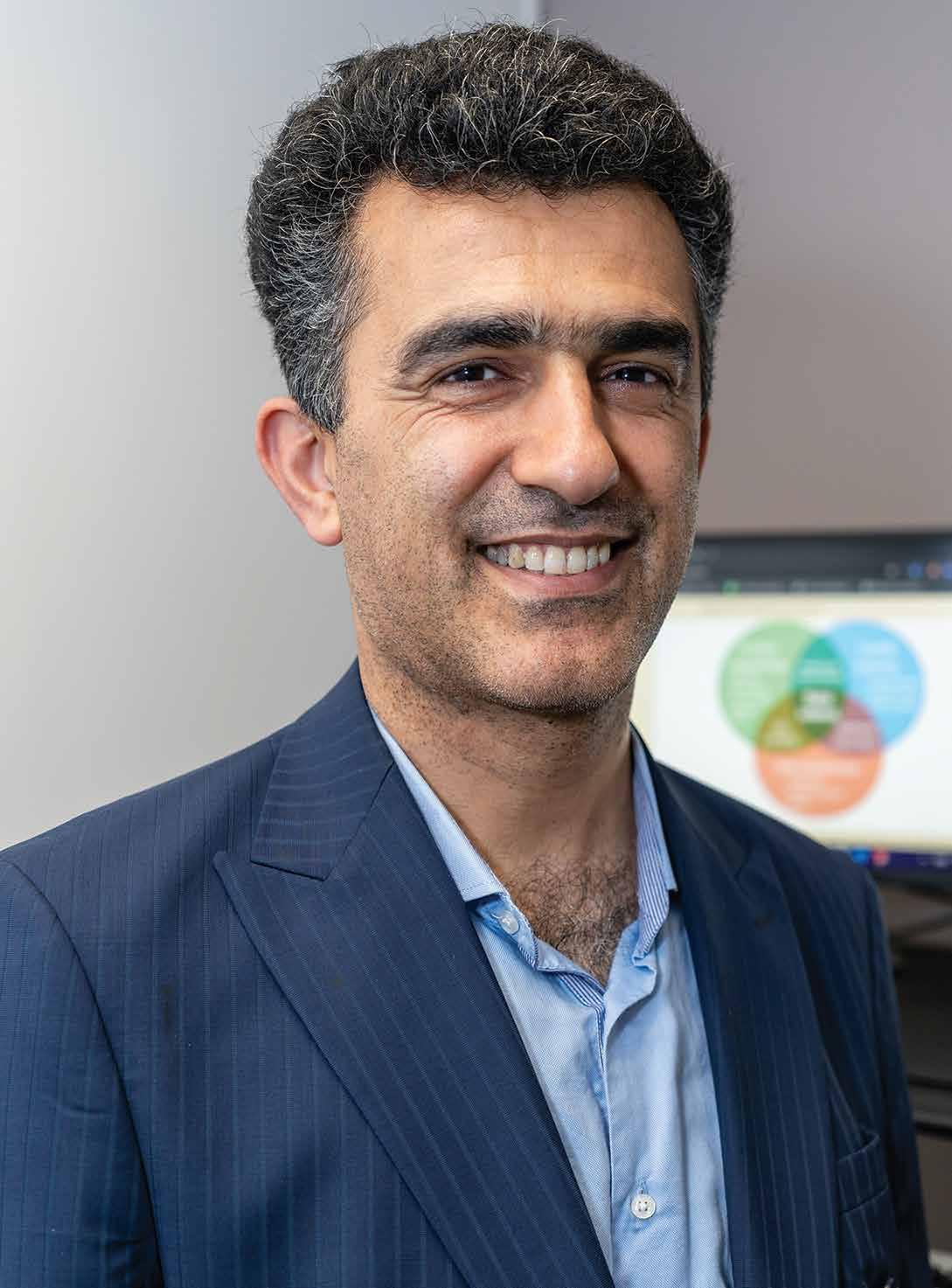
204 countries and territories
371 diseases and injuries 88 risk factors
Funding from competitive peer-reviewed grants ensures that our research is sustainable and aligns with both national research priorities and standards of excellence. Over the past 12 months, Cabrini researchers have been successful in several external grant schemes, administered by major foundations, and both Victorian and Commonwealth government funding bodies.
Dr Jasveena Kaur (left) and Dr Dilys Leung will combine organoid models and multiomics to identify the biological mechanisms responsible for breast cancer through funding from the National Breast Cancer Foundation.
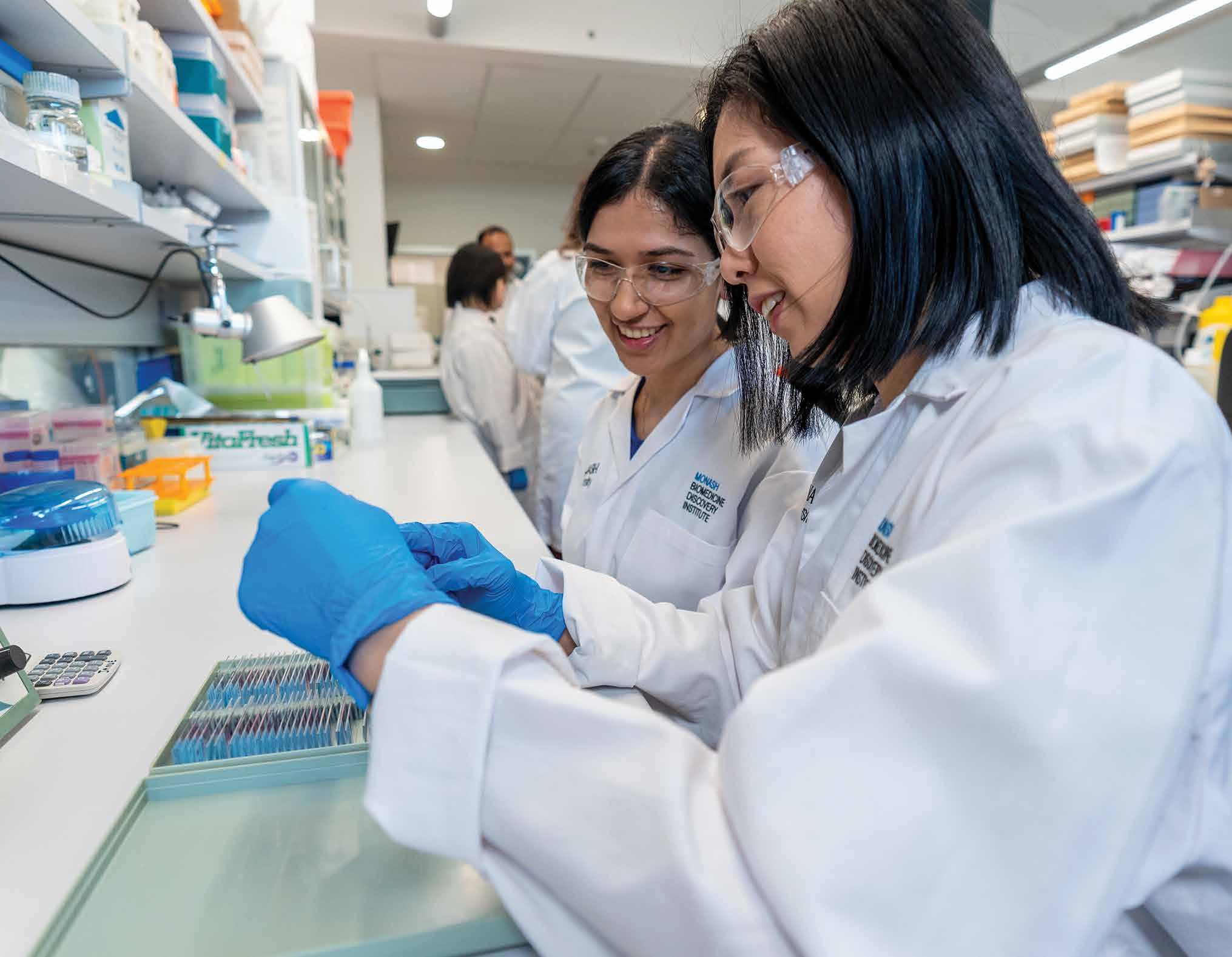
Studying communication between cancer-associated fibroblasts and breast cancer cells to identify druggable vulnerabilities
Funding Body: National Breast Cancer Foundation (NBCF)
Grant Scheme: NBCF Investigator Initiated Research Scheme
Cabrini Researchers: Professor Gary Richardson (Co-Investigator), Dr Dilys Leung (Co-Investigator)
Cancer-associated fibroblasts (CAFs) are found abundantly in breast cancer and are believed to play a key role in tumour growth, treatment resistance, and recurrence. Through a collaboration between Cabrini and the Monash Biomedicine Discovery Institute, this project will apply advanced organoid models and multiomic technologies to precisely identify the ways through which CAFs promote breast cancer. These mechanisms could potentially be exploited to develop new targeted therapies for breast cancer, offering a new research paradigm for the treatment of the disease.
Funding Body: Perpetual
Grant Scheme: IMPACT Philanthropy Application Program
Cabrini Researcher: Dr Dilys Leung (Principal Investigator)
Treatment resistance remains a leading contributor to breast cancer mortality, particularly in highly aggressive subtypes. Yet continued research into the tumour microenvironment (TME) that surrounds breast cancer tumours has revealed new insights as to the exact biological causes of treatment resistance. Dr Leung aims to identify these by developing organoids that have been co-cultured with cancer-related cells and analysing these highly sophisticated models of breast cancer and their TME. Doing so will facilitate the development of combinational treatment strategies capable of overcoming resistance-related breast cancer recurrence and metastasis.
Associate Professor Weranja Ranasinghe:
Expanded eligibility for radioligand therapy in prostate cancer patients
Recent advances leveraging prostate-specific membrane antigen (PSMA) expression to guide radioligand targeted therapy have led to improved treatment and quality-of-life outcomes for prostate cancer.
However, up to 30 per cent of all prostate cancer patients are ineligible for this treatment approach due to insufficient levels of PSMA expression, with an additional 20 per cent of patients falling below threshold measures after initial treatment.
To expand eligibility to this effective targeted therapy, the Auric Innovation Grant has been awarded to Associate Professor Weranja Ranasinghe who recently joined Cabrini Research as Deputy Academic Director of Urology. His research will seek to regulate PSMA-suppressive pathways to develop a novel mechanism capable of inducing or amplifying levels of expression in ineligible patients.
This project will involve patient-derived xenografts developed for the MURAL Collection, which provide an accurate laboratory model to evaluate the efficacy and safety of the PSMA-regulating mechanism. If successful, the project will open translational pathways to phase I clinical trials, signalling an important milestone for the Department of Urology and Cabrini Research. More than 60 Australian lives are lost to prostate cancer every week. This innovation has the potential to reduce this number, reflecting the Auric’s intended purpose to drive clinically impactful research at Cabrini.
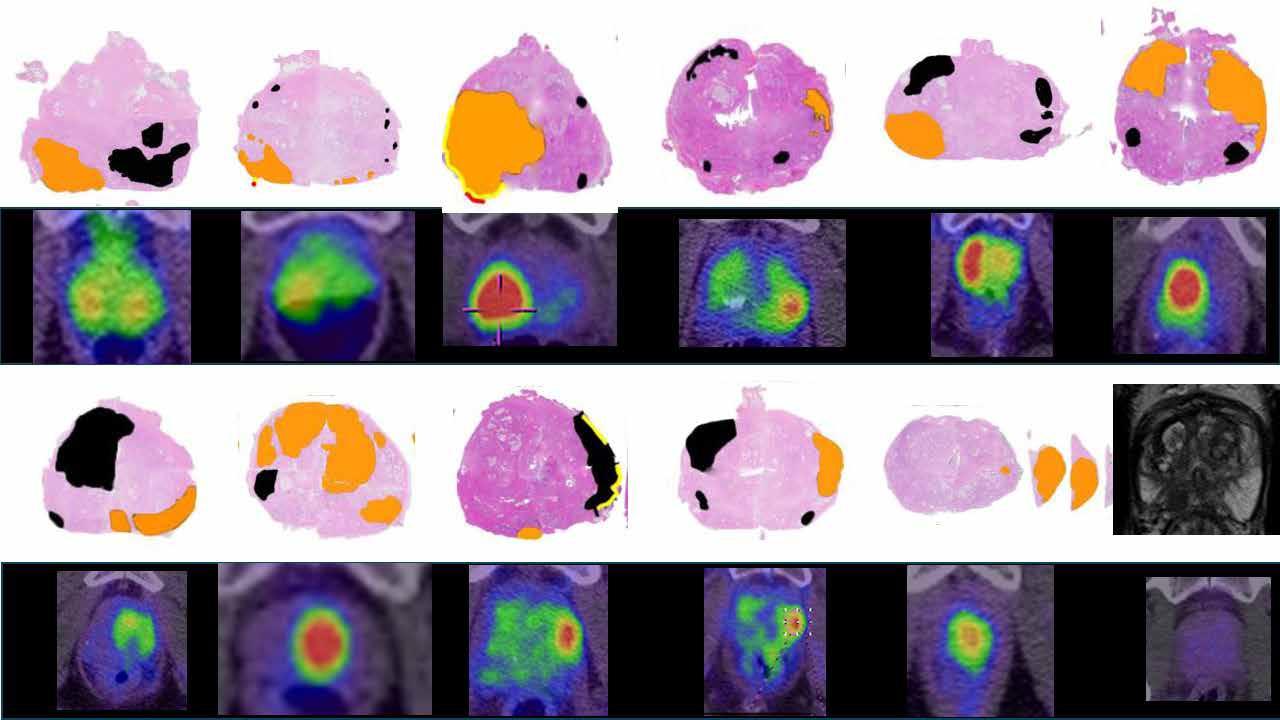

Variable PSMA expression is seen in different prostate tumours. The top and third rows indicate tumours on radical prostactectomy samples, with the second and fourth rows indicating the corresponding PSMA activity.
Through the support of the Cabrini Foundation, an annual internal grant round is conducted to provide targeted support for research projects with shortterm outcomes or intermediary requirements, such as preliminary data. Several projects have gone on to make significant contributions to medical research, demonstrating the compounding impact of philanthropy.
This year, six Cabrini Foundation Grants were awarded, two in cancer research and four in general research.
INVESTIGATOR DEPARTMENT
Dr Dilys Leung Neil Beauglehall Department of Medical Oncology Research
Associate Professor Eva Zopf
Neil Beauglehall Department of Medical Oncology Research
Professor Peter Kistler Department of Cardiology Research
Professor Philip Russo Cabrini Monash University Department of Nursing Research
James Sherwood Allied Health
Associate Professor Alex Voskoboinik Department of Cardiology Research
PROJECT AIM
To spatially map breast cancer gene expressions at a cellular level and define the mechanism responsible for tumour growth.
To conduct exercise trials for melanoma patients receiving immunotherapy and evaluate their impact on clinical and oncologic outcomes.
To investigate the benefits of structured yoga programs as a non-pharmacological, non-invasive complementary intervention for patients with atrial fibrillation.
To implement a novel machine learning algorithm for surgical site infection surveillance and evaluate resulting hospital workflow efficiencies.
To implement a new clinical care pathway for low back pain management in alignment with Australian Clinical Care Standards.
To examine the impact of catheter ablation procedures on sexual function for the holistic management of atrial fibrillation.
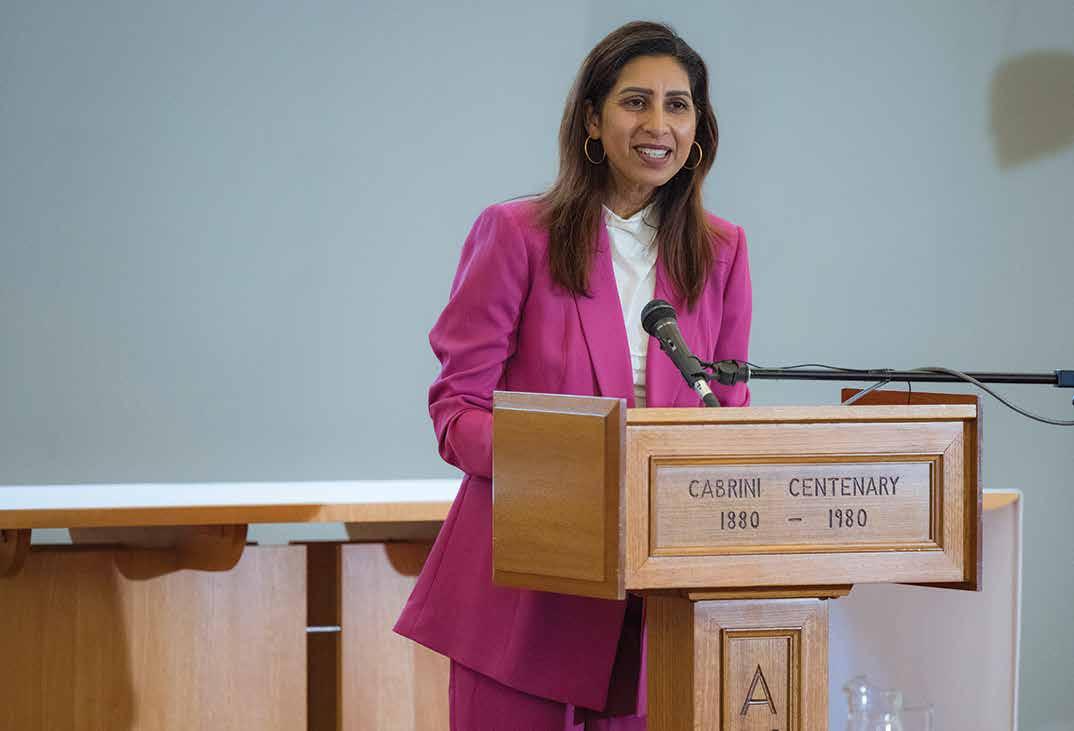
The 2024 Peter Meese Memorial Lecture was delivered by Dr Ranjana Srivastava OAM, a geriatric oncologist and author who offered a profound exploration of compassion and its indispensable role in medicine.
Drawing deeply from personal and professional experiences, she highlighted the multi-dimensional ways through which compassion shapes patient journeys and influences clinical outcomes, while also noting its powerful effect on the lives of healthcare professionals.
Recounting the loss of her twin pregnancy, Dr Srivastava emphasised how the compassionate gestures of her obstetrician and midwife provided immense solace during her grief. Handwritten condolence letters and genuine expressions of empathy were not merely formalities but vital supports that illustrated the lasting effect small acts can have on a patient’s emotional healing process.
Dr Ranjana Srivastava OAM delivered the 2024 Peter Meese Memorial Lecture and spoke to the fundamental importance of compassion in the delivery of care, not only for patients but also clinicians.
Dr Srivastava also delved into the challenges of compassion fatigue experienced by clinicians, particularly in emotionally demanding fields like oncology.
She noted how the cumulative burden of patient suffering over the course of a career can easily lead to emotional exhaustion. By acknowledging that “there is such a thing as too much empathy,” Dr Srivastava underscored the need for healthcare organisations to create environments where self-care and resilience are promoted amongst its most valuable assets, its people. This was extended to the medical community itself, where compassion is far too often overlooked, contributing to declining workforce retention.
Throughout her lecture, Dr Srivastava recalled the empathy and compassion of Dr Peter Meese and his work at the beginning of what would become the global HIV/AIDS pandemic. Noting the ability of empathy and compassion to transform lives, she advocated for their active integration into medical training and routine practice, reflecting the human connection that lies at the heart of effective medicine.
Cabrini research sessions are an opportunity to disseminate research findings within an inter-disciplinary forum. Alongside scientists and clinicians, these events bring together consumers, advocates, and the wider public who are able to directly engage and shape the direction of our research.
MONTH DEPARTMENT/THEME SPEAKER
July 2023
August 2023
HER Centre Australia
Dr Leo Chen
Dr Eveline Mu
Dr Romi Goldschlager
Cabrini Outreach
September 2023 Cabrini Monash University Department of Surgery
October 2023 Medical Student Research Scholarship Presentations
Bafreen Sherif
Dr Raymond Yap
Dr Shehara Mendis
Dr Christopher Steen
Neha Shibu
Chania Lobo
Caitlin Zhou
November 2023 Medical Student Research Scholarship Presentations
Cabrini Research Forum
December 2023
Lucy Porter, Ola Sultan
Roxanne Lim, Mark McDonald
Prof Gary Richardson
Annual Cabrini Awards Prof Gary Richardson
February 2024 Research Forum Awards Dr Emily Bell
Sunny Li
Publication of the Year
Assoc Prof Mohammad Asghari-Jafarabadi
March 2024 Research Forum Awards Dr Carolina Lliberos Requesens
Paula Newman
April 2024 Nuclear Medicine
May 2024 Department of Cardiology Research
June 2024 Cabrini Monash
University Department of Nursing Research
Department of Urology
Paul Einsiedel
Assoc Prof Dinesh Sivaratnam
TOPIC
Functional connectivity-informed individualised transcranial magnetic stimulation therapy for anorexia nervosa - The FUNCTIAN trial
Novel treatments in complex posttraumatic stress disorder
THRED - The Transformative Hub for Research in Eating Disorders
Health survey of refugees and asylum seekers with an experience of immigration detention
Artificial intelligence assisted colonoscopy to improve adenomatous polyp detection and prevent interval colorectal cancer – A clinical trial
When you can’t follow the rulebook - Outcomes in a real-world population of stage III colon cancer patients
Topical nifedipine for post haemorrhoidectomy prelief: A randomised, prospective, double-blind placebo trial protocol
Efficacy of cardiac rehabilitation in reducing hospital readmissions: A retrospective cohort study
Factors contributing to congestive cardiac failure, urinary tract infection, and constipation readmissions within seven days of discharge
Systematic screening for psycho-existential symptoms in patients with pancreatic cancer: A cohort study
How long do nosocomial pathogens persist on inanimate surfaces? A systematic review
A retrospective review of code grey emergency response calls at Cabrini Malvern – Part 2
Announcement of the 2023 Cabrini Research Forum Awards
Announcement of the 2023 Doug Lording Research Award, Cabrini
Publication of the Year Award, Best Medical Student Research Scholarship Presentation Award
Using Supported Motivational Interviewing (SUMIT) to improve physical activity for people with knee osteoarthritis
Optimisation of heart failure medications on discharge at a single tertiary hospital
Survival prediction and prognostic factors in colorectal cancer after curative surgery: Insights from cox regression and neural networks
Establishing patient-derived organoid cultures as a preclinical model of ovarian cancer
Exploring post fall management pathways and the experience of the patient
Use of ionising radiation in clinical trials
Theranostics
Prof Peter Kistler AF ablation at Cabrini
Assoc Prof Alex Voskoboinik
Atrial fibrillation and lifestyle factors
Prof Nathan Better The INCAPS journey: Vienna to Malvern
Dr Michael Loftus
Dr Darren Lam
Assoc Prof Weranja Ranasinghe
Findings from the WATCH study (Healthcare Worker Attitudes to Climate Change and Health)
Update on the focal therapy program at Cabrini
Ductal prostate cancer - Research from PDX models
The Cabrini Research Forum is an annual event, highlighting the progress made across our research priorities. In 2023, 62 poster submissions were received and viewed across the research community, with awards distributed in six categories.
AWARD
Medical (or other) student undertaking a research scholarship, or Honours degree
Student undertaking higher degree study – Masters or PhD
Clinician Stepping into Research
Early Career Researcher
Experienced Researcher/Lead Researcher Award
People’s Choice Award
RECIPIENT TOPIC
Pranjal Chaurasia
Sunny Jiaqi Li
Samantha Loh
Paula Newman
Dr Carolina Lliberos Requesens
Associate Professor David Pook
Dr Emily Bell
Antithrombotic haemorrhagic risk in endoscopy patients: a singleinstitution retrospective study – preliminary findings
Optimisation of heart failure medications on discharge at a single tertiary hospital
Venous thromboembolism risk assessment and prophylaxis prescribing within an electronic medication chart
Exploring post-fall management pathways and the experience of the patient
Establishing patient-derived organoid cultures as a preclinical model of ovarian cancer
Prostate cancer donate program
Using SUpported Motivational InTerviewing (SUMIT) to improve physical activity for people with knee osteoarthritis
Samantha Loh (left) was awarded in the postgraduate research category for work on venous thromboembolism, publishing findings in the International Journal of Clinical Pharmacy as first author alongside senior author, Robert Wojnar (right).
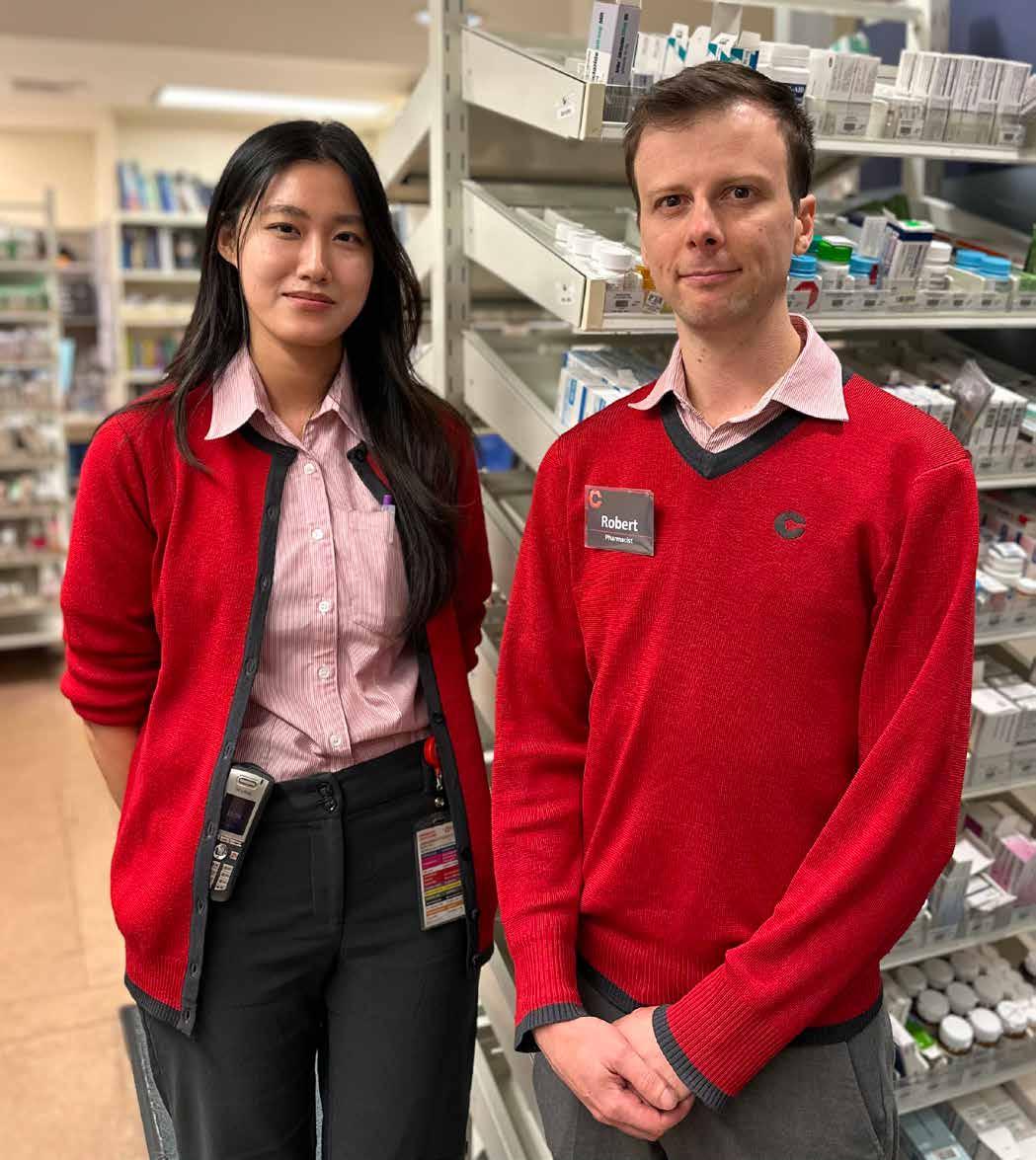

Professor Paul McMurrick: An enduring commitment to patients with colorectal cancer
Professor Paul McMurrick has received the highest award conferred at Cabrini Research for his contributions towards improved outcomes in colorectal cancer.
Named in honour of our inaugural Director, Associate Professor Doug Lording AM, the annual award celebrates significant careers in medical research.
Since joining Cabrini, Professor McMurrick has led several notable advances, including the establishment of the Cabrini Monash Colorectal Neoplasia Database in 2010. Adopted by the Colorectal Surgical Society of Australia and New Zealand it has evolved into a critical reference database, guiding both colorectal cancer research and clinical care.
In collaboration with the Monash Biomedicine Discovery Institute, Professor McMurrick has also overseen the development of an extensive library of organoids. These preclinical models have facilitated a deeper understanding of the biological complexities of colorectal cancer, accelerating progress towards new therapies and models of precision medicine.
Throughout his career, Professor McMurrick has also played an active role across diverse communities, raising both awareness and funds through Let’s Beat Bowel Cancer while contributing to the realisation of the National Bowel Cancer Screening Program in 2006. Since its inception, the program has successfully reduced bowel cancer mortality by 40 per cent through increased early detection and intervention across Australia.
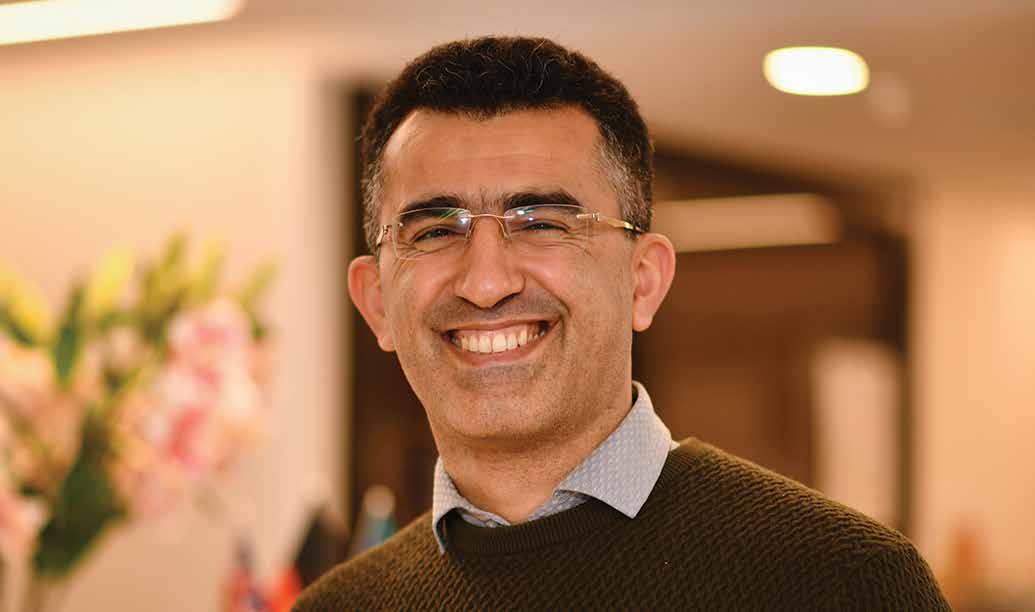
The 2023 Publication of the Year Award was presented to Associate Professor Mohammad Asghari-Jafarabadi for his work evaluating the accuracy of two analytical models for colorectal cancer patients following surgery.
Published in Scientific Reports, the study found that while both models were highly effective, the conventional Cox model demonstrated superior prognostic accuracy for recurrence, while the neural network model excelled in predicting mortality. The research significantly advances the delivery of patientcentred colorectal cancer care, illustrating the pivotal role of both statistical methods in informing clinical decisions and treatment strategies.
The publication reinforces Associate Professor AsghariJafarabadi’s standing as a global leader in bioinformatics, ranking him within the top two percent globally by c-score, a metric developed by the Meta-Research Innovation Centre at Stanford University to measure actual impact through research.
Each year, the Senior Medical Staff Association provides competitive research scholarships to Monash University medical students undertaking clinical placements at Cabrini Health. In 2023, eight students were selected to participate in the program, conducting research across a range of subject areas outlined below.
As part of the program, medical students are required to share their findings with the wider community, with 2022 scholarship recipients presenting during last year’s October and November Cabrini Research Sessions. From this cohort, Demi Markakis was presented the Best Medical Student Presentation Award for her research investigating ocular gene therapies.
RECIPIENT PROJECT
Osama Al Jawadi
Tina Tang
The impact of transfusion dependency in myelodysplastic syndrome (MDS) on patient reported outcome measures
Assessing the ability of artificial intelligence to enhance emergency department discharge correspondence
Ayham Yasein Audit of Melbourne Rheumatology Group for cardiac risk
Danying Cao, Lucy Porter, Jimmy Rowbottom
Ethan Erikson, Karim Khalil
A prospective analysis of clinical versus invasive and laboratory signs of the adequacy of perfusion in ICU patients
Narrative review of pre-hospital extracorporeal membrane oxygenation during cardiopulmonary resuscitation (ECPR)
SUPERVISOR
Associate Professor Melita Kenealy
Dr Ian Turner
Dr Zoe Brown, Professor Stephen Hall
Associate Professor Warwick Butt
Professor David Brewster, Dr Josh Ihle
Academic promotions not only represent significant personal achievements but also a collective milestone for Cabrini Research.
This year saw Nathan Better and David Brewster advance to Clinical Professor and Eva Zopf to Associate Professor during the 2024 Monash University Academic Promotion Round.
Professor Nathan Better serves as Academic Director of the Department of Cardiology Research and as Director of Physician Training and Postgraduate Research at Cabrini. A leader in the field of nuclear cardiology, he is an expert lecturer with the International Atomic Energy Agency, Chairman of the International Advisory Panel for the American Society of Nuclear Cardiology, and sits on the board of the Australasian Association of Nuclear Medicine Specialists and the Journal of Nuclear Cardiology. Over the past two and a half years, Professor Better has overseen the rapid expansion of the department, led landmark international clinical trials, and published in leading journals including the Journal of the American College of Cardiology, Circulation, and the European Heart Journal
Professor David Brewster is Head of the Department of Critical Care and Anaesthesia Research. Globally recognised for his work in airway management, he has led both national and international clinical guidelines, notably for intubation for SARS-CoV-2, and has published in Intensive Care Medicine, Anaesthesia, and the American Journal of Respiratory and Critical Care Medicine. He holds advisory roles for the Safe Airway Society for Australia and New Zealand, the Project for Universal Airway Management, and the Society of Critical Care Anaesthesiologists. Professor Brewster is also responsible for increased research programs and teaching capacity for medical students at Cabrini, having previously served as the Director of Academic Programs.
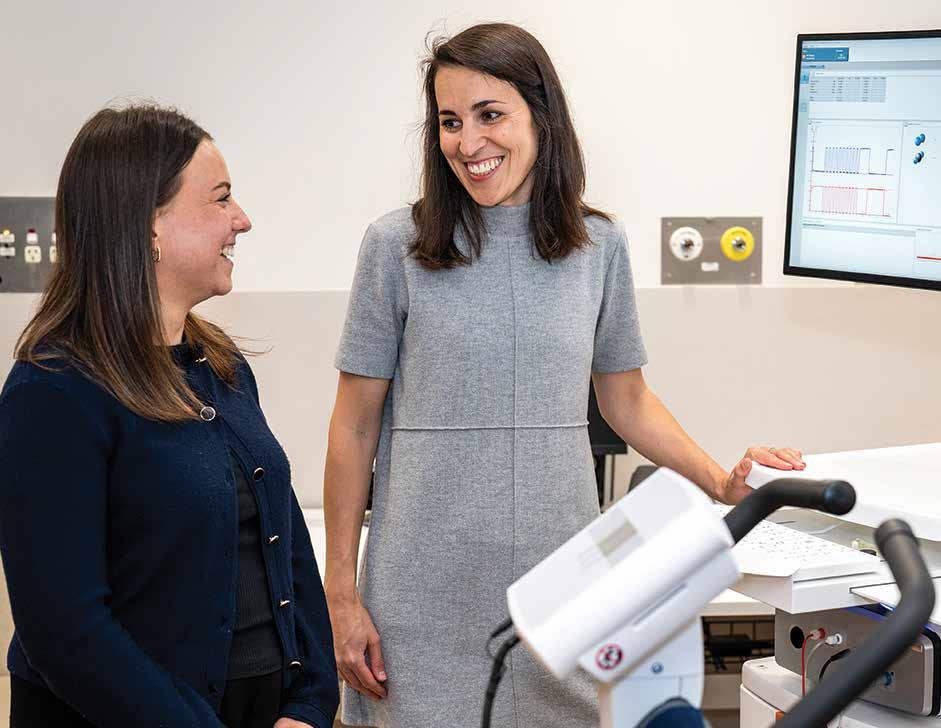
Associate Professor Eva Zopf is Head of the Cancer Exercise Laboratory within the Neil Beauglehall Department of Medical Oncology Research. She is a leading exercise physiologist and has played a prominent role in raising the global profile of exercise oncology, both through research and clinical paradigms. Having set global benchmarks for the field through research in Germany, Associate Professor Zopf has held leadership roles in global research consortiums, most notably PREFERABLE, funded by the European Commission and NHMRC. She has also overseen several exercise oncology trials, with findings published in world-leading journals including Nature Medicine and Epidemiologic Reviews
Cabrini Research would like to congratulate Professors Nathan Better and David Brewster, and Associate Professor Eva Zopf for their significant accomplishments.
Associate Professor Eva Zopf (right) and Nicole Hirshowitz oversee globally recognised research in exercise oncology, conducted through the Cabrini Cancer Institute.
The Department of Nursing Research has continued to reveal key insights into nurse-led hospital settings by integrating research with clinical practice. Driven by a common desire to enhance outcomes for patients, health systems, and nurses, our research plays an important role in achieving a more holistic understanding of healthcare delivery in Australia.
The past 12 months has seen us make notable progress across all our projects. Amongst these, we continue to collect and analyse information over multiple modalities for our falls management research. The resulting dataset will seek to inform safer clinical protocols, minimising the occurrence of falls for some of our most vulnerable patients at Cabrini and beyond.
Furthermore, we commenced phase I of the HAPPEN trial and published findings from its survey component in Infection, Disease, and Health earlier this year. Led by Monash University, the multi-site trial involves several international partners and aims to evaluate the impact and cost-effectiveness of oral care interventions for the prevention of hospital-acquired pneumonia.
Looking forward, we hope to build upon these efforts and explore new areas of research, with a small project currently being developed in collaboration with the Infection Prevention and Control Department at Cabrini. This work will be supported by the addition of a Research Fellow in 2025, who will enable us to expand our research and deliver tangible improvements to everyday nursing practice.

10 Publications 1 Clinical trial
5 Active projects
Findings from the CLEEN study concerning improved infection control were published in the globally leading journal, The Lancet Infectious Diseases.
Involving Professor Philip Russo, the study examined the effects of enhanced cleaning and disinfection protocols for shared medical equipment on hospital-acquired infections (HAIs) across ten wards in a major public hospital in New South Wales.
Results revealed a substantial reduction in HAIs through dedicated cleaning, with rates falling from 17.3 per cent to 12.0 per cent over a 36-week period, a 34.5 per cent decline. Underscoring the importance of infection prevention, the study provides critical data to validate and inform revised hospital guidelines recommending more stringent operational practices.
The research furthers Professor Russo’s long-standing work observing HAIs and developing interventions that alleviate their significant burden on patients, clinical staff, and health systems. This has revealed the need for new approaches to cleaning and disinfection, particularly in light of the growing challenge posed by antimicrobial resistance, estimated by the World Health Organisation to contribute to approximately five million deaths each year.
The CALIPSO study seeks to refine antibiotic protocols by identifying optimal dosage periods in patients undergoing cardiac surgery.
Endorsed by several peak bodies, the five-year trial aims to minimise the emergence of drug-resistant bacteria, ensuring the continued effectiveness of antibiotics for the prevention of surgery-related infection.
In collaboration with the Department of Critical Care and Anaesthesia Research, recruitment for CALIPSO has continued throughout 2023-24, seeking to reach the 9180 participants needed to validate the study. Successfully determining the most effective duration of antibiotic use will signify a vital step forward in cardiac care, creating safer environments for both patients and clinical staff, particularly nurses who serve on the frontline of care. Furthermore, streamlined antibiotic use generates costefficiencies that improve how resources are allocated within health systems. Doing so allows for structural changes towards a more resilient and sustainable model of healthcare delivery, meeting the ever-growing needs of future patient populations.
The CLEEN study has revealed a 34.5 per cent decline in hospital-acquired infections through enhanced cleaning and disinfection protocols for shared medical equipment, such as defibrilators and respiratory ventilators.
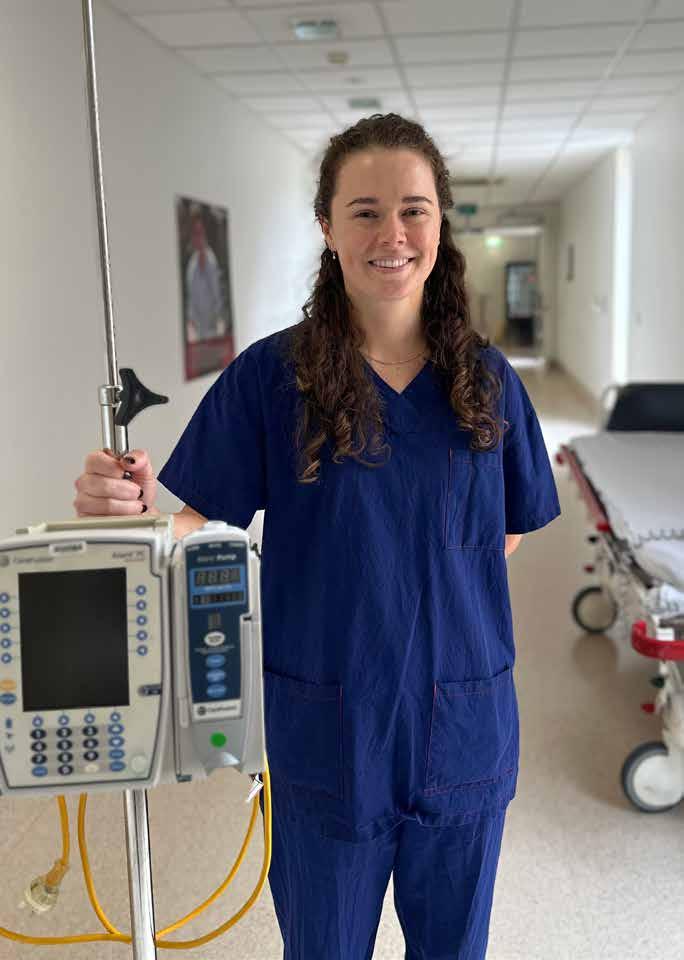
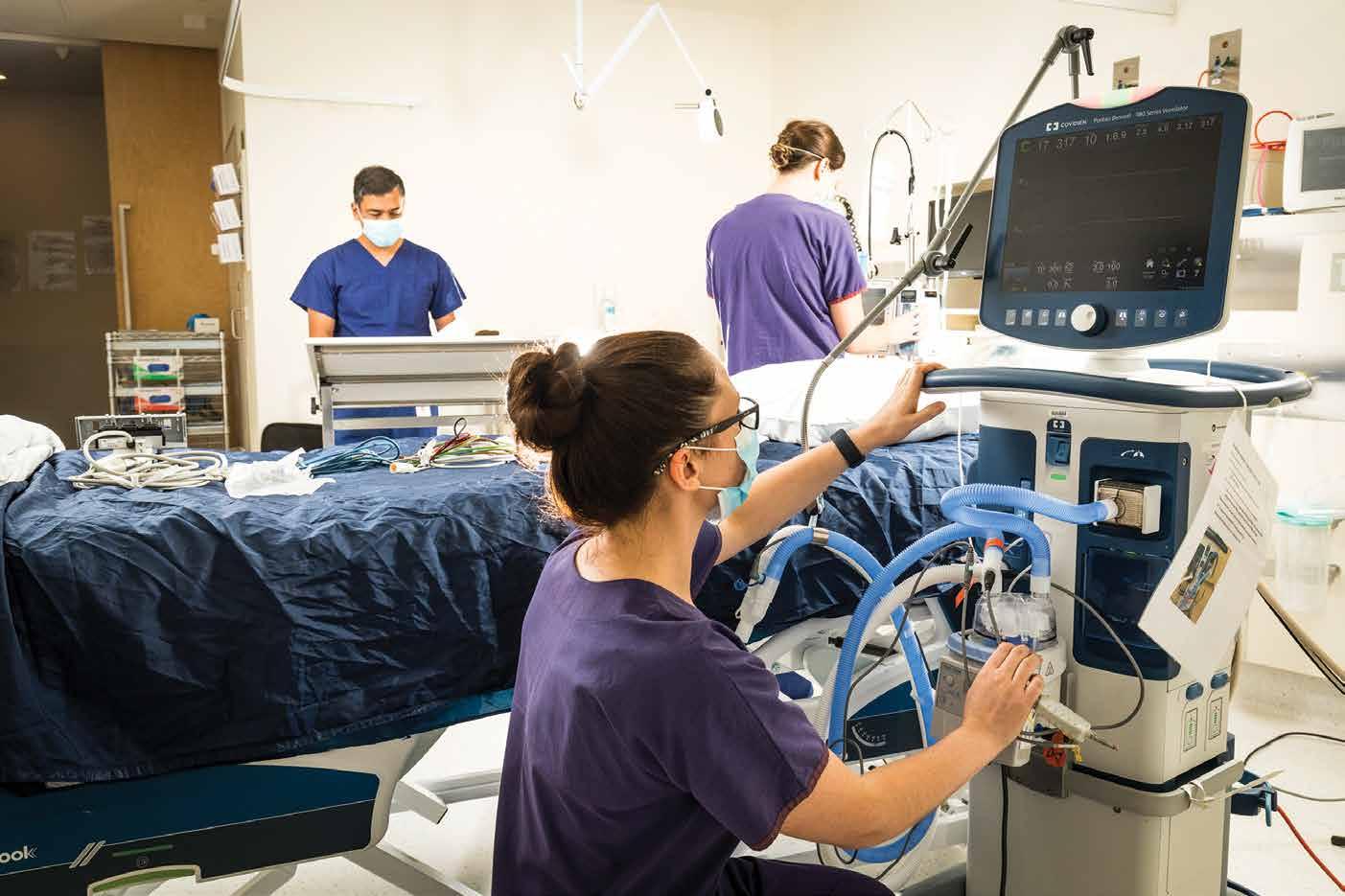
Several milestones were reached by the Cabrini Monash University Department of Surgery over the reporting period, reinforcing our commitment to advancing colorectal cancer care through innovative research. Underpinning this has been our ongoing collaboration with the Stem Cells and Cancer Laboratory at the Monash Biomedicine Discovery Institute, led by Professor Helen Abud.
The department has continued to progress the development and implementation of patient-reported outcome measures (PROMs) that effectively capture patient perspectives of their care and subsequent path to recovery. Such patient-centric approaches are a common theme across our research, extending to our work in postsurgical management and personalised medicine, which prioritises long-term qualityof-life in treating colorectal cancer.
This holistic approach to research is also reflected in our advocacy efforts through Let’s Beat Bowel Cancer, our non-profit entity that seeks to foster public awareness of the disease. Through this initiative, we played a key role in expanding access to the National Bowel Cancer Screening Program, which has effectively decreased mortality rates by 40 per cent since being established in 2006.
The opportunity to deliver tangible impact to patients is what motivates us and maintaining this drive will be crucial as we enter an important phase of our research. The preclinical models and reference datasets generated over the past decade have now reached critical mass for translation into clinically meaningful applications. We look forward to this exciting period and thank the Selwyn Family for sharing in our vision and providing philanthropic support towards the department’s Endowed Chair, which I am honoured to currently hold.
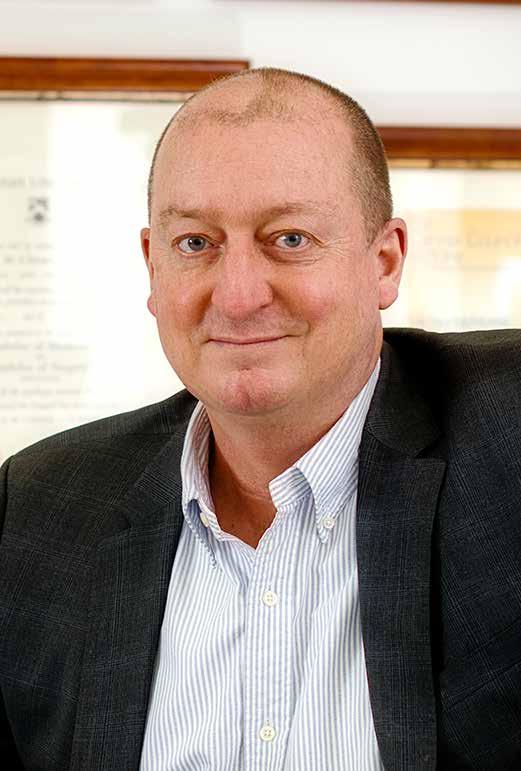
10 Publications 2 Clinical trials
36 Active projects
The department has continued to lead efforts towards patientreported outcome measures (PROMs) for colorectal cancer.
Developed in line with standards set by the International Consortium of Health Outcomes Measurement (ICHOM), these PROMs respond to growing evidence suggesting that the physical and psychological needs of patients remain unmet, despite greater emphasis on their quality-of-life through improved treatment options.
To validate PROMs, a retrospective analysis of 512 patients undergoing colorectal surgery at Cabrini Health was conducted, revealing notable differences in how patients viewed their postoperative outcomes. Incorporating symptomatic, physical, and psychological metrics, results from the study indicated a strong correlation between patient responses and the type of surgery performed.
The ability to identify nuanced differences across patient groups reinforces the important role PROMs can play when properly integrated into routine care. Capturing otherwise overlooked information, they allow clinicians to deliver timely interventions aligned to the precise needs of individual patients.
As the department oversees their continued adoption, PROMs will serve as vital tools that not only enhance immediate treatment outcomes, but also long-term patient satisfaction and recovery, setting new benchmarks for holistic and compassionate colorectal cancer care.
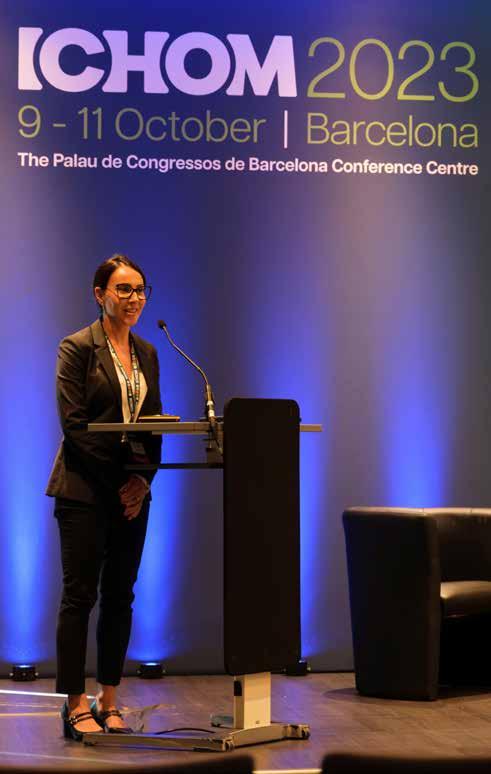
As personalised medicine grows in prominence, the department has sought to better understand and develop suitable interventions for varying types of colorectal cancer.
Cross-departmental research with Cabrini Biostatistics led by Associate Professor Mohammad Asghari-Jafarabadi, has uncovered distinct differences based upon the location of tumours, including critical factors influencing patient survival.
Published in Scientific Reports, the study revealed that patients with right-sided colorectal cancer experienced higher mortality rates and relapse than those with left-sided tumours across all stages of cancer progression. Furthermore, patient characteristics such as age, body mass index, and comorbidities were found to impact survival outcomes more than previously thought.
These findings show the necessity of personalised treatment approaches by recognising right- and left-sided colorectal cancer as distinct entities both biologically and clinically. Doing so will enable clinicians and patients to reach more comprehensive conclusions and subsequently informed decisions so as to develop treatment strategies better aligned with individual needs.
For the healthcare system more broadly, enhanced disease stratification allows for targeted, evidence-based policies to address the projected increase in colorectal cancer incidence and prevalence over the coming decades.
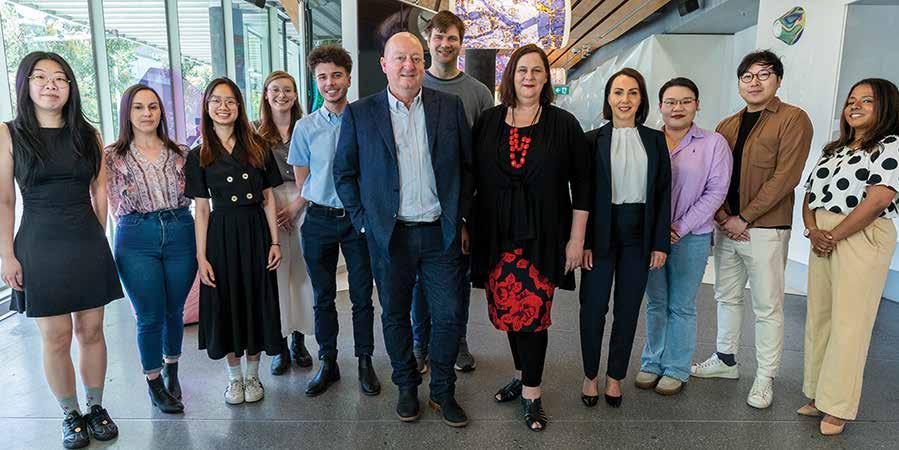
Though patient management strategies are widely assumed to be pivotal in enhancing surgical outcomes, the specific measures most effective for different patient groups remain largely undefined.
Over the past year, results from two department-led projects were published providing new insights that may begin to bridge this knowledge gap.
The first of these studies found that anastomotic leaks –complications where surgical connections fail to properly seal – occurred in 3.75 per cent of 693 rectal cancer patients treated at Cabrini, Alfred, and The Avenue Hospitals. It was observed that due to difficulties in detecting these leaks promptly, interventions were often delayed, leading to substantially poorer patient outcomes and highlighting the importance of enhanced monitoring protocols.
Additionally, an analysis of 832 colorectal cancer patients over the age of 80 demonstrated the safety and effectiveness of surgery for short- to long-term outcomes. While running counter to consensus views that the risks of surgery outweigh their clinical benefits, the study did reveal an elevated frequency of complications in older patients, many of which could be reduced through multidisciplinary clinical teams both during and after treatment.
Though further research is needed for these findings to inform clinical practice guidelines, they nevertheless underscore the dynamic ways in which postoperative patient management must be implemented to ensure that colorectal cancer care is appropriately delivered across diverse patient populations.

Over $1.3 million has been secured through the 2024 NHMRC Ideas Grant round for research led by Associate Professor Anne Fletcher, who will be supported by Dr Simon Wilkins from the department. The collaborative study conducted through the Stromal Immunology Laboratory at the Monash Biomedicine Discovery Institute will seek to understand why checkpoint inhibitor therapies are ineffective in over 95 per cent of all colorectal cancer patients, despite demonstrating promise for other cancer types.
Established to accelerate innovative projects from early- and mid-career researchers, the Ideas Grant will allow the research team to build upon previous work exploring the unique tumour-supportive microenvironment found in colorectal cancer. It is hoped that this will ultimately lead to the identification of biological mechanisms responsible for poor and unpredictable responses to checkpoint inhibitor therapies exhibited by colorectal cancer patients.
Dr Simon Wilkins (left) and Associate Professor Anne Fletcher will seek to understand the underlying causes of checkpoint inhibitor ineffectiveness for colorectal cancer, supported by an NHMRC Ideas Grant.
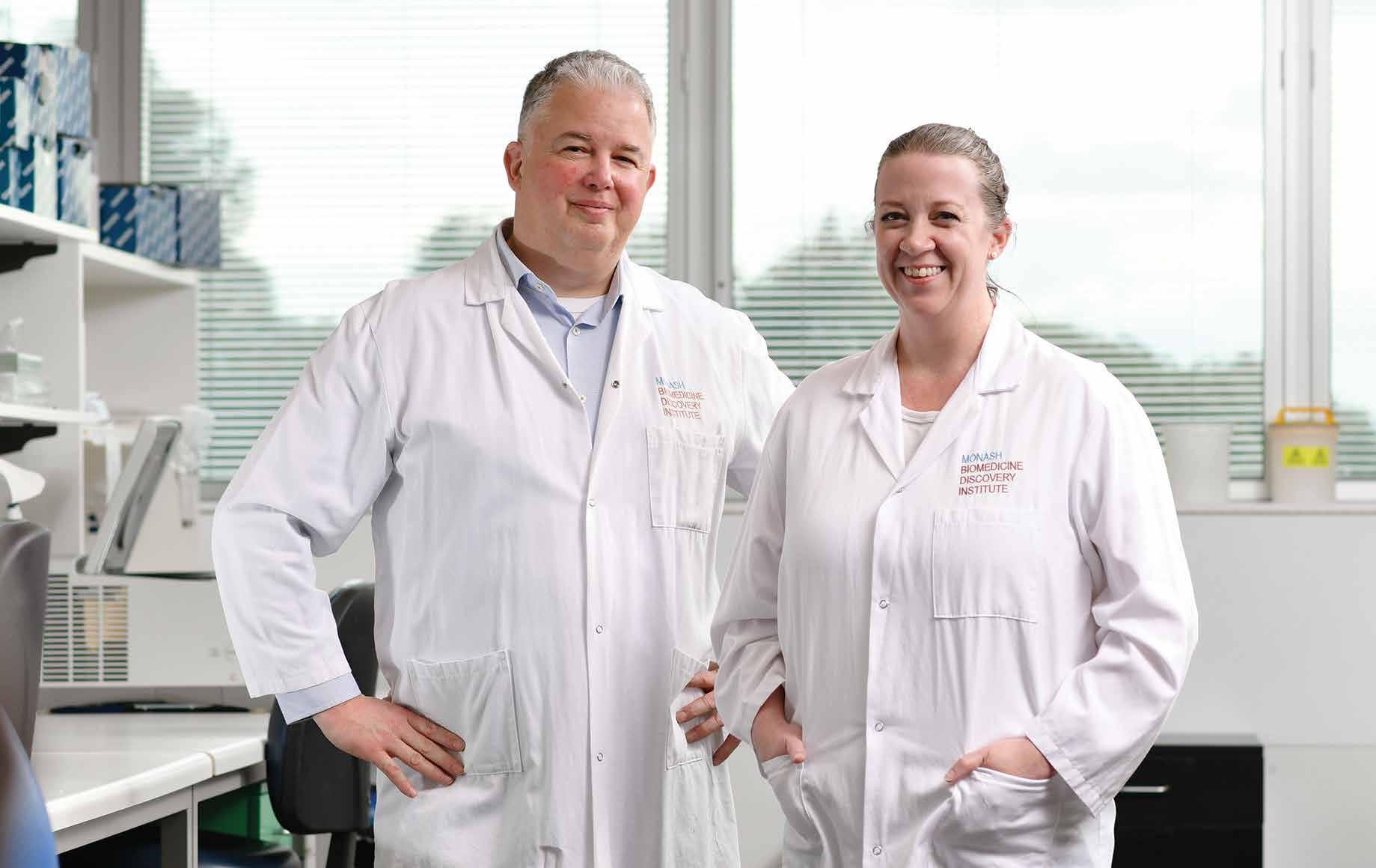
As we enter our third year, the Department of Cardiology Research has further established itself as a critical bridge that connects cardiovascular research to clinical services at Cabrini. This is reflected in the remarkable growth seen in our research output, with publications increasing from just one in 2020 to 27 in 2023-24.
This rise has coincided with an expanding portfolio covering diverse areas of research. Amongst these include cardiac procedural innovations by Professor Dion Stub, comprehensive approaches to atrial fibrillation (AF) under Professor Peter Kistler and Associate Professor Alex Voskoboinik, global clinical trials led by Dr Swati Mukherjee, and advanced nuclear diagnostics through my work with the International Atomic Energy Agency.
This progress has been made possible by our Research Assistant, Romaniya Fernando, who since joining the department has been integral in coordinating our work, including clinical trials. Together with our clinician researchers, we hope to capitalise on these achievements to form an independent site for research in cardiovascular medicine, delivering clinically impactful findings for patients and their families.

Publications 9 Clinical trials 16 Active projects
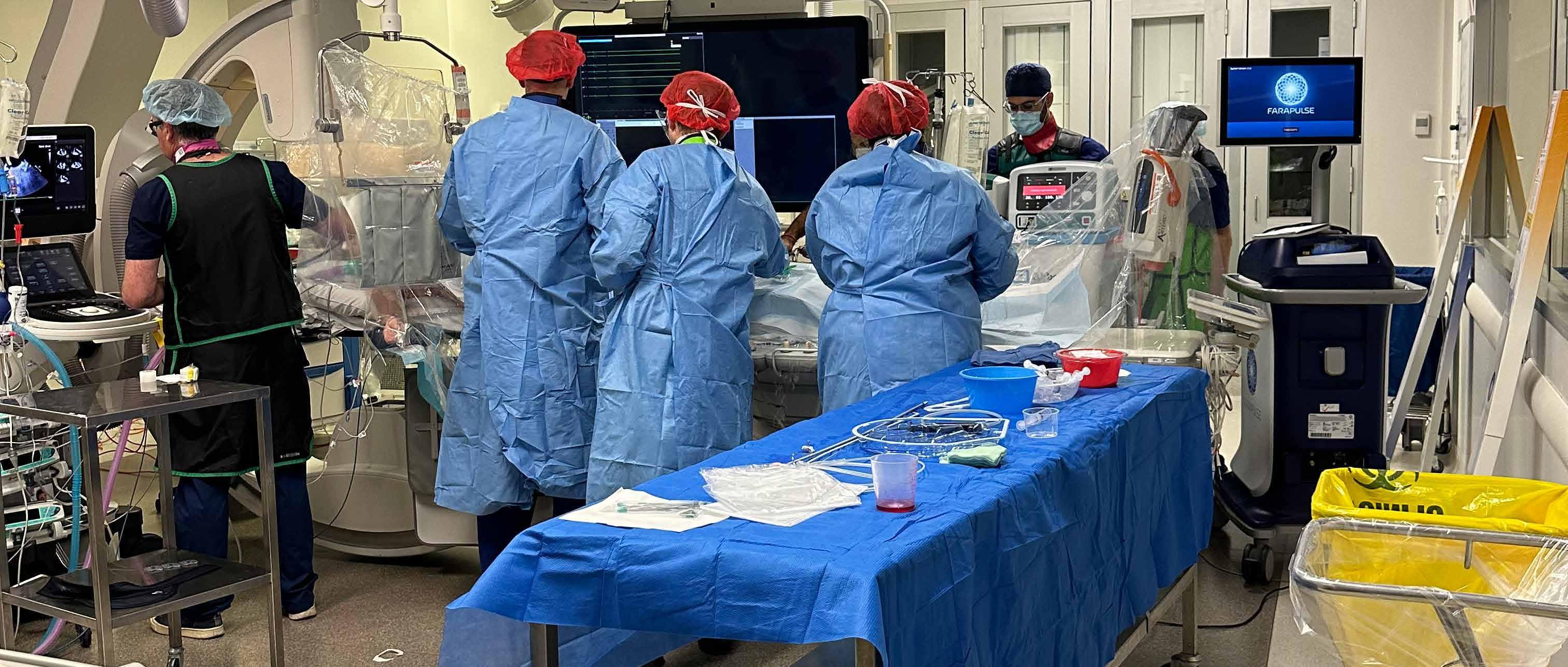
Minimally-invasive cardiac procedures are essential in improving quality-of-life outcomes, reducing the time needed for patients to recover and return to normal life.
Transcatheter aortic valve implantation (TAVI) has rapidly emerged as one pioneering example, adopted in widely ranging clinical settings and undergoing significant technical enhancements since receiving regulatory approval in 2011.
Professor Dion Stub is globally recognised for both his scientific and clinical contributions in advancing TAVI, having led numerous studies aimed at improving not only its safety and efficacy, but also its equitable accessibility for patients. The ACE-PROTAVI trial forms a notable component of this work, conducted across Cabrini, Alfred, and Epworth Hospitals over 18 months and published in JAMA Cardiology this year.
Findings from the study demonstrated improved and faster bleeding control in patients receiving protamine, a pharmaceutical that reverses blood thinners, following TAVI. They also showed protamine’s ability to reduce complications, procedure times, and hospitalisations, providing supportive evidence for its integration into standard clinical protocols for TAVI.
As this minimally invasive procedure expands and is made available for lower-risk or highly complex cardiac conditions, research like ACE-PROTAVI will be of increasing importance if the needs of a larger and more diverse patient population are to be met.
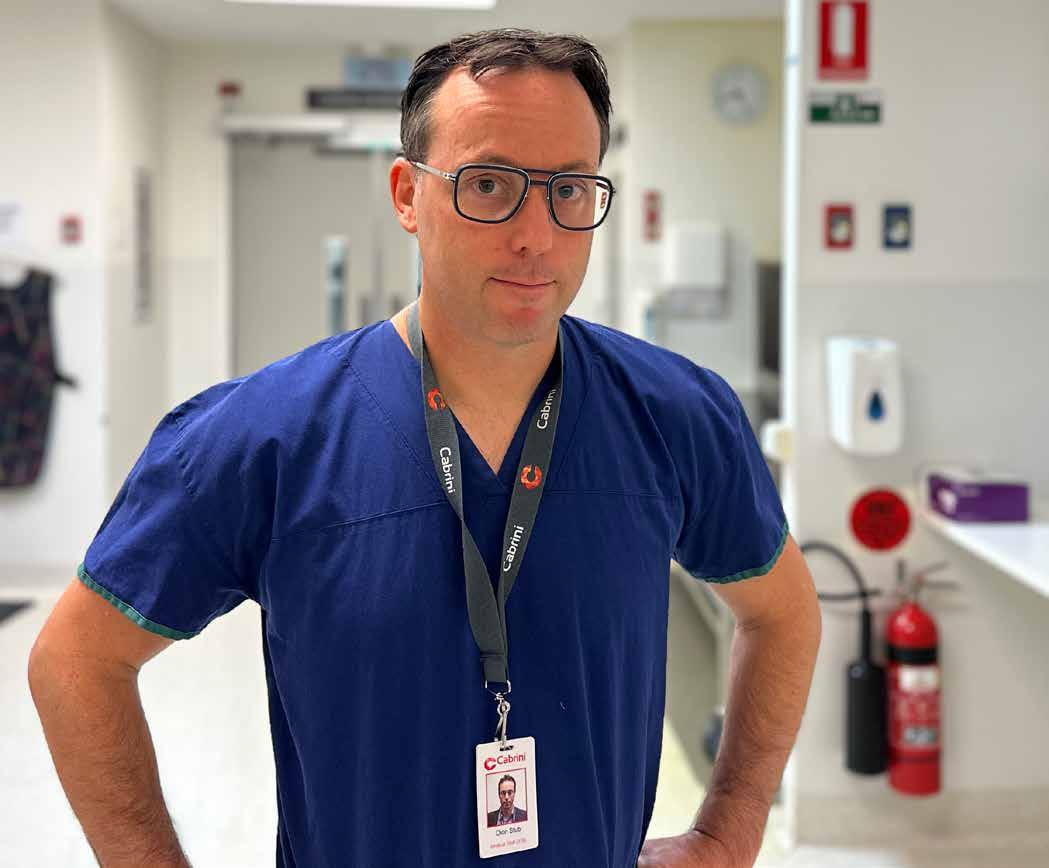
Catheter ablation burns or freezes heart cells to create minute scars, disrupting electrical signals that cause irregular heart rhythm, or AF.
Though conventional ablation methods have focused on restricting these abnormal electrical signals to the pulmonary veins, additional isolation of the heart’s posterior wall has gained in clinical acceptance due to its ability to minimise complications and repeat procedures. Despite its effectiveness, concerns remain over the safety of this approach, which has been linked to elevated rates of left atrial flutter, another heart rhythm irregularity.
In collaboration with 11 hospitals, universities, and medical research institutes located throughout greater Melbourne, department researchers led by Professor Peter Kistler conducted a large-scale multi-site trial aimed at measuring this risk. In addressing a critical gap in the treatment of AF, the study showed that while the occurrences of left atrial flutter rose, the overall risk presented by additional isolation of the posterior wall remained low.
Published in JAMA, JAMA Cardiology, and JACC Clinical Electrophysiology, these findings offer critical information for patients and clinicians to reach informed decisions over which catheter ablation intervention to choose, appropriately balancing the effectiveness of treatment options against safety considerations.
Professor Peter Kistler has led a consortium of 11 organisations to reach critical new findings on the actual risk posed by catheter ablation methods.
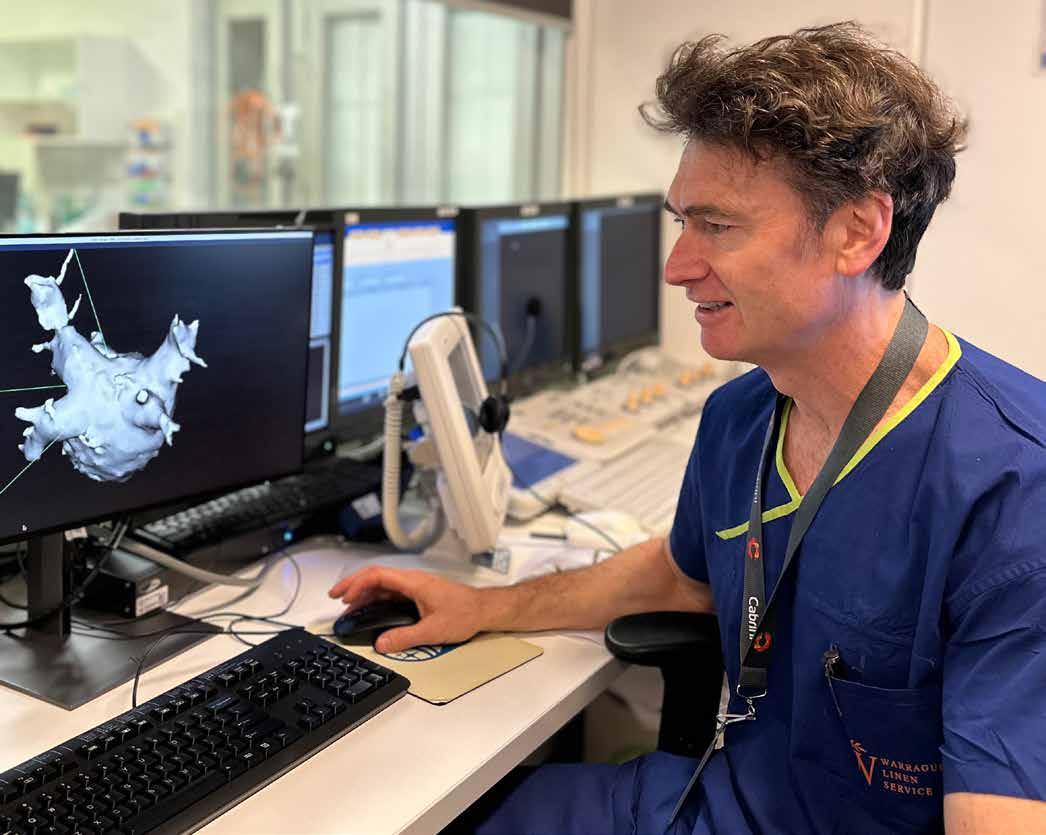
OCEANIC-AF was a phase III clinical trial evaluating asundexian, an anticoagulant pharmaceutical, for the prevention of stroke in high-risk patients with AF.
Cabrini was one of 32 Australian sites to participate in the study, overseen by Dr Swati Mukherjee (right) and Professor Nathan Better. Despite showing initial promise, OCEANIC-AF was terminated in November 2023 following an interim analysis that found asundexian to be less efficacious in preventing stroke when compared to apixaban, a regulatory approved anticoagulant.
Despite not meeting its primary objectives, the study did reveal fewer associated major bleeding events in patients receiving asundexian. Such vital information will help guide other trials within the OCEANIC program, including OCEANIC-STROKE, currently assessing asundexian in the prevention of repeat ischemic stroke. Moreover, the study could also provide critical lessons for ongoing research and development, potentially replicating the lasting impact of the TORCH study, which went on to directly influence two further studies, ETHOS and IMPACT, since its termination in 2007.
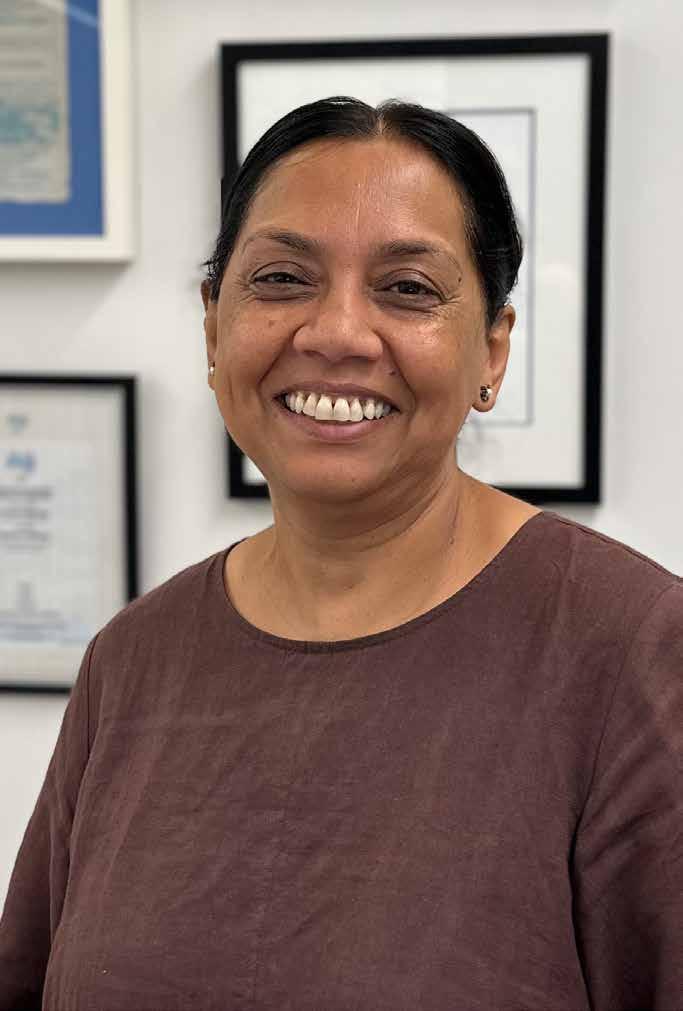

Since joining in 2023, Ms Romaniya Fernando has been an integral member of the Department of Cardiology Research. In her role as Research Assistant, she coordinates projects and trials, supporting principal investigators as they reach critical findings across both cardiovascular health and disease. The following profile highlights Ms Fernando’s journey and her contributions to the department.
Ms Fernando first trained as a physiotherapist in Sri Lanka where her clinical interest in cardiology began through her work in cardiac rehabilitation and paediatrics. However, it was after joining the Sri Lanka Cerebral Palsy Register that, “my passion for research was ignited, and later when I was a Research Assistant at the Royal Children’s Hospital, Melbourne.”
Across both institutions, Ms Fernando was involved in research examining paediatric neurodevelopmental disorders and disabilities, published in globally leading journals including The Lancet and BMJ. Seeking to pursue both her interests in research and cardiac rehabilitation, she joined the Department of Cardiology Research at Cabrini in early 2023.
As Research Assistant, she has played a vital part in each study undertaken within the department, including clinical trials, where she oversees patient recruitment, data collection, and trial management. Involved in up to 14 different studies at any one time, “I quickly learnt the importance of stamina, attention to detail, and extremely good time management, [along] with a willingness to remain good natured and flexible when engaging different hospital departments at Cabrini and externally.”
According to Professor Nathan Better, Academic Director of the department, “our growth is tied to the tireless commitment Romaniya has shown since joining our team and I look forward to many more years working with Romaniya to build what we have started together at Cabrini.”
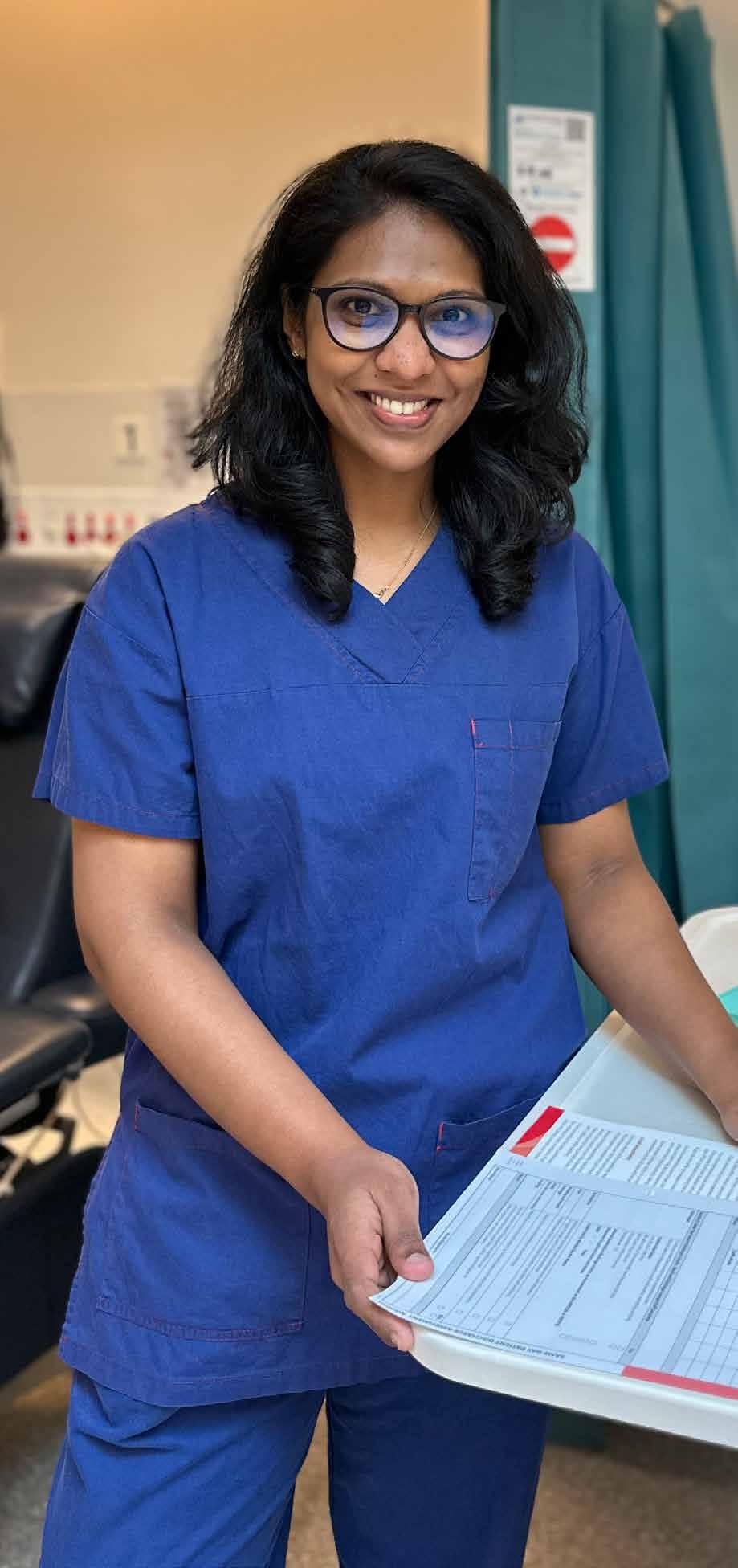
Fernando has been central to the rapid growth of the Department, bringing a unique combination of clinical and research expertise.
We have maintained our commitment to clinically aligned research throughout 2023-24, leading projects that best meet the needs of patients and the services they receive through the intensive care unit (ICU) at Cabrini Malvern. One notable change has been our renaming to the Department of Critical Care and Anaesthesia Research, reflecting our growth and focus on the field of anaesthesiology.
Over the past 12 months, our partnership with the Department of Nursing Research has led to important discoveries in hospital-acquired infections, including the previously unknown resilience of certain pathogens that were found to survive for several months. Alongside this, we have collaboratively recruited for the CALIPSO study, which seeks to optimise antibiotic usage to meet the growing challenge of antimicrobial resistance in ICU settings.
We have also explored a number of areas that remain critically under-studied, including the ethical complexities involved in disclosing clinical errors and the consequences posed by declining admission rates to the ICU. Led by Associate Professor Steve Philpot, this research is part of our broader effort to balance shortand long-term patient outcomes during clinical decision-making in critical care situations.
Developing and advocating for improved models of intensive care will remain a key priority for the department. We continue to incorporate better education and support mechanisms for a more resilient clinical workforce at Cabrini, informing best practice for ICUs across Australia.
Professor David Brewster Head, Department of Critical Care and Anaesthesia Research
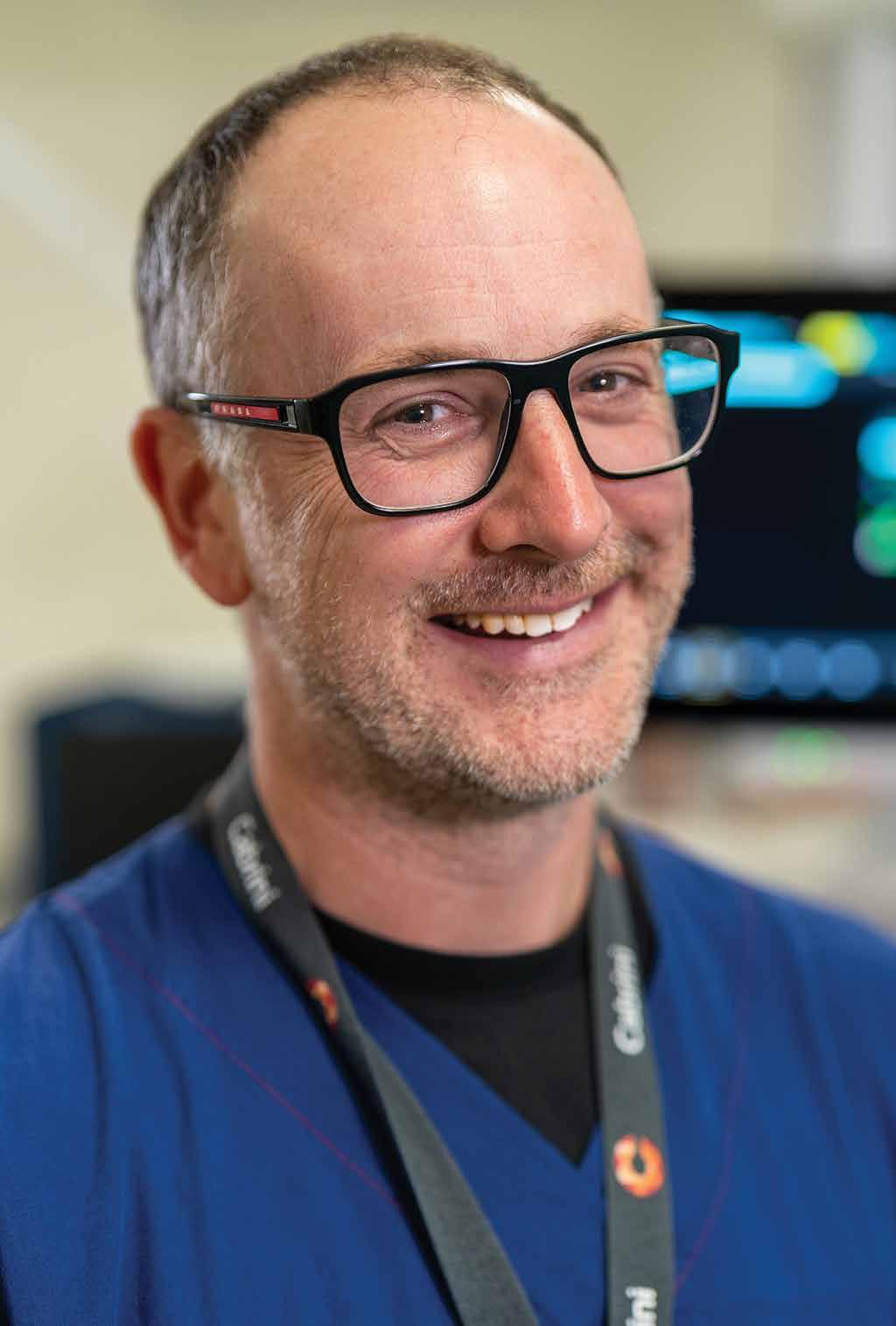
13 Publications
4 Clinical trials
13 Active projects
Though the importance of red blood cell transfusions is universally understood, there is limited evidence indicating what threshold levels of haemoglobin – proteins responsible for oxygen delivery – are appropriate to warrant their administration.
As part of the inPUT study group, the department has taken part in a global effort to bridge this knowledge gap by investigating transfusion practices in 233 ICUs across 30 countries.
In November of last year, results from the landmark study were published in JAMA and found that:
• 25 per cent of the 3643-patient cohort received one or more transfusions during hospitalisation;
• transfusion rates ranged from 0-100 per cent and 0-80 per cent across individual ICUs and countries respectively; and
• 81 per cent of transfusions were administered when haemoglobin rates were below the study’s predefined threshold (8g/dL), with North America and Europe exhibiting the highest proportion of transfusions administered at these restrictive rates.
The high variability in both administration rates and clinical practice indicate a need for evidence-based clinical guideline revisions that recommend transfusions once lower haemoglobin levels are reached. The value of this restrictive approach is further supported by global blood supply scarcities, transfusionrelated complications, and chronic disease burdens, which are projected to rise over the next several decades.
Communicating the safety of restrictive transfusion practices to both patients and clinicians will be central in meeting this complex challenge. Doing so will require data, as generated by the inPUT study, which will ensure the development of standardised and feasible transfusion guidelines that meet the highest possible standards of clinical care.
Over recent years, the department has continued to pursue its globally recognised work on patient airway management in intensive care settings.
Having reached critical findings that led to the U.S. Food and Drug Administration’s decision to revoke its approval for the use of aerosol boxes in emergency SARS-CoV-2 situations, further progress has been made through a number of interdisciplinary collaborations.
This includes STARGATE, which recently completed recruitment at Cabrini, the national lead site for Australia and New Zealand and overseen by Professor David Brewster, who sits on the study’s International Steering Committee. Currently awaiting recruitment to finalise across the more than 200 participating hospitals, the department will play a key role in better understanding adverse side-effects resulting from advanced airway management interventions in patients under general anaesthesia.
Additionally, the department is currently designing an extension to last year’s investigation into leadership dynamics during airway management episodes for critically ill patients undergoing intubation for SARS-CoV-2. The project will build upon the previous ethnographic method by incorporating a broader range of variables, yielding observations that will allow clinical approaches to be optimised.
Members of the renamed Department of Critical Care and Anaesthesia Research: Associate Professor Vineet Sarode, Lisa Dougherty, and Professor David Brewster (left to right).
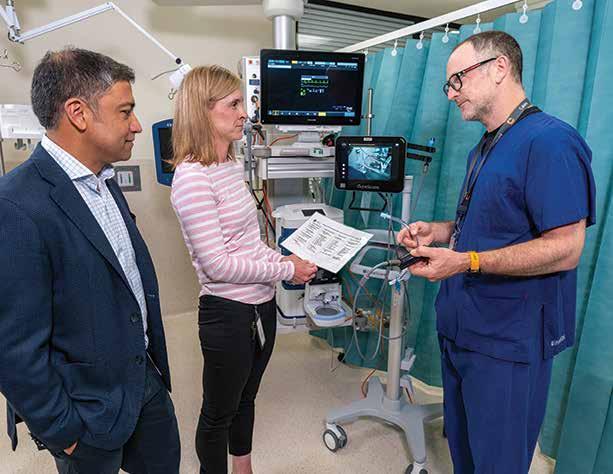
The past year saw the Department of Urology make notable progress towards its core aim to reduce the burden of care for patients with prostate cancer.
Associate Professor Weranja Ranasinghe joined the department in June this year as Deputy Academic Director of Urology, while continuing on as Clinical Head of Urologic Oncologic Surgery at Monash Health and Deputy Leader for the USANZ Genitourinary Oncology Special Advisory Group. His addition furthers our priorities in translational research, while also strengthening our ongoing efforts towards improved postoperative patient management.
Additionally, Dr Darren Lam commenced his tenure with us as Research Fellow, building on the contributions of Dr Yen Lim, who will remain closely involved with the department while she undertakes surgical training at Monash Health. Dr Lam will be involved across the department’s existing projects, while leading research investigating low-grade atypical small acinar proliferation (ASAP) prostate cancer over the remainder of his fellowship.
Ashley Baring has also been recruited as Research Assistant to help drive our expanding portfolio, providing support in data management and analysis. The growing team reflects one of our core priorities to build both clinical and research capacity within the field of urology, made possible through the continued support of the Pratt Foundation and the countless donors, advocates, and collaborators we work with in efforts against prostate cancer.
Professor Mark Frydenberg AM Academic Director, Department of Urology

12 Publications 8 Clinical trials
12 Active projects
The department continues to optimise irreversible electroporation (IRE) techniques for focal therapy, performed on the NanoKnife System acquired by Cabrini in 2022.
This minimally invasive surgical method offers significant therapeutic advantages over conventional heat-based methods by using targeted electric fields to permanently destroy cancer cells with minimal harm to healthy tissue.
Despite its effectiveness, focal therapy remains limited to those men with truly unifocal prostate cancer, confirmed by diagnostic imaging and tissue biopsy. To address this, Professor Mark Frydenberg, Dr Darren Lam, and Dr Yen Lim, alongside urologists at Cabrini Health, are developing evidence-based clinical protocols and machine learning models to enhance patient selection for this innovative surgical intervention.
Currently, vast volumes of clinical information are being collected and analysed to establish a highquality reference dataset that will support these research outcomes.
The Cabrini Nanoknife Database will connect to a multi-site national registry for IRE, capturing patient outcomes over time to facilitate early detection of relapse or recurrence and subsequently, timely re-intervention.
Such enhanced detection is crucial for focal therapy given the increased risk of relapse and recurrence, resulting from its highly targeted and minimally invasive approach. Efforts to realise this are part of the department’s broader medical leadership, which has led to the formation of a national advisory group on the adoption of focal therapy in Australia.
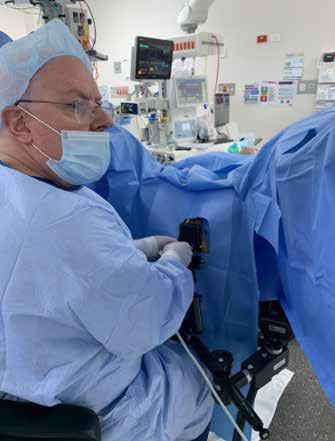
New advanced imaging techniques consolidate therapeutic and diagnostic techniques to unlock personalised care for prostate cancer patients, reducing impact on their quality-oflife.
For several years, the department has progressed this clinical approach by exploring the combined use of mpMRI and 68Ga-PSMA PET/CT to accurately detect and locate prostate cancer recurrence, closely guiding targeted radiotherapies to deliver secondary treatment.
Three separate clinical trials – Primary2, PIAS, and UpFrontPSMA – will evaluate these advanced imaging techniques. Over the previous year, patient recruitment has been successful, allowing commencement of these studies through a collaboration
involving Monash Health, the Peter MacCallum Cancer Centre, St Vincent’s Hospital Sydney and Cabrini Health.
Additionally, the department has continued to develop new theranostic opportunities with its long-standing industry partner, GenesisCare, with artificial intelligence emerging as an exciting new area of research, currently centred around a prostate test from ArteraAI.
Involving the analysis of biopsy images and clinical information to predict treatment outcomes, this platform will support clinicians to develop more precise treatment strategies, aligned with the unique needs of each patient.
The upper panel includes post-therapy imaging following an initial cycle of Lu-PSMA and shows prominent metastatic lesions. The lower panel, acquired after a second dose, reveals substantial reductions in those lesions, indicating a marked therapeutic response.
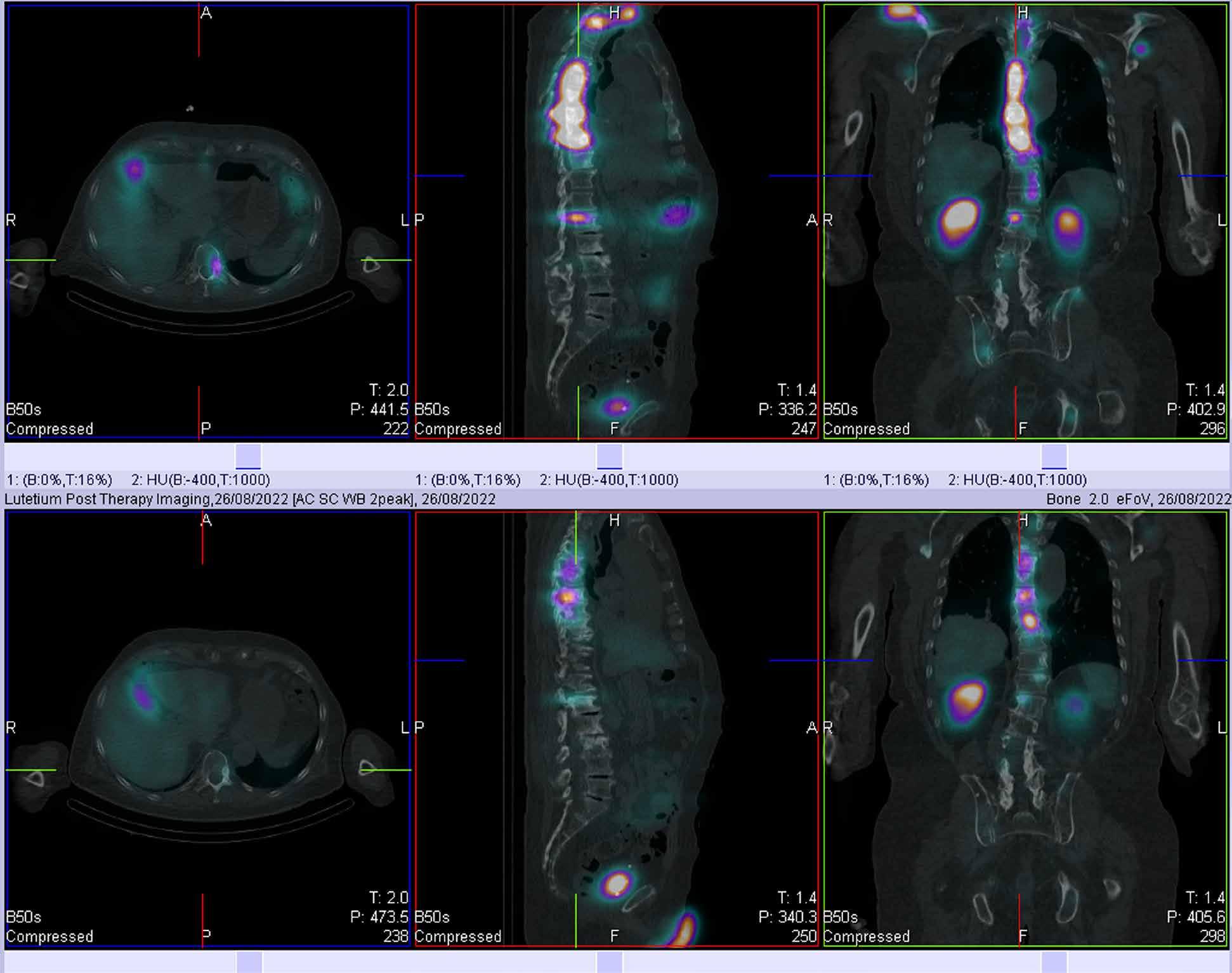

Australia faces a critical shortage of specialist urologists, particularly in underserved and geographically remote communities.
These vulnerabilities in the healthcare system are expected to worsen over the next decade, attributed to the high number of senior urologists nearing retirement and greater work-life balance expectations.
In response to this challenge, the department has committed resources to build increased workforce capacity, developing a training framework that ensures surgical proficiency while fostering the research and clinical skills needed to meet future patient needs. Complementing this, greater opportunities will be made available to early-career clinicians through fellowships within the department, with Dr Yen Lim joining as the inaugural Research Fellow of this new initiative in 2023.
Throughout her fellowship, Dr Lim has set standards of both clinical and research excellence.
Awarded the Robbie Roberts Best Registrar Presentation Award at the USANZ Tasmanian Section Meeting, she also secured one of 11 Monash Health Emerging Researcher Fellowships to investigate a novel biopsy technique requiring only local, not general, anaesthesia. This was followed by the Marshall Prize in Surgical Training, which will allow Dr Lim to continue this research and potentially unlock a faster and less invasive diagnostic approach to prostate cancer.

Professor Mark Frydenberg AM has been awarded the Urological Society of Australia and New Zealand (USANZ) Medal for his service and leadership to the field of urology.
Presented at the 75th USANZ Annual Scientific Meeting in February, the medal recognises contributions made over several years and is amongst the highest honours bestowed by the Society.
Known for his work in developing and advocating patientcentred models of prostate cancer care, Professor Frydenberg is currently Academic Director of the Department of Urology at Cabrini, Clinical Director of the Prostate Cancer Research Group at Monash University, and Chair of the Health Policy and Advocacy Committee within the Royal Australasian College of Surgeons. He has held numerous leadership roles in both a clinical and research capacity, including as President of USANZ, and was made a Member of the Order of Australia for services to medicine in 2016.
Over the year, the research team delivered 37 conference presentations across a diversity of topics spanning neurodevelopmental, eating, and complex post-traumatic stress disorders, and their intersection with women’s mental health.
Amongst these, highlights included:
• A conversation between activist Grace Tame and Professor Jayashri Kulkarni AM;
• A discussion on the Federal Senate Inquiry into menopause and perimenopauserelated issues from Senator Larissa Waters; and
• Updates on innovations reached by HER Centre Australia by Associate Professor Caroline Gurvich, Professor Kulkarni, and Dr Eveline Mu.
Such events provide an invaluable platform for learning, networking, and knowledge exchange, representing the centre’s leadership of the broader sector. Moreover, they provide the foundations for future collaboration, accelerating research pathways towards clinical solutions that improve women’s mental health.
Professor Jayashri Kulkarni AM Director, HER Centre Australia

12
Publications 1 Clinical trial
In 2024, HER Centre Australia hosted the second Asia-Pacific Conference on Women’s Mental Health in Melbourne, centred upon the theme, “Boundless: Redefining the Future of Women’s Mental Health.”
The conference attracted a total of 263 attendees, who were joined by exhibitors, speakers, and researchers from HER Centre Australia to form a multidisciplinary delegation for the two-day event. The opening session of the conference was marked by an address from lived experience consultant, Ms Kate Tognarini, followed by a welcome from the Honourable Ingrid Stitt MP, Minister for Mental Health. The keynote address was delivered by Lisa Thurin, Director of the Gandel Foundation, which helped realise the establishment of the first private women’s-only mental health hospital in Australia at Cabrini.

Led by Associate Professor Caroline Gurvich, COGtrain is a novel cognitive training program that aims to improve and optimise cognitive functioning in women with complex trauma, depression, anxiety or burnout.
Many of these women have significant difficulties with cognitive processes, such as concentration, decision-making, and memory, which can significantly impact an individual’s ability to lead a meaningful life.
Involving an eight-week outpatient group therapy program, COGtrain employs psychoeducational tools on cognition and cognitive symptoms experienced during mental health declines, as well as education of the role hormonal fluctuations can play.
Each session covers different aspects of cognitive function and outlines compensatory strategies that empower participants to build the skills necessary for greater resilience.
Over the past year, clinical trials for COGtrain have continued through a collaboration between HER Centre Australia and the Lisa Thurin Women’s Centre at Cabrini Elsternwick. This study will seek to evaluate the efficacy and patient satisfaction of the program’s intervention, with completion expected in 2025, establishing feasibility and acceptability for future larger-scale studies.
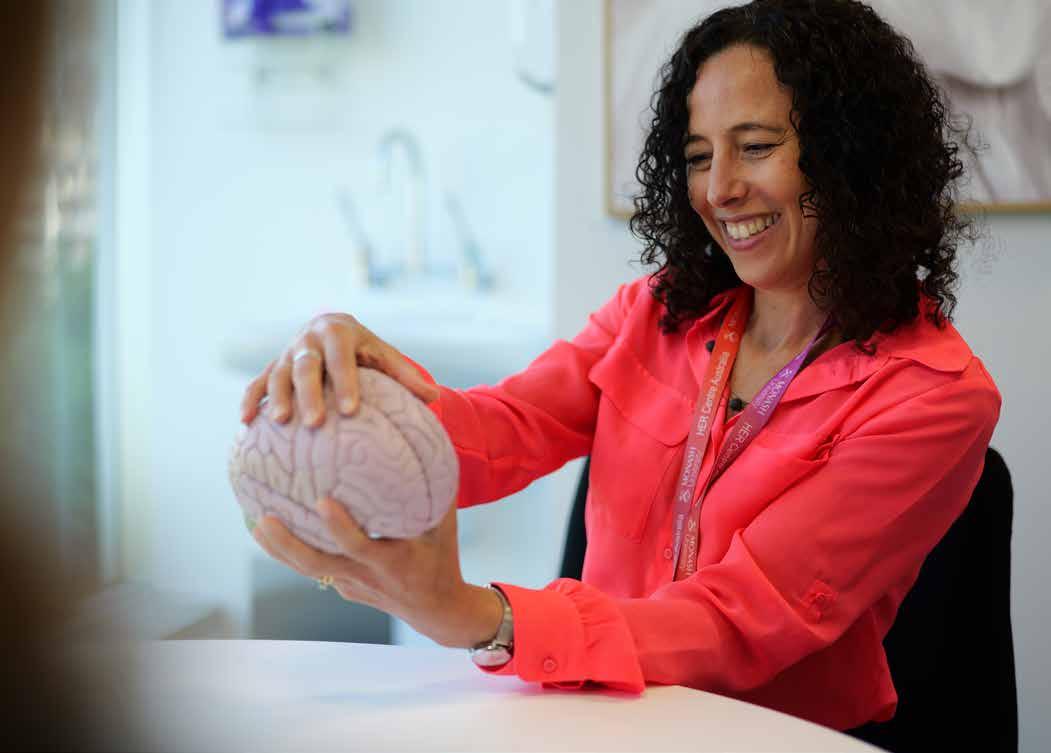
While an endowed chair is the highest honour for any academic, its impact moves beyond any one individual, allowing a department to not only further their existing research but also explore opportunities previously out of reach. The bequest left by Neil Beauglehall and his family exemplifies this, growing our capacity towards new pathways for discovery in cancer research.
Recognising this contribution to our work, the decision was made to formally dedicate the department as the Neil Beauglehall Department of Medical Oncology Research, representing an important moment in our 23-year history. Over this period, we have enhanced prevention for hereditary cancers with the Cabrini Family Cancer Clinic, helped establish the Cabrini Cancer Institute to expand access to clinical trials, and conducted pioneering translational research through our ongoing partnership with the Monash Biomedicine Discovery Institute.
Transitioning to this new name also signals a critical step for our future. We are currently working to deliver comprehensive genomic profiling to cancer patients across south-east Victoria, made possible through a transformative investment in precision oncology made by the PMF Foundation earlier this year. Additionally, our nationally leading organoid program has expanded to include ovarian cancer, leveraging the techniques and expertise accumulated while generating our collection of breast cancer organoids.
This work will be driven by our team of researchers, who have been joined by Dr Sylvia Mahara, following roles with internationally recognised organisations, including the Genome Institute of Singapore, Oxford University, and the German Cancer Research Centre. Through this increased capacity, we are well-positioned to advance new diagnostic and therapeutic approaches for cancer and meet the vision Neil Beauglehall intended for the department.
Professor Gary Richardson OAM
Neil Beauglehall Endowed Chair in Medical Oncology Research

19 Publications
87 Clinical trials
25 Active projects
Structured exercise is a central component of Cabrini’s integrative approach to cancer care, enabling a more comprehensive clinical model that not only treats tumours, but patients holistically.
Complementing the work of medical oncologists, exercise enhances the effectiveness of therapies while supporting patients to complete full treatment regimens.
The past year has seen two exercise oncology trials conducted by the department, LION and ChemoFit, each exploring different delivery methods to identify approaches best suited to patient needs and outcomes.
The EXHIBIT trial will soon join these studies to investigate the role structured exercise can play in reducing the highly burdensome immune-related adverse effects, which occur in over 90 per cent of patients receiving immunotherapies for advanced melanoma.
This work is led by Associate Professor Eva Zopf, Head of the Exercise Oncology Program at the Cabrini Cancer Institute. Amongst her contributions, she has played a leading role in PREFERABLE-EFFECT, the first large-scale trial to provide compelling supportive evidence for supervised exercise in patients with metastatic breast cancer. Published in Nature Medicine earlier this year, the study reflects the growing significance of exercise oncology and the need for its inclusion in cancer clinical guidelines and healthcare policy in Australia.
Patients engaging in exercise interventions, a growing component of integrative models of cancer care.
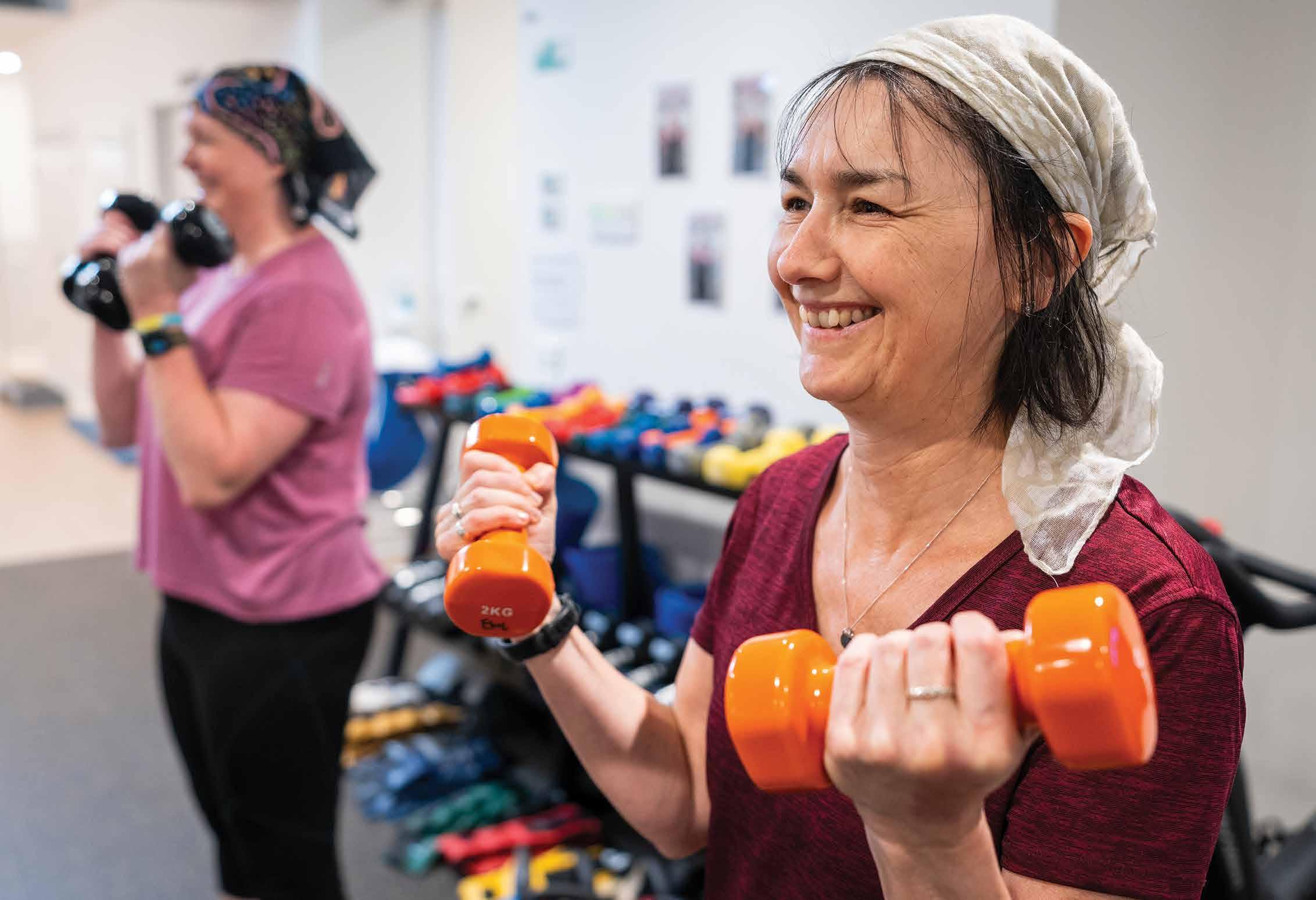
Breakthroughs in immunotherapy have unlocked new treatment approaches to cancer, activating the immune system to overcome mechanisms resistant to treatment and effectively target cancer cells.
Such therapies represent a significant area of focus for the department’s drug discovery program, which collaborates with research and industry partners to conduct first-in-human clinical trials.
One notable immunotherapy is muzastotug, which employs SAFEbody technology to bind with and deactivate CTLA-4, a critical checkpoint in the immune system frequently exploited by cancer cells to evade detection. Department-led clinical trials have found muzastotug to be safer than its predecessor, ADG116, both when administered as standalone treatment or in combination with nivolumab, a widely used immunotherapy.
While further research is needed to progress muzastotug through to regulatory approval, these results are a promising new development for cancer immunotherapies and efforts to reduce the often severe adverse side-effects they cause in patients.
Furthermore, they reflect the department’s continued commitment to exploring new treatment options for future patient populations, while connecting them to patients who could benefit today.
Clinical trial participants like Ian Suttie make vital contributions in advancing investigational therapies that have the potential to transform standards of care (pictured left with his study coordinator, Dina
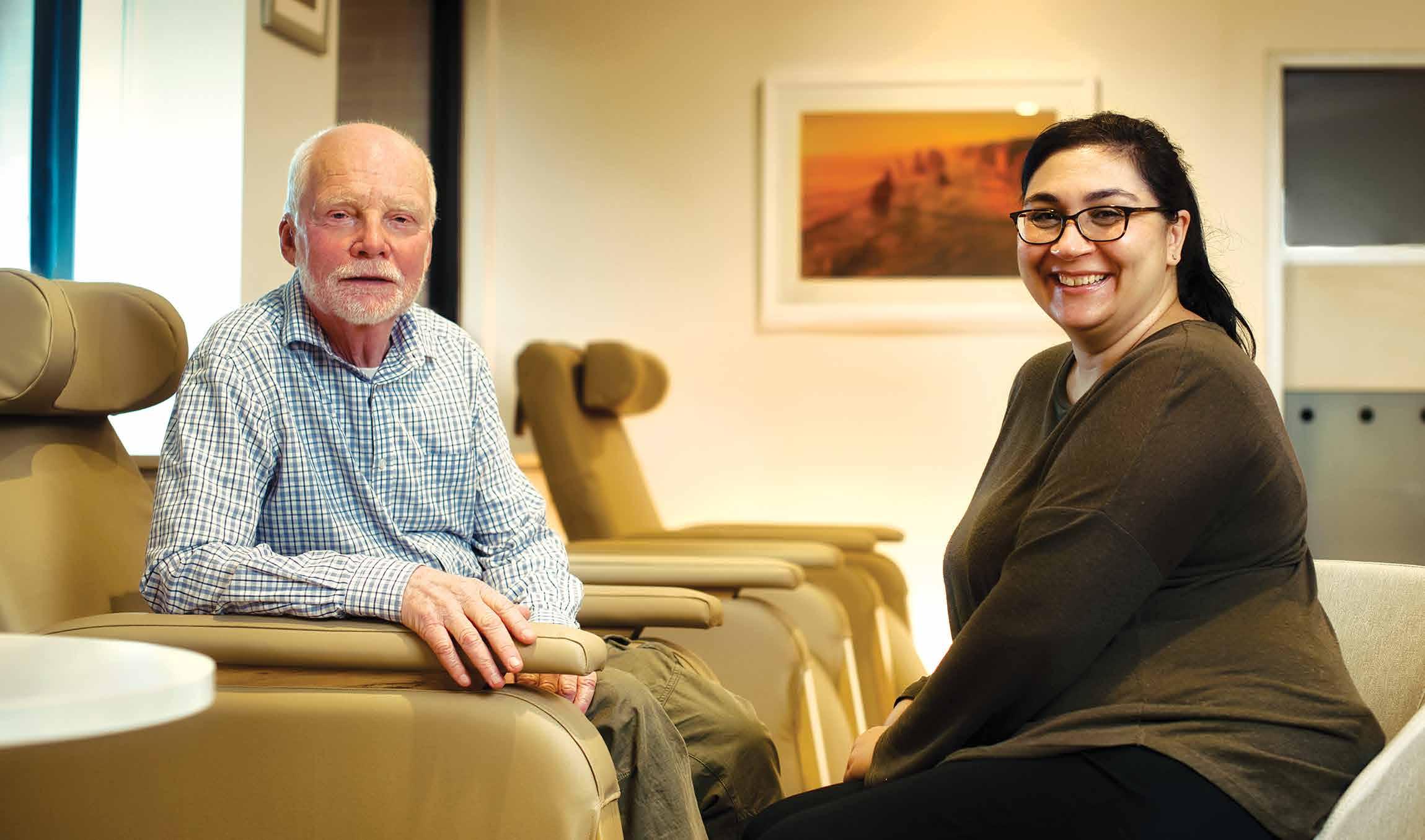
In 2021, the department founded its organoid program in partnership with laboratories at the Monash Biomedicine Discovery Institute.
Since then, it has generated a globally significant library of breast cancer organoids, generating sophisticated laboratory models that have gone on to support population drug screening, precision medicine protocols, and preclinical therapeutic development.
Over the previous 12 months, the department has sought to expand its organoid program to ovarian cancer in collaboration with the Cancer Biology and Cell Signalling Laboratory, led by Dr Antonella Papa. Currently, the experimental design of the program is being developed, drawing upon existing infrastructure and expertise in sample collection, biobanking, and organoid generation and validation. This is in preparation of a pilot study that will lead to an initial group of ovarian cancer organoids, before scaling to a more comprehensive library over the following two years.
Consolidating these organoids with patient samples, both laboratory and clinical data will establish a critical reference bioresource for ovarian cancer research.
It’s ability to accurately replicate tumour features and behaviours, while providing critical contextual information, will yield unprecedented insights into the biological complexity of ovarian cancer. Doing so could uncover reliable biomarkers for early detection, addressing the high number of late-stage diagnoses that account for a large proportion of ovarian cancer mortality.
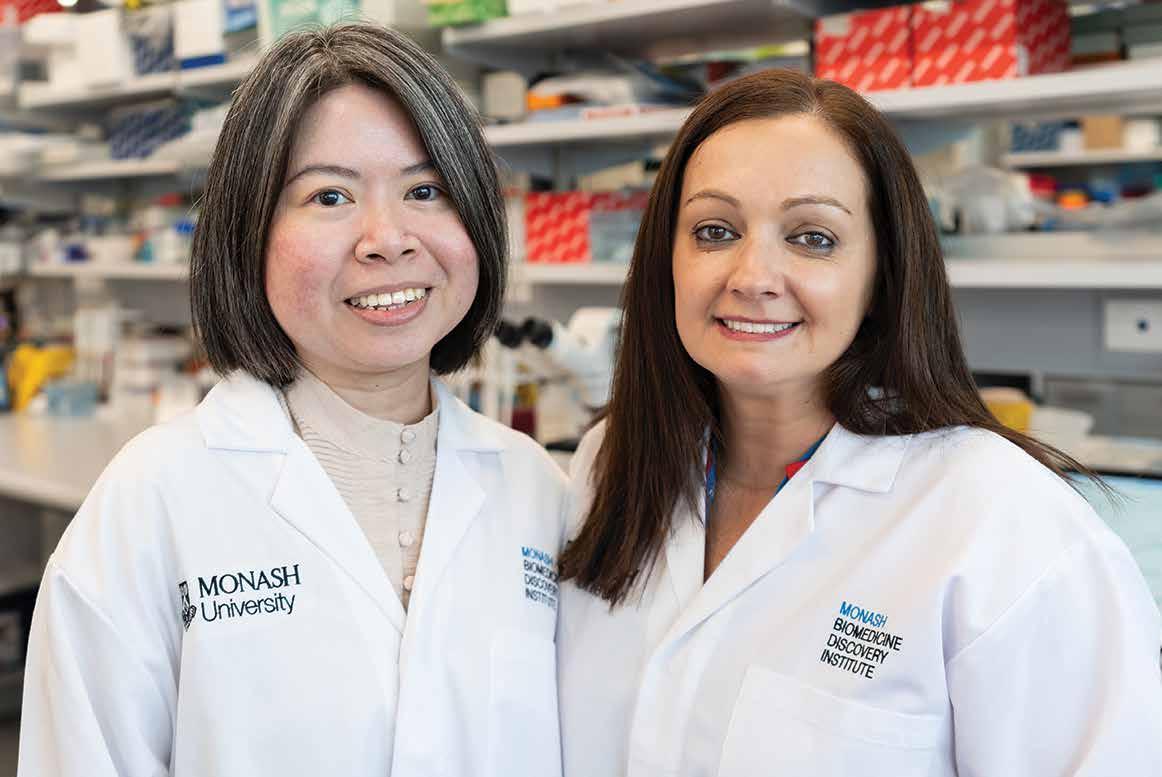
Celebrating the advances realised across the Monash Biomedicine Discovery Institute, Awards for Outstanding Achievement were announced at an annual event last December.
Amongst the recipients was Associate Professor David Pook, who as part of the Prostate Cancer Research Group was presented with the Clinical Engagement and Translational Award.

Driven by a desire for more compassionate postmortem tissue collection, the Group developed a novel workflow whereby tumours are collected with a biopsy needle immediately upon a donor’s death. These samples are then grafted into immunocompromised mice, with those demonstrating sufficient tumour growth regrafted into other mice, establishing a renewable series of patient-derived xenografts.
Considered an important innovation in postmortem sample collection and storage, this research was also recognised during the 2023 Cabrini Research Forum where Associate Professor Pook was awarded the Experienced Researcher Award.
The technique has since been applied towards the Prostate Cancer Donate Program, integrating with the MURAL Collection, another product of Cabrini’s collaboration with Monash University.
Dr Sylvia Mahara (left) works with Dr Antonella Papa at the Monash Biomedicine Discovery Institute to generate organoids that accurately model ovarian cancer features and behaviours in a laboratory setting.
Palliative care has taken on greater significance in national conversations on health and aged care reform. As cancer continues to be a leading cause of death in Australia, this has underscored the importance of holistic approaches to cancer care that take into consideration the powerful psychological and emotional impact diagnoses have on patients and their families.
While any increased funding towards end-of-life care would be welcomed, it is critical that adequate patient resourcing occurs alongside health systems enhancement, ensuring support for these highly vulnerable populations. This includes allocations towards programs fostering heightened awareness and education, both within the clinical workforce and the broader community.
This is also true for patients with less advanced cancer, where psycho-existential factors are increasingly being linked to oncological outcomes. Throughout the past 12 months, we have made important contributions to this ever-growing body of evidence, including our ongoing work on demoralisation and its wide-ranging clinical presentations, which left unaddressed lead to suicidal ideation.
Committed to delivering meaningful improvements to patient lives, we have taken this knowledge base to develop preventive measures shown to effectively reduce cancerrelated mental decline. Spanning across screening, diagnosis, and treatment, these interventions are part of our broader hope for psycho-oncology, drawing us closer to a more holistic and compassionate approach to cancer.
Professor David Kissane AC Head, Szalmuk Family Psycho-Oncology Research Unit


5 Publications 2 Active projects
David Kissane
and Ingrid
sharing reflections, an important part of the psychological and emotional journey not only for cancer patients but also their caregivers.
Psychological outcomes are integral to comprehensive models of cancer care, taking diverse forms that are insufficiently captured by existing approaches.
Sleep is one such area, found to impact oncological outcomes by influencing immune function, cognitive ability, and overall quality-of-life.
This is explored in a global study outlining evidence-based recommendations for the assessment and management of insomnia in both cancer patients and survivors.
Published as a Special Article by the European Society for Medical Oncology, these clinical practice guidelines enable clinicians to regularly screen for insomnia, distinguish between episodic and persistent cases, and deliver suitable interventions, stratified by level of evidence and grade of recommendation. Notably, these guidelines are the first to promote cognitive behavioural therapy for insomnia (CBT-I) as first-line treatment, presenting a non-pharmacological approach to suboptimal sleep-related behaviours.
Representing a significant advancement for integrative cancer care, the guidelines create a framework to deliver tangible and immediate clinical benefits to patients.
As work continues to better understand CBT-I and develop preventive strategies for cancer-associated insomnia, personalised interventions will be made possible, allowing patients and clinicians to better navigate the diverse challenges associated with cancer.
The trauma of advanced cancer leads to complex psychological symptoms where patients begin questioning their sense of life and its continued value.
As ethical discussions surrounding the legalisation of euthanasia continue, interventions that restore renewed hope in patients are needed, empowering them to have full and purpose-filled lives.
Meaning and Purpose (MaP) therapy provides one potential solution, assessed in a clinical trial involving 107 patients with a prognosis of at least one year across Cabrini Health and St Vincent’s Hospital Sydney. Those receiving MaP therapy demonstrated significantly higher post-traumatic growth, with similar improvements seen in life attitude and spiritual well-being outcomes.
Demonstrating improvements to psychological and emotional resilience, the study highlights an opportunity for patients to share in meaningful lives in the face of advanced cancer. Moreover, the findings outline a feasible and scalable intervention, reinforced by the pronounced benefits experienced by patients completing all six fortnightly sessions.
Anne Johnson (facing)
Associate Nurse Unit Manager (ANUM)
of the Cabrini Day
Oncology
and Infusion Service discussing a cancer care plan with a patient.
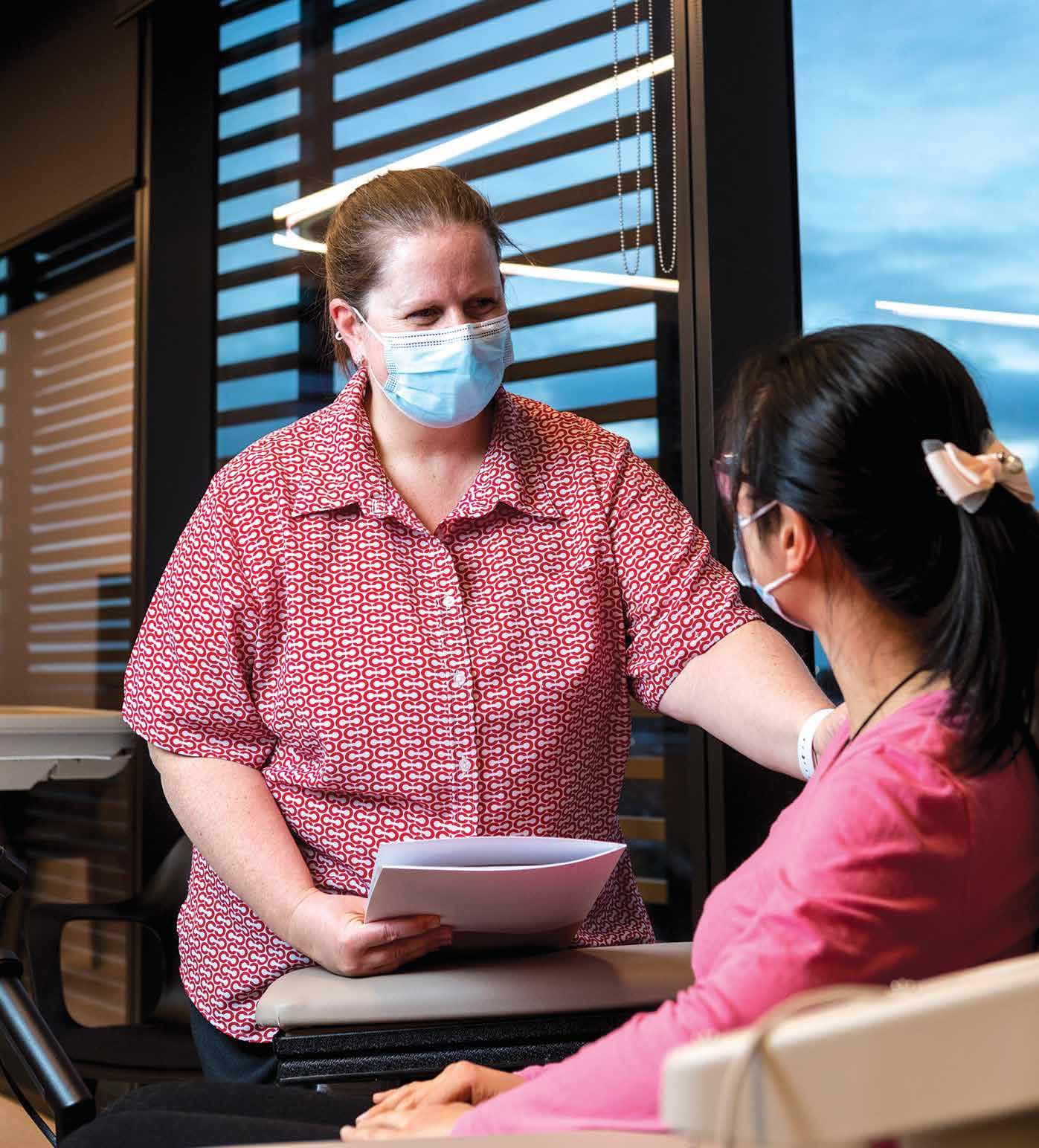
For nearly three decades, Professor David Kissane has been a global leader in the field of psycho-oncology. Having expanded the discipline at Memorial SloanKettering Cancer Center, where psycho-oncology was founded, he established the first clinical and research programs in Australia, overseeing departments across several organisations, including Cabrini.
It is through this stewardship that Professor Kissane has addressed many of the greatest challenges faced by the discipline, as reflected in his 2020 commentary on suicidality in cancer patients. Occurring at rates close to double those found in the general population, suicide continues to shape perspectives on cancer, with suicidal ideation reported in up to 17 per cent of all patients.
Echoing calls for increased awareness and clinical capacity, Professor Kissane outlines psycho-existential symptoms that may provide the basis for screening practices against cancer-associated suicide. Effectively incorporating these measures as routine care would return oncological approaches to the core principles that inspired psycho-oncology –compassionate, holistic, and informed care.
Evidence-based screening and intervention methods are able to effectively address demoralisation amongst cancer patients and reduce the high rates of suicidality that currently occur.

The following projects were approved by the Cabrini Research Governance Office over the period from 1 July 2023 to 30 June 2024.
Project title
ANAESTHETICS
Impact of anaesthesia techniques on quality indicators for cath lab patients [Clinical Audit]
Audit of the Cabrini phase 1 clinical trials program
An open-label, multiple-ascending dose, two-part dose ranging and cohort expansion study of INI4001 in patients with advanced solid tumours [INI-4001]
A phase I/II, open-label, multi-center trial of [177Lu]Lu-NeoB in combination with capecitabine in adult patients with gastrin releasing peptide receptor positive, estrogen receptor-positive, human epidermal growth receptor-2 negative metastatic breast cancer after progression on previous endocrine therapy in combination with a CDK4/6 inhibitor [CAAA603D12101 (NeoB) ]
A randomized, double-blind, placebo-controlled phase 3 study of darolutamide plus androgen deprivation therapy (ADT) compared with placebo plus ADT in patients with high-risk biochemical recurrence (BCR) of prostate cancer [ARASTEP]
A phase 1, open-label dose escalation and dose expansion study evaluating the safety, tolerability, pharmacokinetics, pharmacodynamics and preliminary efficacy of D3L-001 monotherapy in subjects with HER2 positive advanced solid tumors [D3L-001-100]
Ovarian cancer organoid program
First-in-human, phase 1 study of AMT-676, an anti-CDH17 antibody-drug conjugate, in patients with advanced solid tumors [AMT-676-01]
First-in-human, phase 1 study of AMT-562, an anti-HER3 antibody-rug conjugate, in patients with advanced solid tumors [AMT-562-01]
TRodelvy use in AdvanCed TrIple Negative BrEast Cancer in Australia (TRACIE)
A phase 3, randomized, placebo-controlled, double-blind, multicenter trial of selinexor in maintenance therapy after systemic therapy for patients with P53 wild-type, advanced or recurrent endometrial carcinoma [XPORT-EC-042]
Optimal Personalised Treatment of early breast cancer using Multi-parameter analysis [OPTIMA]
Patient derived organoids as a preclinical model to identify targeted therapies for ovarian cancer
A phase 1a/1b, first-in-human, open label study to assess the safety, tolerability, and pharmacokinetics of PMC-309 (Anti-VISTA), as monotherapy and combined with pembrolizumab, in patients with advanced or metastatic solid tumors [MarkV-01]
First-in-human, phase 1 study of AMT-253, an anti-MUC18 antibody-drug conjugate, in patients with advanced solid tumors [AMT-253-01]
"MYE Symphony: A phase 1, open-label, first-in-human, dose escalation study to investigate the safety, pharmacokinetics, pharmacodynamics and preliminary efficacy of MT-302 in adults with advanced or metastatic epithelial tumors [MTX-TROP2-302]"
A phase III, open-label, randomised study to assess the efficacy and safety of extended therapy with camizestrant (AZD9833, a next generation, oral selective estrogen receptor degrader) versus standard endocrine therapy (aromatase inhibitor or tamoxifen) in patients with ER+/HER2- early breast cancer and an intermediate or high risk of recurrence who have completed definitive locoregional therapy and at least 2 years of standard adjuvant endocrine-based therapy without disease recurrence [D8531C00002] [CAMBRIA 1]
Principal investigator
Dr Martin Kim
Dr Prachi Bhave
Dr Prachi Bhave
Dr Dinesh Sivaratnam
Assoc Prof David Pook
Dr Prachi Bhave
Prof Gary Richardson
Dr Prachi Bhave
Dr Prachi Bhave
Assoc Prof Yoland Antill
Prof Gary Richardson
Assoc Prof Yoland Antill
Prof Gary Richardson
Dr Shehara Mendis
Dr Prachi Bhave
Prof Gary Richardson
Assoc Prof Yoland Antill
Project title
A phase 3, randomised, open-label, multicentre study of ARV-471 (PF-07850327) plus palbociclib versus letrozole plus palbociclib for the treatment of participants with estrogen receptor positive HER2 negative breast cancer who have not received any prior systemic anti-cancer treatment for advanced disease [C4891002] [VERITAC-3]
A hybrid type III effectiveness and implementation trial of complex genomic profiling in patients with advanced cancer using three models of care in metropolitan and regional oncology centres in Victoria [Cancer Statewide]
A phase 1, multicenter, open-label, dose escalation, and dose expansion study to assess the safety, tolerability, pharmacokinetics, pharmacodynamics, and antitumor activity of DCSZ11 as a monotherapy and in combination in patients with advanced or metastatic solid tumors [DCSZ11-101]
A phase 1b study to evaluate HMBD-001 with or without chemotherapy in participants with advanced solid tumors harboring NRG1 gene fusions or selected HER3 mutations [HMBD-001-102]
A phase 1b study to evaluate HMBD-001 in combination with docetaxel with or without cetuximab in participants with advanced squamous non-small cell lung cancers [HMBD-001-103]
A phase I, open-label study of the safety, tolerability and pharmacokinetics of RX108-A tablet in patients with locally advanced or metastatic solid tumors [NP-105]
A phase 1/2 study of BMS-986340 as monotherapy and in combination with nivolumab or docetaxel in participants with advanced solid tumors [CA052-002]
First-in-human, phase 1 study of AMT-116, an anti-CD44v9 antibody-drug conjugate, in patients with advanced solid tumors [AMT-116-01]
BioBrain: brain tumour organoid and PDX projects
Randomised, multicenter, open-label, phase 3 study of mirvetuximab soravtansine in combination with bevacizumab versus bevacizumab alone as maintenance therapy for patients with Fr-high recurrent platinum-sensitive epithelial ovarian, fallopian tube or primary peritoneal cancers who have not progressed after second-line platinum-based chemotherapy plus bevacizumab [IMGN8530421] [GLORIOSA]
A phase 1, first-in-human, multicenter, open label study to evaluate the safety, tolerability, pharmacokinetic, immunogenetic and efficacy of RC198 in subjects with locally advanced unresectable or metastatic solid tumors [RC198-G001]
Phase 1 first-in-human study to explore the safety, tolerability and pharmacokinetics of AMG 794 in subjects with Claudin 6-positive advanced/metastatic non-small cell lung cancer, epithelial ovarian cancer and other malignant solid tumour indications [20210007]
Phase 1/2 safety and efficacy study of NUV-868 as monotherapy and in combination with olaparib or enzalutamide in adult patients with advanced solid tumors [NUV-868-01]
Cabrini Electrophysiology Database
Secondary Access - FEmoral or Radial in Transcatheter Aortic Valve Implantation TAVI? [SAFER-TAVI trial]
INCAPS4: IAEA (International Atomic Energy Agency) Noninvasive Cardiology Protocols Study 4
International Atomic Energy Agency (IAEA) study of transthyretin amyloid cardiomyopathy [IAEAATTR-CMP][ITAC Study]
The Coronary Artery Calcium scoring in women with novel cardiovascular risk factors trial [CACWomen Trial]
Principal investigator
Assoc Prof Yoland Antill
Prof Gary Richardson
Prof Gary Richardson
Prof Gary Richardson
Prof Gary Richardson
Prof Gary Richardson
Dr Shehara Mendis
Prof Gary Richardson
Dr Matthew Gutman
Prof Gary Richardson
Prof Gary Richardson
Prof Gary Richardson
Dr Shehara Mendis
Prof Peter Kistler
Prof Dion Stub
Prof Nathan Better
Prof Nathan Better
Dr Swati Mukherjee
Project title
DIETETICS
Investigating malnutrition in cancer services: malnutrition prevalence study 2024
EMERGENCY MEDICINE
Return to ED post surgical procedure
Assessing the ability of artificial intelligence to enhance Emergency Department discharge correspondence
ED presentations for epistaxis, is undiagnosed OSA a risk factor?
ENVIRONMENTAL
Healthcare Worker Attitudes to Climate change and Health (WATCH) Study
EXERCISE
Demonstrating the (cost-) effectiveness of a personalized live-remote exercise intervention for cancer survivors using a super umbrella randomized controlled trial: the LION RCT
The effect of exercise on chemotherapy completion rates in cancer patients receiving adjuvant chemotherapy -The ChemoFit Study
GYNAECOLOGY
Autologous fascia lata for sacrocolpopexy - Is it a reasonable graft alternative to mesh?
HAEMATOLOGY
A phase 3, open-Label, randomized study of sonrotoclax (BGB-11417) plus zanubrutinib (BGB-3111) compared with venetoclax plus obinutuzumab in patients with previously untreated Chronic lymphocytic leukemia [BGB-11417-301]
Outcomes and response of newly diagnosed multiple myeloma patients with translocation t(11;14) to induction treatment
INFECTION CONTROL
Principal investigator
Ms Bree Todorovic
Dr David Rankin
Dr Ian Turner
Dr Ross Triolo
Prof Philip Russo
Assoc Prof Eva Zopf
Assoc Prof Eva Zopf
Prof Anna Rosamilia
Assoc Prof Melita Kenealy
Assoc Prof Melita Kenealy
HAItime – A novel clinician-led strategy for reducing healthcare associated infections (HAI) Dr Amalie Wilke
INTENSIVE CARE
International obServational sTudy on AiRway manaGement in operAting room and non-operaTing room anaEsthesia [STARGATE]
CALIPSO - Duration of cardiac antimicrobial prophylaxis outcome study multicentre, adaptive, double-blind, three-arm, placebo-controlled, noninferiority trial examining antimicrobial prophylaxis duration in cardiac surgery
Individualised blood pressure targets versus standard care among critically Ill patients with shock - A multicentre randomised controlled trial [REACT Shock RCT]
MEDICATION MANAGEMENT
Comparing the efficacy and safety of two analgesic regimens in patients post-cardiac bypass and/ or post valvular surgery; slow release tapentadol and breakthrough analgesia with IR tapentadol as first line, versus slow release oxycodone (targin/oxycontin) and breakthrough analgesia with IR oxycodone as first line
An international survey of continuous subcutaneous infusions: is there an unmet need for extended infusions 48 hours and beyond (SCUT148)
Review current management of infusion reactions to systemic chemo and immunotherapy at Cabrini Health
Prof David Brewster
Assoc Prof Vineet Sarode
Assoc Prof Vineet Sarode
Mr Robert Wojnar
Mr Robert Wojnar
Mr Robert Wojnar
Project title
NEUROLOGY
A multi-centre study to investigate the utility of biosignals recorded during deep brain stimulation [UBR-DBS]
Assessing the utility of BrainEye eyetracking technology in neurological diseases [BrainEye]
Distal revision rates of ventriculoperitoneal shunt insertion: a retrospective analysis of Australian cases
EEG biomarkers of altered conscious states and clinical translation capability
NURSING
Factors contributing to graduate nurses capability in recognising and responding to the deteriorating patient in acute settings
Preventing catheter associated urinary tract infections: A randomised double-blind crossover study
OPHTHALMOLOGY
Real-world, long-term data collection to gain clinical insights into Roche ophthalmology products [Voyager Study]
Phase 1/2a dose escalation safety study of VOY-101 in subjects with advanced non-neovascular related macular degeneration [PBI-AMD-002]
PSYCHOLOGY
Cognitive training for women’s mental health [COGTrain)
RHEUMATOLOGY
Audit of Melbourne Rheumatology Group for cardiac risk
SURGERY
Comparing prognostic outcomes in patients with late stage II and early stage III colorectal cancer
Matched comparison of gastro-enterostomy construction: quantify differences in technical proficiency and precision of robotic versus laparoscopic platform
Development of a novel computational pathology platform to identify bowel cancer patients at risk of relapse
Genomic profiling of the human intestine through aging and disease
Modelling inflammatory bowel-disease in vitro
Topical nifedipine for post haemorrhoidectomy pain relief: a randomised, prospective, double-blind placebo trial protocol
UROLOGY
The role of 68 Ga-PSMA PET and machine learning to improve patient selection and surveillance of focal therapy
Multi-centre registry for oncological and quality of life outcomes of irreversible electroporation (IRE) of prostate cancer [Multi-Centre Registry IRE]
Principal investigator
Assoc Prof Wesley Thevathasan
Prof Owen White
Prof Gavin Davis
Assoc Prof Michael Rose
Prof Philip Russo
Prof Philip Russo
Assoc Prof Heather Mack
Assoc Prof Heather Mack
Assoc Prof Caroline Gurvich
Prof Stephen Hall
Prof Paul McMurrick
Mr Paul Burton
Dr Rebekah Engel
Prof Paul McMurrick
Prof Paul McMurrick
Mr Raymond Yap
Dr Yen Kylie Lim
Prof Mark Frydenberg
CABRINI MONASH UNIVERSITY DEPARTMENT OF NURSING RESEARCH
Browne K, White NM, Russo PL, Cheng AC, Stewardson AJ, Matterson G, Tehan PE, Graham K, Amin M, Northcote M, Kiernan M, King J, Brain D, Mitchell BG. (2024) Investigating the effect of enhanced cleaning and disinfection of shared medical equipment on health-care-associated infections in Australia (CLEEN): a stepped-wedge, cluster randomised, controlled trial. The Lancet Infect Dis. S1473-3099(24)00399-2. doi: 10.1016/ S1473-3099(24)00399-2.
Chew NM, Ting EL, Kerr L, Brewster DJ, Russo PL. (2023) Psychosocial Interventions at the End-of-Life: A Scoping Review. Cancer Nurs. 46(6):432-446. doi: 10.1097/ NCC.0000000000001136.
Kerr L, Bourne A, Hill AO, McNair R, Wyatt K, Lyons A, Carman M, Amos N. (2023) Cervical screening among LGBTQ people: how affirming services may aid in achieving cervical cancer elimination targets. Women Health. 63(9):736-746. doi: 10.1080/03630242.2023.2263594.
Kerr L, Ilangakoon C, Russo P. (2023) “A Different Normal”: Living With Cancer During the COVID-19 Pandemic in Australia. Cancer Nurs. 46(5):E328-E335. doi: 10.1097/NCC.0000000000001132.
Kerr L, Newman P, Russo P. (2023) ‘I don’t want to impose on anybody’: Older people and their families discuss their perceptions of risk, cause and care in the context of falls. Int J Older People Nurs. 18(6):e12578. doi: 10.1111/opn.12578.
Mitchell BG, Stewardson AJ, Kerr L, Ferguson JK, Curtis S, Busija L, Lydeamore MJ, Graham K, Russo PL. (2023) The incidence of nosocomial bloodstream infection and urinary tract infection in Australian hospitals before and during the COVID-19 pandemic: an interrupted time series study. Antimicrob Resist Infect Control. 12(1):61. doi: 10.1186/s13756-023-01268-2.
Mitchell BG, Russo PL, Kiernan M, Fasugba O. (2023) Not the entire picture: a pragmatic review on CAUTI. J Hosp Infect. 139:253-254. doi: 10.1016/j.jhin.2023.04.018.
Porter L, Sultan O, Mitchell BG, Jenney A, Kiernan M, Brewster DJ, Russo PL. (2024) How long do nosocomial pathogens persist on inanimate surfaces? A scoping review. J Hosp Infect. 147:25-31. doi: 10.1016/j.jhin.2024.01.023.
Russo PL, Cheng AC, Asghari-Jafarabadi M, Bucknall T. (2024)
Comparison of an algorithm, and coding data, with traditional surveillance to identify surgical site infections in Australia: a retrospective multi-centred cohort study. J Hosp Infect. 148:112118. doi: 10.1016/j.jhin.2024.04.001.
Tehan PE, Browne K, Matterson G, Cheng AC, Dawson S, Graves N, Johnson D, Kiernan M, Madhuvu A, Marshall C, McDonagh J, Northcote M, O’Connor J, Orr L, Rawson H, Russo P, Sim J, Stewardson AJ, Wallace J, White N, Wilson R, Mitchell BG. (2024) Oral care practices and hospital-acquired pneumonia prevention: A national survey of Australian nurses. Infect Dis Health. 29(4):212-217. doi: 10.1016/j.idh.2024.04.006.
CABRINI MONASH UNIVERSITY DEPARTMENT OF SURGERY
Amiri Khosroshahi R, Heidari Seyedmahalle M, ZeraattalabMotlagh S, Fakhr L, Wilkins S, Mohammadi H. (2024) The Effects of Omega-3 Fatty Acids Supplementation on Inflammatory Factors in Cancer Patients: A Systematic Review and DoseResponse Meta-Analysis of Randomized Clinical Trials. Nutr Cancer. 76(1):1-16. doi: 10.1080/01635581.2023.2274135.
Asghari-Jafarabadi M, Wilkins S, Plazzer JP, Yap R, McMurrick PJ. (2024) Prognostic factors and survival disparities in rightsided versus left-sided colon cancer. Sci Rep. 14(1):12306. doi: 10.1038/s41598-024-63143-3.
Feng M, Steen CJ, Bell SW. (2024) Small bowel anastomotic volvulus at reversed loop ileostomy site: a case report. Annals of Laparoscopic and Endoscopic Surgery. 9:10. doi:10.21037/ales23-43.
Flacks NH, Steen CJ, Kong JC. (2023) Dental hygiene and gut health: a surgical case of a misplaced dental drill bur. ANZ J Surg. 93(12):3012-3013. doi: 10.1111/ans.18681.
Hlavca S, Chan WH, Engel RM, Abud HE. (2024) Clusterin: a marker and mediator of chemoresistance in colorectal cancer. Cancer Metastasis Rev. 43(1):379-391. doi: 10.1007/s10555-02410173-y.
Jain R, Warrier S, Wilson K, Steen CJ. (2023) Bobby in the bowel: surgical dangers of the fashion industry. ANZ J Surg. 93(12):30083009. doi: 10.1111/ans.18675.
Khosroshahi RA, Mohammadi H, Barkhordar M, ZeraattalabMotlagh S, Imani H, Rashidi A, Sadeghi E, Wilkins S, Mousavi SA. (2023) Comparison of three malnutrition screening tools prior to allogeneic hematopoietic stem-cell transplantation. Front Nutr. 10:1233074. doi: 10.3389/fnut.2023.1233074.
Steen CJ, Wei MYK, Vadakkenchery Varghese E, AsghariJafarabadi M, Sansom W, Balakrishnan V, An V, Chandra R. (2024) Quality of life amongst patients with diverting umbilical stomas in rectal surgery: a single centre prospective randomized controlled pilot study. ANZ J Surg. 94(1-2):187-192. doi: 10.1111/ ans.18709.
Steen CJ, Yap RJ, Asghari-Jafarabadi M, Sutton A, Chin M, Carne P, Bell SW, McMurrick PJ. (2023) Topical nifedipine for post-haemorrhoidectomy pain relief: randomized, prospective, double-blind trial protocol. BJS Open. 7(5):zrad095. doi: 10.1093/ bjsopen/zrad095.
Tam A, Steen CJ, Chua J, Yap RJ. (2024) Pilonidal sinus: an overview of historical and current management modalities. Updates Surg. 76(3):803-810. doi: 10.1007/s13304-024-01799-2.
Arumugam P, Better N, Keng FY, Allam A, Gimelli A, Mut F, Grossman GB, Alexanderson-Rosas E, Páez D, Campisi R. (2024) Current state and challenges of implementing a cardiac positron emission tomography program outside North America. J Nucl Cardiol. 31:101788. doi: 10.1016/j.nuclcard.2023.101788.
Bishop AJ, Nehme Z, Nanayakkara S, Anderson D, Stub D, Meadley BN. (2024) Artificial neural networks for ECG interpretation in acute coronary syndrome: A scoping review. Am J Emerg Med. 83:1-8. doi: 10.1016/j.ajem.2024.06.026.
Boivin-Proulx LA, Haddad K, Lombardi M, Chong AY, Escaned J, Mukherjee S, Forcillo J, Potter BJ, Coutinho T, Pacheco C. (2023) Pathophysiology of Myocardial Infarction With Nonobstructive Coronary Artery Disease: A Contemporary Systematic Review. CJC Open. 6(2Part B):380-390. doi: 10.1016/j.cjco.2023.11.014.
Bremner L, Vitola J, Cerci R, Campisi R, Araujo Ríos R, Massardo T, Gutierrez-Villamil C, Solis F, Peix A, Speckter H, Sanchez Velez M, Flores AC, Madu E, Alexánderson-Rosas E, Ortellado J, Morales R, Mut F, Vera L, Hirschfeld CB, Shaw LJ, Williams MC, Villines TC, Better N, Dorbala S, Karthikeyan G, Malkovskiy E, Cohen YA, Randazzo M, Pascual TNB, Pynda Y, Dondi M, Paez D, Einstein AJ; INCAPS COVID; 2; Investigators Group. (2024) Cardiovascular testing recovery in Latin America one year into the COVID-19 pandemic: An analysis of data from an international longitudinal survey. Int J Cardiol Heart Vasc. 52:101404. doi: 10.1016/j.ijcha.2024.101404.
Brito D, Albrecht FC, de Arenaza DP, Bart N, Better N, CarvajalJuarez I, Conceição I, Damy T, Dorbala S, Fidalgo JC, Garcia-Pavia P, Ge J, Gillmore JD, Grzybowski J, Obici L, Piñero D, Rapezzi C, Ueda M, Pinto FJ. (2023) World Heart Federation Consensus on Transthyretin Amyloidosis Cardiomyopathy (ATTR-CM). Glob Heart. 18(1):59. doi: 10.5334/gh.1262.
Butala AD, Nanayakkara S, Navani RV, Palmer S, Noaman S, Haji K, Htun NM, Walton AS, Stub D. (2024) Incidence, Predictors, and Outcomes of Nonhome Discharge Following Transcatheter Aortic Valve Implantation: A Multicenter Australian Experience—The NHD TAVI Study. Am J Cardiol. 220:94-101. doi: 10.1016/j.amjcard.2024.04.001.
Chieng D, Sugumar H, Hunt A, Ling LH, Segan L, Al-Kaisey A, Hawson J, Prabhu S, Voskoboinik A, Wong G, Morton JB, Lee G, Ginks M, Sterns L, Sanders P, Kalman JM, Kistler PM. (2023) Impact of Posterior Left Atrial Voltage on Ablation Outcomes in Persistent Atrial Fibrillation: CAPLA Substudy. JACC Clin Electrophysiol. 9(11):2291-2299. doi: 10.1016/j.jacep.2023.08.002.
Crowley R, Chieng D, Sugumar H, Ling LH, Segan L, William J, Prabhu S, Voskoboinik A, Wong G, Morton JB, Lee G, McLellan AJ, Wong M, Pathak RK, Sterns L, Ginks M, Sanders P, Kalman JM, Kistler PM. (2024) Catheter ablation for persistent atrial fibrillation: patterns of recurrence and impact on quality of life and health care utilization. Eur Heart J. 45(29):2604-2616. doi: 10.1093/eurheartj/ehae291.
Dagan M, Cheung K, Quine E, Gard E, Johnston R, Barker S, Gartner E, Htun NM, Stub D, Walton AS, Nanayakkara S. (2023) Coronary Artery Disease Risk Prediction in Patients With Severe Aortic Stenosis: Development and Validation of the Aortic Stenosis-Coronary Artery Disease (AS-CAD) Score. Am J Cardiol. 205:134-140. doi: 10.1016/j.amjcard.2023.07.168.
Gard EK, Noaman S, Stub D, Vriesendorp P, Htun N, Johnston R, Gartner E, Dick R, Walton A, Kaye D, Nanayakkara S. (2024) The Role of Comorbidities in Predicting Functional Improvement After Transcatheter Aortic Valve Implantation. Heart Lung Circ. 33(7):1018-1026. doi: 10.1016/j.hlc.2024.02.002.
Hirschfeld CB, Dorbala S, Shaw LJ, Villines TC, Choi AD, Better N, Cerci RJ, Karthikeyan G, Vitola JV, Williams MC, Al-Mallah M, Berman DS, Bernheim A, Biederman RW, Bravo PE, Budoff MJ, Bullock-Palmer RP, Chen MY, DiLorenzo MP, Doukky R, Ferencik M, Geske JB, Hage FG, Hendel RC, Koweek L, Murthy VL, Narula J, Rodriguez Lozano PF, Shah NR, Shah A, Soman P, Thompson RC, Wolinsky D, Cohen YA, Malkovskiy E, Randazzo MJ, LopezMattei J, Parwani P, Shetty M, Pascual TNB, Pynda Y, Dondi M, Paez D, Einstein AJ; INCAPS COVID 2 Investigators Group. (2023) Cardiovascular Testing in the United States during the COVID-19 Pandemic: Volume Recovery and Worldwide Comparison. Radiol Cardiothorac Imaging. 5(5):e220288. doi: 10.1148/ryct.220288.
Lim MW, Morton M, Fernando R, Elbracht-Leong S, Better N, Segan L, William J, Crowley R, Morton JB, Sparks PB, Lee G, McLellan AJ, Ling LH, Sugumar H, Prabhu S, Voskoboinik A, Kalman JM, Kistler PM. (2024) Impact of Posterior Wall Isolation During AF Ablation on the Incidence of Left Atrial Flutter. JACC Clin Electrophysiol. 10(7 Pt 2):1620-1630. doi: 10.1016/j. jacep.2024.04.008.
Liu B, Better N. (2023) Coronary artery calcium score as a gatekeeper: are we there yet? J Nucl Cardiol. 30(6):2574-2577. doi: 10.1007/s12350-023-03368-3.
Marschner S, Mukherjee S, Watts M, Min H, Beale AL, O’Brien J, Juneja A, Tremmel JA, Zaman S. (2023) Prevention of Cardiovascular Disease in Women With Pregnancy-Related Risk Factors: A Prospective Women’s Heart Clinic Study. J Am Heart Assoc. 12(17):e030015. doi: 10.1161/JAHA.123.030015.
Perera S, Aslam A, Burgess S, Castles AV, Segan L, Mukherjee S, Beale AL, Gutman SJ, Biswas S, Leet A, Zaman S. (2023) Gender Differences in Medical Student Perceptions of a Career in Cardiology. Heart Lung Circ. 32(10):1250-1256. doi: 10.1016/j. hlc.2023.05.017.
Pick AW, Kotschet E, Healy S, Adam D, Bittinger L. (2023) Hybrid Totally Thoracoscopic Maze and Catheter Ablation for Persistent Atrial Fibrillation: Initial Experience. Heart Lung Circ. 32(9):11071114. doi: 10.1016/j.hlc.2023.06.002.
Russo JJ, Liu B, Lefkovits J, Better N. (2024) Utilising pyrophosphate uptake imaging to establish the timing of acute myocardial infarction: An often-forgotten art. J Med Imaging Radiat Sci. 55(2):360-363. doi: 10.1016/j.jmir.2024.02.019.
Segan L, Chieng D, Crowley R, William J, Sugumar H, Ling LH, Hawson J, Prabhu S, Voskoboinik A, Morton JB, Lee G, Sterns LD, Ginks M, Sanders P, Kalman JM, Kistler PM. (2024) Sexspecific outcomes after catheter ablation for persistent AF. Heart Rhythm. 21(6):762-770. doi: 10.1016/j.hrthm.2024.02.008.
Segan L, Chieng D, Prabhu S, Hunt A, Watts T, Klys B, Voskoboinik A, Sugumar H, Ling LH, Lee G, Morton J, Pathak RK, Chandh Raja D, Sterns L, Ginks M, Sanders P, Kalman JM, Kistler PM. (2023) Posterior Wall Isolation Improves Outcomes for Persistent AF With Rapid Posterior Wall Activity: CAPLA Substudy. JACC Clin Electrophysiol. 2023 Dec;9(12):2536-2546. doi: 10.1016/j.jacep.2023.08.018.
Segan L, Chieng D, Sugumar H, Ling LH, Azzopardi S, Nderitu Z, Voskoboinik A, Morton JB, McLellan AJ, Lee G, Wong M, Kalman JM, Kistler PM, Prabhu S. (2024) Impact of Baseline Left Atrial Size on Outcomes Following Catheter Ablation for AF in Patients With Left Ventricular Systolic Dysfunction. Circ Arrhythm Electrophysiol. 17(5):e012783. doi: 10.1161/CIRCEP.124.012783.
Segan L, Chieng D, Sugumar H, Voskoboinik A, Ling LH, Costello B, Azzopardi S, Nderitu Z, Parameswaran R, Amerena J, McLellan AJ, Lee G, Morton J, Joseph S, Wong M, Taylor A, Kalman JM, Kistler PM, Prabhu S. (2023) The impact of age on ablation outcomes in AF-mediated cardiomyopathy. J Cardiovasc Electrophysiol. 34(10):2065-2075. doi: 10.1111/ jce.16052.
Sethwala A, Hirschfeld CB, O’Sullivan P, Akbarally M, Younger J, Van Pelt N, Randazzo M, Lenturut-Katal D, Vitola JV, Cerci R, Williams MC, Shaw LJ, Karthikeyan G, Villines TC, Dorbala S, Choi AD, Cohen YA, Malkovskiy E, Pascual TNB, Pynda Y, Dondi M, Paez D, Einstein AJ, Better N; INCAPS COVID Investigators Group. (2024) Recovery Rates of Diagnostic Cardiac Procedural Volume in Oceania 1 Year Into COVID-19: The IAEA Non-Invasive Cardiology Protocol Survey on COVID-19 (INCAPS COVID 2). Heart Lung Circ. 33(3):384-391. doi: 10.1016/j.hlc.2023.12.011.
Siu H, Mond A, Shaw J, Chin R, Hosking P, Wimaleswaran H. (2024) A case of pulmonary transthyretin amyloidosis with concurrent mycobacterial tuberculosis infection. Respirol Case Rep. 12(6):e01418. doi: 10.1002/rcr2.1418.
Teng LE, Kennedy L, Lok SC, O’Rourke E, Premaratne M. (2023) An Opportunity to Seize From Low Hanging Fruits: Capitalising on Incidentally Reported Coronary Artery Calcification. Heart Lung Circ. 32(10):1222-1229. doi: 10.1016/j.hlc.2023.07.011.
Tonchev IR, Chieng D, Hawson J, Segan L, Sugumar H, Voskoboinik A, Prabhu S, Ling LH, Lee G, Kalman JM, Kistler PM. (2024) P-Wave Morphology From Common Nonpulmonary Vein Trigger Sites Following Pulmonary Vein and Posterior Wall Isolation. JACC Clin Electrophysiol. 10(3):527-536. doi: 10.1016/j. jacep.2023.11.007.
Villines TC, Rodriguez-Lozano P, Mallawaarachchi I, Williams MC, Hirschfeld C, Better N, Shaw LJ, Vitola JV, Cerci RJ, Dorbala S, Bucciarelli-Ducci C, Karthikeyan G, Cohen YA, Malkovskiy E, Randazzo MJ, Choi AD, Pascual TNB, Pynda Y, Dondi M, Paez D, Einstein AJ; INCAPS-COVID 2 Investigators Group. (2024) Disparities in Noninvasive Traditional and Advanced Testing for Coronary Artery Disease: Findings from the INCAPS-COVID 2 Study. Am J Cardiol. 214:85-93. doi: 10.1016/j. amjcard.2023.12.048.
Vriesendorp PA, Nanayakkara S, Heuts S, Ball J, Chandrasekar J, Dick R, Haji K, Htun NM, McGaw D, Noaman S, Palmer S, Cairo S, Shulman M, Lin E, Hastings S, Waldron B, Proimos G, Soon KH, Yudi MB, Zimmet A, Stub D, Walton AS. (2024) Routine Protamine Administration for Bleeding in Transcatheter Aortic Valve Implantation: The ACE-PROTAVI Randomized Clinical Trial. JAMA Cardiol. 9(10):901-908. doi: 10.1001/ jamacardio.2024.2454.
DEPARTMENT OF CRITICAL CARE AND ANAESTHESIA RESEARCH
Anstey MH, Maxwell N, Rickard CM, Hammond NE, Knowles S, McGain F; George Institute for Global Health and the Australian and New Zealand Intensive Care Society Clinical Trials Group, Steering Committee members; Coordinating centre List of investigators; Site List of investigators. (2024) How often are infusion sets for central venous catheters changed in Australian and New Zealand Intensive Care Units? A point prevalence survey. Aust Crit Care. 37(3):495-498. doi: 10.1016/j. aucc.2023.05.004.
Anstey MH, Trent L, Bhonagiri D, Hammond NE, Knowles S, McGain F; George Institute for Global Health and the Australian and New Zealand Intensive Care Society Clinical Trials Group; Steering Committee members; Coordinating centre List of investigators; Site List of investigators. (2023) How much do we throw away in the intensive care unit? An observational point prevalence study of Australian and New Zealand ICUs. Crit Care Resusc. 25(2):78-83. doi: 10.1016/j.ccrj.2023.05.004.
Chew NM, Ting EL, Kerr L, Brewster DJ, Russo PL. (2023) Psychosocial Interventions at the End-of-Life: A Scoping Review. Cancer Nurs. 46(6):432-446. doi: 10.1097/ NCC.0000000000001136.
Erikson EJ, Edelman DA, Brewster FM, Marshall SD, Turner MC, Sarode VV, Brewster DJ. (2023) The use of checklists in the intensive care unit: a scoping review. Crit Care. 27(1):468. doi: 10.1186/s13054-023-04758-2.
Hean RV, Sheffield DA, Herbert K, Brewster D. (2023) Haemophagocytic lymphohistiocytosis secondary to disseminated tuberculosis in a young adult with Crohn’s disease. Med J Aust. 219(8):350-352. doi: 10.5694/mja2.52103.
Higgins AM, Neto AS, Bailey M, Barrett J, Bellomo R, Cooper DJ, Gabbe B, Linke N, Myles PS, Paton M, Philpot S, Shulman M, Young M, Hodgson CL; PREDICT Study Investigators. (2023) The psychometric properties and minimal clinically important difference for disability assessment using WHODAS 2.0 in critically ill patients. Crit Care Resusc. 23(1):103-112. doi: 10.51893/2021.1.OA10.
Philpot S, Anderson D. (2023) The ethical and legal implications of the Human Tissue Amendment Act 2020 (Vic). Crit Care Resusc. 23(3):245-247. doi: 10.51893/2021.3.POV.
Philpot S, Sherwin A, Allen S. (2024) Open disclosure. BJA Educ 24(5):147-154. doi: 10.1016/j.bjae.2024.02.001.
Porter L, Sultan O, Mitchell BG, Jenney A, Kiernan M, Brewster DJ, Russo PL. (2024) How long do nosocomial pathogens persist on inanimate surfaces? A scoping review. J Hosp Infect. 147:2531. doi: 10.1016/j.jhin.2024.01.023.
Shahab J, Begley JL, Nickson CP, Simpson S, Ukor IF, Brewster DJ. (2023) Confidence in airway management proficiency: a mixed methods study of intensive care specialists in Australia and New Zealand. Crit Care Resusc. 24(3):202-211. doi: 10.51893/2022.3.SA1.
Tang Y, Pham T, Bradley WP, Brewster FM, Brewster DJ. (2024) A comprehensive audit of difficult airway trolleys in selected Victorian hospitals. Anaesth Intensive Care. 52(6):407-414. doi: 10.1177/0310057X241265722.
Wagner K, Orford N, Milnes S, Secombe P, Philpot S, Pilcher D.Prevalence and long-term outcomes of patients with lifelimiting illness admitted to intensive care units in Australia and New Zealand. Crit Care Resusc. 26(2):116-122. doi: 10.1016/j. ccrj.2024.02.001.
West DA, Killick C, Jones D; POCUS-CA Collaborators. (2024) Use of point-of-care ultrasound during cardiac arrest in the intensive care unit: A cross-sectional survey. Aust Crit Care. S1036-7314(24)00082-1. doi: 10.1016/j.aucc.2024.04.003.
DEPARTMENT OF EMERGENCY MEDICINE RESEARCH
Brichko L. (2023) Quality improvement: A core skill for the next generation of emergency physicians. Emerg Med Australas. 35(5):866-867. doi: 10.1111/1742-6723.14303.
DEPARTMENT OF UROLOGY
Al Saffar H, Sandhu K, O’Brien JS, Wang QW, Kelly BD, Moon D (2024) Complicated artificial urinary sphincter insertion using the transcorporal cuff: keys to the tunical flap technique. Transl Androl Urol. 13(4):568-573. doi: 10.21037/tau-23-641.
Brennen WN, Le Magnen C, Karkampouna S, Anselmino N, Bock N, Choo N, Clark AK, Coleman IM, Dolgos R, Ferguson AM, Goode DL, Krutihof-de Julio M, Navone NM, Nelson PS, O’Neill E, Porter LH, Ranasinghe W, Sunada T, Williams ED, Butler LM, Corey E, van Weerden WM, Taylor RA, Risbridger GP, Lawrence MG. (2024) Defining the challenges and opportunities for using patient-derived models in prostate cancer research. Prostate. 84(7):623-635. doi: 10.1002/pros.24682.
Buteau JP, Moon D, Fahey MT, Roberts MJ, Thompson J, Murphy DG, Papa N, Mitchell C, De Abreu Lourenco R, Dhillon HM, Kasivisvanathan V, Francis RJ, Stricker P, Agrawal S, O’Brien J, McVey A, Sharma G, Levy S, Ayati N, Nguyen A, Lee SF, Pattison DA, Sivaratnam D, Frydenberg M, Du Y, Titus J, Lee ST, Ischia J, Jack G, Hofman MS, Emmett L. (2024) Clinical Trial Protocol for PRIMARY2: A Multicentre, Phase 3, Randomised Controlled Trial Investigating the Additive Diagnostic Value of [68Ga]Ga-PSMA-11 Positron Emission Tomography/Computed Tomography in Men with Negative or Equivocal Multiparametric Magnetic Resonance Imaging for the Diagnosis of Clinically Significant Prostate Cancer. Eur Urol Oncol. 7(3):544-552. doi: 10.1016/j. euo.2023.11.008.
Choo N, Keerthikumar S, Ramm S, Ashikari D, Teng L, Niranjan B, Hedwards S, Porter LH, Goode DL, Simpson KJ, Taylor RA, Risbridger GP, Lawrence MG. (2024) Co-targeting BET, CBP, and p300 inhibits neuroendocrine signalling in androgen receptornull prostate cancer. J Pathol. 263(2):242-256. doi: 10.1002/ path.6280.
Esfahani SA, Morris MJ, Sartor O, Frydenberg M, Fanti S, Calais J, Vapiwala N. Standardized template for clinical reporting of PSMA PET/CT scans. Eur J Nucl Med Mol Imaging. doi: 10.1007/s00259024-06857-w.
Gondoputro W, Doan P, Katelaris A, Scheltema MJ, Geboers B, Agrawal S, Liu Z, Yaxley J, Savdie R, Rasiah K, Frydenberg M, Roberts MJ, Malouf D, Wong D, Shnier R, Delprado W, Emmett L, Stricker PD, Thompson J. (2023) 68Ga-PSMA-PET/CT in addition to mpMRI in men undergoing biopsy during active surveillance for low- to intermediate-risk prostate cancer: study protocol for a prospective cross-sectional study. Transl Androl Urol. 12(10):1598-1606. doi: 10.21037/tau-22-708.
Lindsay D, Schofield P, Nabukalu D, Roberts MJ, Yaxley J, Quinn S, Richards N, Frydenberg M, Gardiner R, Lawrentschuk N, Juraskova I, Murphy DG, Gordon LG. (2024) The impact of management option on out-of-pocket costs and perceived financial burden among men with localised prostate cancer in Australia within 6 months of diagnosis. Aust Health Rev. 48:172181. doi: 10.1071/AH23231.
Obinata D, Takayama K, Lawrence MG, Funakoshi D, Hara M, Niranjan B, Teng L, Taylor RA, Risbridger GP, Takahashi S, Inoue S. (2024) Patient-derived castration-resistant prostate cancer model revealed CTBP2 upregulation mediated by OCT1 and androgen receptor. BMC Cancer. 24(1):554. doi: 10.1186/s12885024-12298-3.
Pemberton L, Allen C, Handel E, Weickhardt A, Shapiro J, Tran B, Taylor RA, Risbridger GP, Pook DW. (2024) Carboplatin in Metastatic Castrate Resistant Prostate Cancer: A Retrospective Study of Heavily Pretreated Patients (COMPACT). Clin Genitourin Cancer. 22(2):580-585. doi: 10.1016/j.clgc.2024.01.013.
Porter LH, Harrison SG, Risbridger GP, Lister N, Taylor RA (2024) Left out in the cold: Moving beyond hormonal therapy for the treatment of immunologically cold prostate cancer with CAR T cell immunotherapies. J Steroid Biochem Mol Biol. 243:106571. doi: 10.1016/j.jsbmb.2024.106571.
Schofield P, Hyatt A, White A, White F, Frydenberg M, Chambers S, Gardiner R, Murphy DG, Cavedon L, Millar J, Richards N, Murphy B, Juraskova I. (2023) Co-designing an online treatment decision aid for men with low-risk prostate cancer: Navigate. BJUI Compass. 5(1):121-141. doi: 10.1002/bco2.279.
Wang Z, Townley SL, Zhang S, Liu M, Li M, Labaf M, Patalano S, Venkataramani K, Siegfried KR, Macoska JA, Han D, Gao S, Risbridger GP, Taylor RA, Lawrence MG, He HH, Selth LA, Cai C. (2024) FOXA2 rewires AP-1 for transcriptional reprogramming and lineage plasticity in prostate cancer. Nat Commun. 15(1):4914. doi: 10.1038/s41467-024-49234-9.
HER CENTRE AUSTRALIA
Bere MJ, Rossell SL, Tan EJ, Carruthers SP, Gurvich C, Neill E, Sumner PJ, Van Rheenen TE, Toh WL. (2024) Exploring the cognitive profiles related to unimodal auditory versus multisensory hallucinations in schizophrenia-spectrum disorders. Cogn Neuropsychiatry. 29(1):55-71. doi: 10.1080/13546805.2024.2314941.
Fond G, Mallet J, Urbach M, Benros ME, Berk M, Billeci M, Boyer L, Correll CU, Fornaro M, Kulkarni J, Leboyer M, Llorca PM, Misdrahi D, Rey R, Schürhoff F, Solmi M, Sommer IEC, Stahl SM, Pignon B, Berna F. (2023) Adjunctive agents to antipsychotics in schizophrenia: a systematic umbrella review and recommendations for amino acids, hormonal therapies and anti-inflammatory drugs. BMJ Ment Health. 26(1):e300771. doi: 10.1136/bmjment-2023-300771.
Gilmartin T, Dipnall JF, Gurvich C, Sharp G. (2024) Identifying overcontrol and undercontrol personality types among young people using the five factor model, and the relationship with disordered eating behaviour, anxiety and depression. J Eat Disord. 12(1):16. doi: 10.1186/s40337-024-00967-4.
Osborne LM, Jan RK, Kulkarni J. (2023) Editorial: Highlights in women’s mental health 2021/22. Front Glob Womens Health. 4:1323318. doi: 10.3389/fgwh.2023.1323318.
Kulkarni J. (2023) Editorial: Insights in women’s mental health: 2022. Front Glob Womens Health. 4:1253687. doi: 10.3389/ fgwh.2023.1253687.
Kulkarni J, Gurvich C, Mu E, Molloy G, Lovell S, Mansberg G, Horton S, Morton E, Uppal T, Cashell C, de Castella A, Reisel D, Dear L, Weatherburn-Reeves N, Harris K, Pietrobon K, Teagle K, Kim BY, Newson L, Szoeke C. (2024) Menopause depression: Under recognised and poorly treated. Aust N Z J Psychiatry. 58(8):636-640. doi: 10.1177/00048674241253944.
Mu E, Gurvich C, Kulkarni J. (2024) Estrogen and psychosis - a review and future directions. Arch Womens Ment Health. 27(6):877-885. doi: 10.1007/s00737-023-01409-x.
Nilaweera D, Gurvich C, Freak-Poli R, Woods RL, Owen A, McNeil J, Nelson M, Stocks N, Ryan J. (2023) The association between adverse events in later life and mortality in older individuals. Compr Psychoneuroendocrinol. 16:100210. doi: 10.1016/j. cpnec.2023.100210.
Phillipou A, Croce S, Abel LA, Castle DJ, Dean B, Eikelis N, Elwyn R, Gurvich C, Jenkins Z, Meyer D, Miles S, Neill E, Ralph-Nearman C, Rocks T, Rossell SL, Ruusunen A, Simpson TN, Urbini G, West M, Malcolm A. (2023) Investigating the cause and maintenance of Anorexia Nervosa - The I-CAN study: Protocol and open call for study sites and collaboration. Psychiatry Res. 328:115468. doi: 10.1016/j.psychres.2023.115468.
Sood L, Gurvich C, Lavale A, Thomas N, Kulkarni J, Thomas EH. (2024) Perceived Discrimination in Australia During the COVID-19 Pandemic: a Longitudinal Study. J Racial Ethn Health Disparities. 11(6):3457-3465. doi: 10.1007/s40615-023-01798-w.
Stevenson B, Gavrilidis E, Malik Y, Kulkarni J. (2024) (S)S-adenosylmethionine in the treatment of pre-menstrual disorders in adult women: A protocol for an open-label pilot study. Contemp Clin Trials Commun. 39:101297. doi: 10.1016/j. conctc.2024.101297.
Zhu C, Thomas EH, Li Q, Arunogiri S, Thomas N, Gurvich C. (2023) Evaluation of the Everyday Memory QuestionnaireRevised in a menopausal population: understanding the brain fog during menopause. Menopause. 30(11):1147-1156. doi: 10.1097/GME.0000000000002256.
Bland KA, France-Ratcliffe M, Krishnasamy M, Nandi A, Parr EB, Martin P, Cormie P, van Loon LJC, Zopf EM. (2024) “It gave me a sense of achievement and a sense of purpose”-a qualitative study of patient experiences of a virtually supervised exercise program for adults with advanced cancer and cachexia. Support Care Cancer. 32(5):325. doi: 10.1007/s00520-024-08526-y.
Filippi AR, Bar J, Chouaid C, Christoph DC, Field JK, Fietkau R, Garassino MC, Garrido P, Haakensen VD, Kao S, Markman B, McDonald F, Mornex F, Moskovitz M, Peters S, Sibille A, Siva S, van den Heuvel M, Vercauter P, Anand S, Chander P, Licour M, de Lima AR, Qiao Y, Girard N. (2024) Real-world outcomes with durvalumab after chemoradiotherapy in patients with unresectable stage III NSCLC: interim analysis of overall survival from PACIFIC-R. ESMO Open. 9(6):103464. doi: 10.1016/j. esmoop.2024.103464.
Gupta A, O’Callaghan CJ, Zhu L, Jonker DJ, Wong RPW, Colwell B, Moore MJ, Karapetis CS, Tebbutt NC, Shapiro JD, Tu D, Booth CM. (2024) The association of health-care contact days with physical function and survival in CCTG/AGITG CO.17. J Natl Cancer Inst. 116(8):1313-1318. doi: 10.1093/jnci/djae077.
Hean RV, Sheffield DA, Herbert K, Brewster D. (2023) Haemophagocytic lymphohistiocytosis secondary to disseminated tuberculosis in a young adult with Crohn’s disease. Med J Aust. 219(8):350-352. doi: 10.5694/mja2.52103.
Hiensch AE, Depenbusch J, Schmidt ME, Monninkhof EM, Pelaez M, Clauss D, Gunasekara N, Zimmer P, Belloso J, Trevaskis M, Rundqvist H, Wiskemann J, Müller J, Sweegers MG, Fremd C, Altena R, Gorecki M, Bijlsma R, van Leeuwen-Snoeks L, Ten Bokkel Huinink D, Sonke G, Lahuerta A, Mann GB, Francis PA, Richardson G, Malter W, van der Wall E, Aaronson NK, Senkus E, Urruticoechea A, Zopf EM, Bloch W, Stuiver MM, Wengstrom Y, Steindorf K, May AM. (2024) Supervised, structured and individualized exercise in metastatic breast cancer: a randomized controlled trial. Nat Med. 30(10):2957-2966. doi: 10.1038/s41591024-03143-y.
Jalali A, Smith S, Kim G, Wong H, Lee M, Yeung J, Loft M, Wong R, Shapiro JD, Kosmider S, Tie J, Ananda S, Ma B, Burge M, Jennens R, Lee B, Johns J, Lim L, Dean A, Nott L, Gibbs P. (2024) Early onset metastatic colorectal cancer in Australia. Cancer Treat Res Commun. 40:100827. doi: 10.1016/j.ctarc.2024.100827.
Jiang DM, Parshad S, Zhan L, Sim HW, Siu LL, Liu G, Shapiro JD, Price TJ, Jonker DJ, Karapetis CS, Strickland AH, Zhang W, Jeffery M, Tu D, Ng S, Sabesan S, Shannon J, Townsend A, O’Callaghan CJ, Chen EX. (2023) Plasma Cetuximab Concentrations Correlate With Survival in Patients With Advanced KRAS Wild Type Colorectal Cancer. Clin Colorectal Cancer. 22(4):457-463. doi: 10.1016/j.clcc.2023.08.006.
Joo JE, Mahmood K, Walker R, Georgeson P, Candiloro I, Clendenning M, Como J, Joseland S, Preston S, Graversen L, Wilding M, Field M, Lemon M, Wakeling J, Marfan H, Susman R, Isbister J, Edwards E, Bowman M, Kirk J, Ip E, McKay L, Antill Y, Hopper JL, Boussioutas A, Macrae FA, Dobrovic A, Jenkins MA, Rosty C, Winship IM, Buchanan DD. (2023) Identifying primary and secondary MLH1 epimutation carriers displaying low-level constitutional MLH1 methylation using droplet digital PCR and genome-wide DNA methylation profiling of colorectal cancers. Clin Epigenetics. 15(1):95. doi: 10.1186/s13148-023-01511-y.
Lefkovits Y, Lipton L. (2024) Botulinum toxin: a new differential diagnosis for a lytic bone lesion. J Med Case Rep. 18(1):179. doi: 10.1186/s13256-024-04430-5.
Lliberos C, Richardson G, Papa A. (2024) Oncogenic Pathways and Targeted Therapies in Ovarian Cancer. Biomolecules. 14(5):585. doi: 10.3390/biom14050585.
Loft M, Shapiro J, Lee M, Wong R, Tie J, Kosmider S, Wong V, Jalali A, Lee B, Ananda SS, Gibbs P. (2023) Compliance with Therapeutic Goods Association prescribing information: weekly or second weekly cetuximab for the treatment of metastatic colorectal cancer. Intern Med J. 53(9):1610-1617. doi: 10.1111/ imj.15835.
Marx G, Chowdhury S, Krieger L, Hovey E, Shapiro J, Tran B, Tan TH, Ng S, Woo HH. (2024) A practical guide for the use of apalutamide for non-metastatic castration-resistant prostate cancer in Australia. Asia Pac J Clin Oncol. 20(4):435-443. doi: 10.1111/ajco.14054.
Mendis S, Lipton L, To YH, Ananda S, Michael M, McLachlan SA, Thomson B, Loveday B, Knowles B, Fox A, Nikfarjam M, Usatoff V, Shapiro J, Clarke K, Pattison S, Chee CE, Zielinski R, Wong R, Gibbs P, Lee B. (2024) Early onset pancreatic cancer-exploring contemporary treatment and outcomes using real-world data. Br J Cancer. 130(9):1477-1484. doi: 10.1038/s41416-024-02619-5.
Orlowski C, Lai J, Vereker M, Antill Y, Richardson G, White M, Gregory P, Kemp S, Morgan J, Ooi C, Senior J, David S. (2024) Impact of multidisciplinary team meetings on the management of patients with breast cancer in a large private healthcare facility. Asia Pac J Clin Oncol. 2024 Apr;20(2):285-291. doi: 10.1111/ ajco.13947.
Pemberton L, Allen C, Handel E, Weickhardt A, Shapiro J, Tran B, Taylor RA, Risbridger GP, Pook DW. (2024) Carboplatin in Metastatic Castrate Resistant Prostate Cancer: A Retrospective Study of Heavily Pretreated Patients (COMPACT). Clin Genitourin Cancer. 22(2):580-585. doi: 10.1016/j.clgc.2024.01.013.
Tiong IS, Stevenson WS, Wall M, Yap YZ, Seymour JF, Kenealy M, Blombery P; Australasian Leukaemia & Lymphoma Group. (2023) Favorable outcomes of DDX41-mutated myelodysplastic syndrome and low blast count acute myeloid leukemia treated with azacitidine ± lenalidomide. EJHaem. 4(4):1212-1215. doi: 10.1002/jha2.767.
Tissera S, Billah B, Brand M, Karim MN, Antippa P, Blum R, Caldecott M, Conron M, Faisal W, Harden S, Olesen I, Parente P, Richardson G, Samuel E, See K, Underhill C, Wright G, Zalcberg J, Stirling RG. (2024) Stage-Specific Guideline Concordant Treatment Impacts on Survival in Nonsmall Cell Lung Cancer: A Novel Quality Indicator. Clin Lung Cancer. S1525-7304(24)001918. doi: 10.1016/j.cllc.2024.08.012.
Walker R, Mahmood K, Joo JE, Clendenning M, Georgeson P, Como J, Joseland S, Preston SG, Antill Y, Austin R, Boussioutas A, Bowman M, Burke J, Campbell A, Daneshvar S, Edwards E, Gleeson M, Goodwin A, Harris MT, Henderson A, Higgins M, Hopper JL, Hutchinson RA, Ip E, Isbister J, Kasem K, Marfan H, Milnes D, Ng A, Nichols C, O’Connell S, Pachter N, Pope BJ, Poplawski N, Ragunathan A, Smyth C, Spigelman A, Storey K, Susman R, Taylor JA, Warwick L, Wilding M, Williams R, Win AK, Walsh MD, Macrae FA, Jenkins MA, Rosty C, Winship IM, Buchanan DD; Family Cancer Clinics of Australia. (2023) A tumor focused approach to resolving the etiology of DNA mismatch repair deficient tumors classified as suspected Lynch syndrome. J Transl Med. 21(1):282. doi: 10.1186/s12967-023-04143-1.
Xing R, Wang R, Zopf EM, Rachele JN, Wang Z, Li Y, Zhu W. (2024) Effects of qigong exercise on physical fitness and patientreported health outcomes in lung cancer survivors. Support Care Cancer. 32(2):99. doi: 10.1007/s00520-023-08296-z.
SZALMUK FAMILY PSYCHOLO-ONCOLOGY RESEARCH UNIT
Kissane DW, Bobevski I, Appleton J, Murphy G, Laverty-Wilson A, Kessel P, Michael N, Chye R, Lethborg C. (2023) Meaning and Purpose (MaP) therapy in advanced cancer patients: a randomised controlled trial. Support Care Cancer. 31(12):734. doi: 10.1007/s00520-023-08189-1.
Michael NG, Bobevski I, Georgousopoulou E, O’Callaghan CC, Clayton JM, Seah D, Kissane D. (2023) Unmet spiritual needs in palliative care: psychometrics of a screening checklist. BMJ Support Palliat Care. 13(e1):e170-e176. doi: 10.1136/ bmjspcare-2020-002636.
Montali L, Brooker J, Camussi E, Davenport P, Ronco E, Shand L, Zulato E, Knight T. (2024) The interplay between ovarian cancer and social relationships: an analysis of patients’ metaphors. Psychol Health. 39(11):1575-1594. doi: 10.1080/08870446.2023.2180149.
Mousavi N, Piryaei M, Nooripour R, Kissane D, Hooshyari Z, Effatpanah M, Ghanbari N. (2024) Psychometric properties for Persian version Demoralization Scale-24 (DS-24) in Iranian cancer patients. Brain Behav.14(7):e3589. doi: 10.1002/brb3.3589.
Sulistio M, Gorelik A, Tee HJ, Wojnar R, Kissane D, Michael N. (2024) Methadone versus other opioids for refractory malignant bone pain: a pilot randomised controlled study. Support Care Cancer. 32(8):495. doi: 10.1007/s00520-024-08706-w.
BIOSTATISTICS
Abedimanesh N, Motlagh B, Hejazi J, Eskandari MR, AsghariJafarabadi M, Mazloomzadeh S. (2023) Biomarker-based validation of a food frequency questionnaire for the assessment of omega-3 fatty acid status in a healthy Iranian population. Sci Rep. 13(1):14813. doi: 10.1038/s41598-023-41623-2.
Abdolalipour S, Abbasalizadeh S, Mohammad-AlizadehCharandabi S, Abbasalizadeh F, Jahanfar S, Asghari-Jafarabadi M, Abdollahi K, Mirghafourvadsnd M. (2024) Translation and measurement properties of pregnancy and childbirth questionnaire in Iranian postpartum women. BMC Health Serv Res. 24(1):365. doi: 10.1186/s12913-024-10689-7.
Allahverdipour H, Badri M, Shaghaghi A, Mahmoodi H, Heizomi H, Shirzadi S, Asghari-Jafarabadi M. (2023) Medications Nonadherence Reasoning Scale (MedNARS): Development and psychometric properties appraisal. Health Promot Perspect. 13(3):212-218. doi: 10.34172/hpp.2023.26.
Alinia S, Ahmadi S, Mohammadi Z, Rastkar Shirvandeh F, AsghariJafarabadi M, Mahmoudi L, Safari M, Roshanaei G. (2024) Exploring the impact of stage and tumor site on colorectal cancer survival: Bayesian survival modeling. Sci Rep. 14(1):4270. doi: 10.1038/s41598-024-54943-8.
Alinia S, Asghari-Jafarabadi M, Mahmoudi L, Norouzi S, Safari M, Roshanaei G. (2023) Survival prediction and prognostic factors in colorectal cancer after curative surgery: insights from cox regression and neural networks. Sci Rep. 13(1):15675. doi: 10.1038/ s41598-023-42926-0.
Alinia S, Asghari-Jafarabadi M, Mahmoudi L, Roshanaei G, Safari M. (2024) Predicting mortality and recurrence in colorectal cancer: Comparative assessment of predictive models. Heliyon. 10(6):e27854. doi: 10.1016/j.heliyon.2024.e27854.
Asghari-Jafarabadi M, Wilkins S, Plazzer JP, Yap R, McMurrick PJ. (2024) Prognostic factors and survival disparities in rightsided versus left-sided colon cancer. Sci Rep. 14(1):12306. doi: 10.1038/s41598-024-63143-3.
Bahreini N, Saghafi-Asl M, Nikpayam O, Safaei E, Sadra V, Fakhr L, Beyrampour-Basmenj H, Asgharian P, Asghari-Jafarabadi M. (2024) Effects of dried okra extract on lipid profile, renal function and some RAGE-related inflammatory genes expression in patients with diabetic nephropathy: A randomized controlled trial. Complement Ther Med. 81:103027. doi: 10.1016/j. ctim.2024.103027.
Bakhshalizadeh S, Bird AD, Sreenivasan R, Bell KM, Robevska G, van den Bergen J, Asghari-Jafarabadi M, Kueh AJ, Touraine P, Lokchine A, Jaillard S, Ayers KL, Wilhelm D, Sinclair AH, Tucker EJ. (2024) A Human Homozygous HELQ Missense Variant Does Not Cause Premature Ovarian Insufficiency in a Mouse Model. Genes (Basel). 15(3):333. doi: 10.3390/genes15030333.
Baharvand S, Asghari-Jafarabadi M, Nourizadeh R, Sattarzadeh Jahdi N, Mehrabi E, Shamsdanesh S. (2024) The Effect of Shared Decision-making on Decision Self-efficacy and Decisional Conflict of Women with Low-grade Squamous Intraepithelial Lesion in Cervical Cytology: An Experimental Study. Current Women’s Health Reviews. 20(5), e220823220166.
Esmaeili P, Roshanravan N, Ghaffari S, Mesri Alamdari N, AsghariJafarabadi M. (2024) Unraveling atherosclerotic cardiovascular disease risk factors through conditional probability analysis with Bayesian networks: insights from the AZAR cohort study. Sci Rep 14(1):4361. doi: 10.1038/s41598-024-55141-2.
Ebrahimzadeh Attari V, Nourmohammadi M, Asghari-Jafarabadi M, Mahluji S, Malek Mahdavi A, Esmaeili P. (2024) Prediction the changes of anthropometric indices following a weight-loss diet in overweight and obese women by mathematical models. Sci Rep. 14(1):14491. doi: 10.1038/s41598-024-65586-0.
Forootan S, Danaei S, Hajebrahimi S, Najafi B, Asghari-Jafarabadi M, Janati A. (2023) Compensation based on work relative value unit for cardiovascular surgeons in Iran: A mixed method study. J Educ Health Promot. 12:354. doi: 10.4103/jehp.jehp_1381_22.
GBD 2019 Australia Collaborators. (2023) The burden and trend of diseases and their risk factors in Australia, 1990–2019: a systematic analysis for the Global Burden of Disease Study 2019. The Lancet Public Health. 8(8):e585-e599. doi: 10.1016/S24682667(23)00123-8.
GBD 2019 IMID Collaborators. (2023) Global, regional, and national incidence of six major immune-mediated inflammatory diseases: findings from the global burden of disease study 2019. EClinicalMedicine. 9:64:102193. doi: 10.1016/j.eclinm.2023.102193.
GBD 2019 MSK in Adolescents Collaborators. (2024) Global pattern, trend, and cross-country inequality of early musculoskeletal disorders from 1990 to 2019, with projection from 2020 to 2050. Med. S2666-6340(24)00179-X. doi: 10.1016/j. medj.2024.04.009.
GBD 2021 Causes of Death Collaborators. (2024) Global burden of 288 causes of death and life expectancy decomposition in 204 countries and territories and 811 subnational locations, 19902021: a systematic analysis for the Global Burden of Disease Study 2021. The Lancet. S0140-6736(24)00367-2. doi: 10.1016/S01406736(24)00367-2.
GBD 2021 Fertility and Forecasting Collaborators. (2024) Global fertility in 204 countries and territories, 1950-2021, with forecasts to 2100: a comprehensive demographic analysis for the Global Burden of Disease Study 2021. The Lancet. S01406736(24)00550-6. doi: 10.1016/S0140-6736(24)00550-6.
GBD 2021 Forecasting Collaborators. (2024) Burden of disease scenarios for 204 countries and territories, 2022-2050: a forecasting analysis for the Global Burden of Disease Study 2021. The Lancet. 403(10440):2204-2256. doi: 10.1016/S01406736(24)00685-8.
GBD 2021 Diabetes Collaborators. (2023) Global, regional, and national burden of diabetes from 1990 to 2021, with projections of prevalence to 2050: a systematic analysis for the Global Burden of Disease Study 2021. The Lancet. 402(10397):203-234. doi: 10.1016/S0140-6736(23)01301-6.
GBD 2021 Neck Pain Collaborators. (2024) Global, regional, and national burden of neck pain, 1990–2020, and projections to 2050: a systematic analysis of the Global Burden of Disease Study 2021. The Lancet Rheumatol. 6(3):e142-e155. doi: 10.1016/S26659913(23)00321-1.
GBD 2021 Nervous System Disorders Collaborators. (2024) Global, regional, and national burden of disorders affecting the nervous system, 1990–2021: a systematic analysis for the Global Burden of Disease Study 2021. The Lancet Neurol 23(4):344-381. doi: 10.1016/S1474-4422(24)00038-3.
GBD 2021 Rheumatoid Arthritis Collaborators. (2023) Global, regional, and national burden of rheumatoid arthritis, 1990–2020, and projections to 2050: a systematic analysis of the Global Burden of Disease Study 2021. The Lancet Rheumatol. 5(10):e594-e610. doi: 10.1016/S2665-9913(23)00211-4.
Ghahramanian A, Bagheriyeh F, Aghajari P, Asghari-Jafarabadi M, Abolfathpour P, Rahmani A, Nabighadim A, Hajieskandar A. (2024) The intention to leave among academics in Iran: an examination of their work-life quality and satisfaction. BMC Nurs. 23(1):43. doi: 10.1186/s12912-024-01720-7.
Ghanbari-Homaie S, Mohammad-Alizadeh-Charandabi S, Asghari-Jafarabadi M, Meedya S, Mohammadi E, Mirghafourvand M. (2023) Persian version of the support and control in birth questionnaire among Iranian women. J Educ Health Promot. 12:191. doi: 10.4103/jehp.jehp_322_22.
Ghasempour M, Ghahramanian A, Zamanzadeh V, Valizadeh L, Onyeka TC, Asghari-Jafarabadi M. (2023) Senior nursing student’s confidence in learnt competencies and perceptions of patient safety competency: a multisite cross-sectional study. BMJ Open. 13(8):e070372. doi: 10.1136/bmjopen-2022-070372.
Hassani Alimolk F, McDonald FEJ, Asghari-Jafarabadi M, Ahmadi F, Zenoozian S, Lashkari M, Patterson P. (2024) A randomized clinical trial: Efficacy of group-based acceptance and commitment therapy program for breast cancer patients with high fear of progression. Psychooncology. 33(4):e6339. doi: 10.1002/pon.6339.
Hasani Narenjbaghi S, Valizadeh L, Zamanzadeh V, Ghahramanian A, Asghari-Jafarabadi M. (2024) Development and Psychometric Assessment of “Self-Efficacy Scale” for Patients With Beta Thalassemia Major: A Mixed-Methods Study. J Nurs Meas. JNM-2023-0080.R1. doi: 10.1891/JNM-2023-0080.
Jafari E, Asghari-Jafarabadi M, Mirghafourvand M, MohammadAlizadeh-Charandabi S. (2024) Psychometric properties of the experiences of maternity care scale among Iranian women. BMC Health Serv Res. 24(1):619. doi: 10.1186/s12913-024-11065-1.
Jahanjoo F, Asghari-Jafarabadi M, Sadeghi-Bazargani H. (2023) A hybrid of regularization method and generalized path analysis: modeling single-vehicle run-off-road crashes in a crosssectional study. BMC Med Res Methodol. 23(1):221. doi: 10.1186/ s12874-023-02041-0.
Jahanjoo F, Sadeghi-Bazargani H, Mansournia MA, Hosseini ST, Asghari-Jafarabadi M. (2023) A Hybrid of Random Forests and Generalized Path Analysis: A Causal Modeling of Crashes in 52,524 Suburban Areas. J Res Health Sci. 23(2):e00581. doi: 10.34172/jrhs.2023.116.
Jahanjoo F, Sadeghi-Bazargani H, Hosseini ST, Golestani M, Rezaei M, Shahsavarinia K, Soori H, Asghari-Jafarabadia M (2023) Exploring the Causal Impact of Age and Nighttime Driving on Road Traffic Injuries among Elderly Drivers: A Bayesian LASSO Approach. Bull Emerg Trauma. 11(3):125-131. doi: 10.30476/ BEAT.2023.98406.1427.
Jowshan MR, Rafraf M, Hashemi AH, Hajjarzadeh S, AsghariJafarabadi M, Asghari S. (2024) Association between healthy eating index-2015 scores and metabolic syndrome among Iranian women: a cross-sectional study. BMC Womens Health. 24(1):30. doi: 10.1186/s12905-023-02876-1.
Kousha A, Lotfalinezhad E, Nadrian H, Andersen-Ranberg K, Freeman S, Barati F, Mosazadeh H, Hashemiparast M, Jafarabadi MA, Sohrabi A, Honarvar MR. (2024) Effectiveness of an Informal Home Care Support Intervention Program to Reduce Loneliness and Improve Quality of Life among Lonely Community-Dwelling Older Adults: A Feasibility Study. Korean J Fam Med. doi: 10.4082/kjfm.23.0269.
Mashayekh-Amiri S, Asghari-Jafarabadi M, Molaie B, Rashidi F, Hemati E, Aliasghari F, Mirghafourvand M. (2024) Validation and measurement properties of the Male and Female Fertility Knowledge Inventories (MFKI and FFKI) in Iranian couples. Reprod Health. 21(1):57. doi: 10.1186/s12978-024-01795-0.
Mashayekh-Amiri S, Hosseinzadeh M, Jafarabadi MA, Soltani S, Mirghafourvand M. (2023) Examining psychometric properties of the Iranian version of exclusive breastfeeding social support scale (EBFSS). BMC Psychol. 11(1):234. doi: 10.1186/s40359-02301262-8.
Mashayekh-Amiri S, Jafarabadi MA, Montazeri M, Fallon V, Silverio SA, Mirghafourvand M. (2023) Validation of the Iranian version of the Postpartum Specific Anxiety Scale 12-item research short-form for use during global crises (PSAS-IR-RSF-C). BMC Psychiatry. 23(1):511. doi: 10.1186/s12888-023-04998-0.
Mashayekh-Amiri S, Jafarabadi MA, Davies SM, Silverio SA, Fallon V, Montazeri M, Mirghafourvand M. (2023) Psychometric evaluation of the postpartum specific anxiety scale - research short-form among iranian women (PSAS-IR-RSF). BMC Pregnancy Childbirth. 23(1):531. doi: 10.1186/s12884-023-05855-4.
Mashayekh-Amiri S, Jafarabadi MA, Hosseinzadeh M, Kanani ES, Mirghafourvand M. (2024) Measurement properties of the Iranian version of the breast cancer perception scale (BCPS) according to the COSMIN checklist. BMC Cancer. 24(1):743. doi: 10.1186/s12885-024-12493-2.
Mashayekh-Amiri S, Asghari-Jafarabadi M, Rashidi F, Mirghafourvand M. (2023) Psychometric evaluation and crosscultural adaptation of the Australian Pelvic Floor Questionnaire (APFQ-IR) in Iranian reproductive age women. Sci Rep. 13(1):23015. doi: 10.1038/s41598-023-50417-5.
Masroor P, Mehrabi E, Nourizadeh R, Pourfathi H, AsghariJafarabadi M. (2024) The comparison of the effect of nonpharmacological pain relief and pharmacological analgesia with remifentanil on fear of childbirth and postpartum depression: a randomized controlled clinical trial. BMC Pregnancy Childbirth. 24(1):305. doi: 10.1186/s12884-024-06270-z.
Massoudi M, Pourghassem Gargari B, Asghari-Jafarabadi M, Norouzi S. (2023) Major dietary patterns and sleep quality in relation to overweight/obesity among school children: A case-control study. Health Promot Perspect. 13(4):330-338. doi: 10.34172/hpp.2023.38.
Mensah GA, Fuster V, Murray CJL, Roth GA; Global Burden of Cardiovascular Diseases and Risks Collaborators. (2023) Global Burden of Cardiovascular Diseases and Risks, 1990-2022. J Am Coll Cardiol. 82(25):2350-2473. doi: 10.1016/j.jacc.2023.11.007.
Mirghafourvand M, Asghari-Jafarabadi M, Gharacheh M, Maeda E, Haghani S, Ranjbar F. (2024) Psychometric properties of persian version of the cardiff fertility knowledge scale (CFKS-P). Heliyon. 10(9):e30534. doi: 10.1016/j.heliyon.2024.e30534.
Mohammadi A, Modarres M, Khakbazan Z, Hoseini ASS, Asghari-Jafarabadi M, Geranmayeh M. (2023) Effect of WebQuest-based education on critical thinking and academic self-efficacy of midwifery students: Study protocol of a randomized, controlled crossover trial. J Educ Health Promot. 12:395. doi: 10.4103/jehp.jehp_1662_22.
Montazeri R, Hasanpour S, Mirghafourvand M, Asghari Jafarabadi M, Mostafa Gharehbaghi M, Bani S. (2023) Psychometric Assessment of Infant Colic Scale in Iranian Population. J Caring Sci.12(4):228-234. doi: 10.34172/ jcs.2023.31959.
Myles PS, Corcoran TB, Chan MT, Asghari-Jafarabadi M, Wu WKK, Peyton P, Leslie K, Forbes A. (2024) Intraoperative dexamethasone and chronic postsurgical pain: a propensity score-matched analysis of a large trial. Br J Anaesth. S00070912(23)00748-1. doi: 10.1016/j.bja.2023.12.031.
Najjarzadeh M, Mohammad-Alizadeh-charandabi S, Jafarabadi MA, Abbasalizadeh S, Mirghafourvand M. (2024) Comparison of four tests for preterm birth prediction in symptomatic singleton women: A prospective cohort study. J Nurs Meas. 32(2):194-205. doi: 10.1891/JNM-2022-0054.
Norouzi S, Hajizadeh E, Jafarabadi MA, Mazloomzadeh S. (2024) Analysis of the survival time of patients with heart failure with reduced ejection fraction: a Bayesian approach via a competing risk parametric model. BMC Cardiovasc Disord. 24(1):45. doi: 10.1186/s12872-023-03685-y.
Nouri M, Gargari BP, Ghasempour Z, Sadra V, Jafarabadi MA, Babaei A, Tajfar P, Tarighat-Esfanjani A. (2024) The effects of whey protein on anthropometric parameters, resting energy expenditure, oxidative stress, and appetite in overweight/obese women with type 2 diabetes mellitus: A randomized placebo controlled clinical trial. International Journal of Diabetes in Developing Countries. 44:155-166. doi.org/10.1007/s13410-02301186-4.
Pourhabibi-Zarandi F, Rafraf M, Zayeni H, Asghari-Jafarabadi M, Ebrahimi AA. (2024) The efficacy of curcumin supplementation on serum total antioxidant capacity, malondialdehyde, and disease activity in women with rheumatoid arthritis: A randomized, double-blind, placebo-controlled clinical trial. Phytother Res. 38(7):3552-3563. doi: 10.1002/ptr.8225.
Rafraf M, Haghighian MK, Molani-Gol R, Hemmati S, Asghari Jafarabadi M. (2024) Effects of Pomegranate (Punica granatum L.) Peel Extract Supplementation on Markers of Inflammation and Serum Matrix Metalloproteinase 1 in Women With Knee Osteoarthritis: A Randomized Double-Blind Placebo-Controlled Study. Nutr Metab Insights. 17:11786388241243266. doi: 10.1177/11786388241243266.
Russo PL, Cheng AC, Asghari-Jafarabadi M, Bucknall T. (2024) Comparison of an algorithm, and coding data, with traditional surveillance to identify surgical site infections in Australia: a retrospective multi-centred cohort study. J Hosp Infect. 148:112118. doi: 10.1016/j.jhin.2024.04.001.
Sadeghi-Bazargani H, Soori H, Motevalian SA, Aboubakri O, Jafari-Khounigh A, Razzaghi A, Khankeh HR, Heydari ST, Rezapur Shahkolai F, Sehat M, Khorasani Zavareh D, Asghari-Jafarabadi M, Imani A, Alizadeh Aghdam MB, Poustchi H, Rezaei M, Golestani M. (2024) The Factor Structure and Generalizability of the Iranian Socioeconomic Status (SES) Questionnaire Administered in a Nationally Divergent Population. Med J Islam Repub Iran. 38:37. doi.org/10.47176/mjiri.38.37.
Safari S, Rafraf M, Malekian M, Molani-Gol R, Asghari-Jafarabadi M, Mobasseri M. (2023) Effects of vitamin D supplementation on metabolic parameters, serum irisin and obesity values in women with subclinical hypothyroidism: a double-blind randomized controlled trial. Front Endocrinol (Lausanne). 14:1306470. doi: 10.3389/fendo.2023.1306470.
Shin YH, Hwang J, Kwon R, Lee SW, Kim MS; GBD 2019 Allergic Disorders Collaborators; Shin JI, Yon DK. (2023) Global, regional, and national burden of allergic disorders and their risk factors in 204 countries and territories, from 1990 to 2019: A systematic analysis for the Global Burden of Disease Study 2019. Allergy. 78(8):2232-2254. doi: 10.1111/all.15807.
Shokravi M, Khani-Varzgan F, Asghari-Jafarabadi M, Erfanparast L, Shokrvash B. (2023) The Impact of Child Dental Caries and the Associated Factors on Child and Family Quality of Life. Int J Dent. 2023:4335796. doi: 10.1155/2023/4335796.
Someeh N, Mirfeizi M, Asghari-Jafarabadi M, Alinia S, Farzipoor F, Shamshirgaran SM. (2023) Predicting mortality in brain stroke patients using neural networks: outcomes analysis in a longitudinal study. Sci Rep. 13(1):18530. doi: 10.1038/s41598-02345877-8.
Steen CJ, Yap RJ, Asghari-Jafarabadi M, Sutton A, Chin M, Carne P, Bell SW, McMurrick PJ. (2023) Topical nifedipine for post-haemorrhoidectomy pain relief: randomized, prospective, double-blind trial protocol. BJS Open. 7(5):zrad095. doi: 10.1093/ bjsopen/zrad095.
Steen CJ, Wei MYK, Vadakkenchery Varghese E, AsghariJafarabadi M, Sansom W, Balakrishnan V, An V, Chandra R. (2024) Quality of life amongst patients with diverting umbilical stomas in rectal surgery: a single centre prospective randomized controlled pilot study. ANZ J Surg. 94(1-2):187-192. doi: 10.1111/ ans.18709.
Ackerman IN, Buchbinder R, March L. (2023) Global Burden of Disease Study 2019: an opportunity to understand the growing prevalence and impact of hip, knee, hand and other osteoarthritis in Australia. Intern Med J. 53(10):1875-1882. doi: 10.1111/imj.15933.
Alten R, Burmester GR, Matucci-Cerinic M, Salmon JH, Östör A, Ng KJ, Gerwien J, Zaremba-Pechmann L, Brnabic AJM, Fautrel B. (2023) Comparative Effectiveness, Time to Discontinuation, and Patient-Reported Outcomes with Baricitinib in Rheumatoid Arthritis: 2-Year Data from the Multinational, Prospective Observational RA-BE-REAL Study in European Patients. Rheumatol Ther. 10(6):1575-1595. doi: 10.1007/s40744-02300597-3.
Bains KK, Jennings S, Bull C, Tilley L, Montgomery L, Lee AL. (2024) A systematic review of change in symptoms, well-being and quality of life with group singing in people with cancer and their caregivers. Support Care Cancer. 32(4):246. doi: 10.1007/ s00520-024-08449-8.
Baraliakos X, Ranza R, Östör A, Ciccia F, Coates LC, Rednic S, Walsh JA, Douglas K, Gao T, Kato K, Song IH, Ganz F, Deodhar A. (2023) Efficacy and safety of upadacitinib in patients with active psoriatic arthritis and axial involvement: results from two phase 3 studies. Arthritis Res Ther. 25(1):56. doi: 10.1186/s13075-02303027-5.
Barbier H, Carberry CL, Karjalainen PK, Mahoney CK, Galán VM, Rosamilia A, Ruess E, Shaker D, Thariani K. (2023) International Urogynecology consultation chapter 2 committee 3: the clinical evaluation of pelvic organ prolapse including investigations into associated morbidity/pelvic floor dysfunction. Int Urogynecol J. 34(11):2657-2688. doi: 10.1007/s00192-023-05629-8.
Bell EC, O’Halloran P, Wallis JA, Crossley KM, Gibbs AJ, Lee A, Jennings S, Barton CJ. (2023) SUpported Motivational InTerviewing (SUMIT) to increase physical activity for people with knee osteoarthritis: a pilot, feasibility randomised controlled trial. BMJ Open. 13(11):e075014. doi: 10.1136/ bmjopen-2023-075014.
Bhurani M, Hall S, Gibson A, Östör AJK. (2024) Time to flare in giant cell arteritis and polymyalgia rheumatica: analysis from a single-centre Australian practice. Intern Med J. 54(5):838-839. doi: 10.1111/imj.16400.
Blake W. (2024) Update on gender-affirming surgery. Australasian Journal of Plastic Surgery. 7(1). doi:10.34239/ ajops.92498.
Bonner C, Cornell S, Pickles K, Batcup C, de Wet C, Morgan M, Greaves K, O’Connor D, Hawkes AL, Crosland P, Chapman N, Doust J. (2024) Implementing decision aids for cardiovascular disease prevention: stakeholder interviews and case studies in Australian primary care. BMC Prim Care. 25(1):49. doi: 10.1186/ s12875-023-02258-4.
Britten-Jones AC, Markakis D, Guymer RH, Lin ML, Skalicky S, Ayton LN, Mack HG. (2023) Characterising the diagnosis of genetic maculopathies in a real-world private tertiary retinal practice in Australia: protocol for a retrospective clinical audit. Ann Med. 55(2):2250538. doi: 10.1080/07853890.2023.2250538.
Brusco N, Ekegren C, Rawson H, Taylor NF, Morphet J, Hill K, Anderson J, Stephen K, Crabtree A, Levinger P, Whittaker SL, Soh SE, Dulfer F, Lawler K. (2024) Reforming allied health service provision in residential aged care to improve the rehabilitation reach: a feasibility study. Aust Health Rev. 48(1):66-81. doi: 10.1071/AH23206.
Brusco NK, Graven C, Boyd L, Kugler H, Dawes H, Rawson H, Clayton L, Tan S, Goodwin VA, Hall AJ, Taylor NF. (2023) Feasibility of implementing an innovative manual handling risk assessment training program for staff working in long-term care. Arch Public Health. 81(1):53. doi: 10.1186/s13690-023-01074-7.
Brusco NK, Walpole B, Kugler H, Tilley L, Thwaites C, Devlin A, Dorward E, Dulfer F, Lee AL, Morris ME, Taylor NF, Dawes H, Whittaker SL, Ekegren CL. (2023) Barriers and facilitators to implementing self-directed therapy activities in inpatient rehabilitation settings. Aust Occup Ther J. 2023 Oct;70(5):617626. doi: 10.1111/1440-1630.12891.
Checklin M, O’Halloran R, Foster AM, Hutchison A, Wilson T, Bowen A, Vat L, Lawson N, Lenne P, Packer RL. (2024) The health care experiences of people with head and neck cancer: A scoping review. Head Neck. 46(1):74-85. doi: 10.1002/hed.27558.
Chiang KJ, Wang YT, Kang E, Wu YC, Huang CU, Lin XY, Tsai FC, Tsai CS, Chen YH, Wang FY, Chen C, Chiu WK, Wang HJ, Chang SC. (2024) Is Prompt Hyperbaric Oxygen Adjunctive Therapy Able to Reduce Mortality and Amputation in Management of Necrotizing Soft-Tissue Infection? Surg Infect (Larchmt). doi: 10.1089/sur.2023.353.
Cornell S, Doust J, Morgan M, Greaves K, Hawkes AL, de Wet C, O’Connor D, Bonner C. (2023) Implementing patient decision aids into general practice clinical decision support systems: Feasibility study in cardiovascular disease prevention. PEC Innov 2:100140. doi: 10.1016/j.pecinn.2023.100140.
Crocker K, Gnatt I, Haywood D, Bhat R, Butterfield I, Raveendran Nair Lalitha A, Bishop R, Castle DJ, Jenkins ZM. (2023) Investigating Attraction and Retention of Staff Within Public Mental Health Services in Victoria, Australia: Protocol for a Mixed Methods Study. JMIR Res Protoc. 12:e48855. doi: 10.2196/48855.
Crowe LM, Rausa VC, Anderson V, Borland ML, Kochar A, Lyttle MD, Gilhotra Y, Dalziel SR, Oakley E, Furyk J, Neutze J, Bressan S, Davis GA, Babl FE; Paediatric Research in Emergency Departments International Collaborative (PREDICT). (2024) Mild Traumatic Brain Injury Characteristics and Symptoms in Preschool Children: How Do They Differ to School Age Children? A Multicenter Prospective Observational Study. Arch Phys Med Rehabil. 105(1):120-124. doi: 10.1016/j.apmr.2023.08.008.
Davis GA, Cantu RC, Manley GT, Sato H. (2023) Neurosurgery and Sport-Related Concussion at the Amsterdam Consensus Meeting. Neurosurgery. 94(5):p 886-892. doi: 10.1227/ neu.0000000000002785.
Davis GA, Schneider KJ, Anderson V, Babl FE, Barlow KM, Blauwet CA, Bressan S, Broglio SP, Emery CA, Echemendia RJ, Gagnon I, Gioia GA, Giza CC, Leddy JJ, Master CL, McCrea M, McNamee MJ, Meehan WP 3rd, Purcell L, Putukian M, Moser RS, Takagi M, Yeates KO, Zemek R, Patricios JS. (2024) Pediatric Sport-Related Concussion: Recommendations From the Amsterdam Consensus Statement 2023. Pediatrics. 153(1):e2023063489. doi: 10.1542/ peds.2023-063489.
Dorward E, Devlin A, Brusco NK, Dulfer F, Whittaker SL, Reeder S, Ekegren CL. (2024) Patients’ perceptions of participating in self-directed activities outside supervised occupational and physiotherapy within inpatient and home-based rehabilitation settings: a qualitative study. Disabil Rehabil. 16:1-9. doi: 10.1080/09638288.2024.2341872.
Doyle E, Bugeja L, Dimmock MR, Lee KL, Ng J, Bassed RB. (2024) Effectiveness of low dose computed tomography to detect fractures in paediatric suspected physical abuse: a systematic review. Int J Legal Med. 138(5):1857-1866. doi: 10.1007/s00414024-03214-2.
Fabiano F, Takagi M, Anderson N, Babl FE, Bressan S, Clarke C, Davies K, Davis GA, Dunne K, Hearps S, Ignjatovic V, Rausa VC, Seal M, Anderson V. (2024) Fatigue recovery and connected factors following paediatric concussion. Br J Sports Med 58(2):59-65. doi: 10.1136/bjsports-2023-106894.
Fan F, Babl FE, Swaney EEK, Hearps SJC, Takagi M, EmeryCorbin SJ, Dagley LF, Yousef J, Parkin GM, Rausa VC, Anderson N, Fabiano F, Dunne K, Seal M, Davis GA, Attard C, Anderson V, Ignjatovic V. (2024) Capillary blood protein markers of posttraumatic headache in children after concussion. J Neurosurg Pediatr. 33(6):610-618. doi: 10.3171/2024.2.PEDS23551.
Fan F, Beare R, Takagi M, Anderson N, Bressan S, Clarke CJ, Davis GA, Dunne K, Fabiano F, Hearps SJC, Ignjatovic V, Parkin G, Rausa VC, Seal M, Shapiro JS, Babl FE, Anderson V. (2023) Cerebral blood flow in children with persisting postconcussive symptoms and posttraumatic headache at 2 weeks postconcussion. J Neurosurg Pediatr. 32(1):1-8. doi: 10.3171/2023.3.PEDS2339.
Geraghty DAP, Anderson V, Bray K, Hearps SJC, Fabiano F, Babl FE, Davis GA, Parkin GM, Rausa VC, Anderson N, Ignjatovic V, Seal M, Takagi M. (2024) Longitudinal neurocognitive trajectories and risk factors in the first three months following pediatric concussion. Brain Inj. 38(10):764-772. doi: 10.1080/02699052.2024.2347553.
Gonzalez RR, Rosamilia A, Eilber K, Kahn BS, White AB, Anger JT. (2023) Three-year patient-reported outcomes of singleincision versus transobturator slings for female stress urinary incontinence are equivalent. Int Urogynecol J. 34(9):2265-2274. doi: 10.1007/s00192-023-05538-w.
Haas R, Gorelik A, Busija L, O’Connor D, Pearce C, Mazza D, Buchbinder R. (2023) Prevalence and characteristics of musculoskeletal complaints in primary care: an analysis from the population level and analysis reporting (POLAR) database. BMC Prim Care. 24(1):40. doi: 10.1186/s12875-023-01976-z.
Hayes M, Hutchinson A, Kerr D. (2023) Gender-based differences in assessment and management of acute abdominal pain in the emergency department: A retrospective audit. Australas Emerg Care. 26(4):290-295. doi: 10.1016/j. auec.2023.03.001.
Haywood D, Crocker KM, Gnatt I, Jenkins Z, Bhat R, Lalitha ARN, Butterfield I, Castle DJ. (2024) What accounts for turnover intention in the Australian public mental health workforce? Int J Ment Health Nurs. 33(2):359-368. doi: 10.1111/inm.13233.
Herbison H, Davis S, Nickless D, Haydon A, Ameratunga M. (2024) Sustained Clinical Response to Immunotherapy Followed by BET Inhibitor in a Patient with Unresectable Sinonasal NUT Carcinoma. J Immunother Precis Oncol. 7(1):67-72. doi: 10.36401/ JIPO-23-19.
Ho EK, Mobbs RJ, van Gelder JM, Harris IA, Davis G, Stanford R, Beard DJ, Maher CG, Prior J, Knox M, Anderson DB, Buchbinder R, Ferreira ML. (2023) Challenges of conducting a randomised placebo-controlled trial of spinal surgery: the SUcceSS trial of lumbar spine decompression. Trials. 24(1):794. doi: 10.1186/ s13063-023-07772-5.
Kao YH, Falzone N, Pearson M, Sivaratnam D. (2024) First-Strike Rapid Predictive Dosimetry and Dose Response for 177Lu-PSMA Therapy in Metastatic Castration-Resistant Prostate Cancer. J Nucl Med Technol. 52(3):212-218. doi: 10.2967/jnmt.123.267067.
Kress S, Lane TJ, Brown D, Smith CL, Gao CX, McCrabb T, Thomas M, Borg BM, Thompson BR, Abramson MJ. (2024) Association between PM2.5 from a coal mine fire and FeNO concentration 7.5 years later. BMC Pulm Med. 24(1):272. doi: 10.1186/s12890-02403075-w.
Kugler HL, Brusco NK, Taylor NF. (2024) Physiotherapists may influence hospital patient physical activity levels indirectly through workforce training. Physiother Theory Pract. 23:1-10. doi: 10.1080/09593985.2024.2406286.
Kugler HL, Taylor NF, Brusco NK. (2024) Patient handling training interventions and musculoskeletal injuries in healthcare workers: Systematic review and meta-analysis. Heliyon. 10(3):e24937. doi: 10.1016/j.heliyon.2024.e24937.
Lalzad A, Wong F, Schneider M. (2024) Neuroinflammation in the Rat Brain After Exposure to Diagnostic Ultrasound. Ultrasound Med Biol. 50(6):961-968. doi: 10.1016/j. ultrasmedbio.2024.02.007.
Lee WL, Ward N, Petoe M, Moorhead A, Lawson K, Xu SS, Bulluss K, Thevathasan W, McDermott H, Perera T. (2024) Detection of evoked resonant neural activity in Parkinson’s disease. J Neural Eng. 21(1). doi: 10.1088/1741-2552/ad2a36.
Lewis J, Östör AJK. (2023) The prevalence and impact of polypharmacy in rheumatology. Rheumatology (Oxford). 62(SI3):SI237-SI241. doi: 10.1093/rheumatology/kead307.
Lusa V, Karjalainen TV, Pääkkönen M, Rajamäki TJ, Jaatinen K. (2024) Surgical versus non-surgical treatment for carpal tunnel syndrome. Cochrane Database Syst Rev. 1(1):CD001552. doi: 10.1002/14651858.CD001552.pub3.
McBain B, Rio E, Cook J, Sanderson J, Docking S. (2023) Isometric thumb extension exercise as part of a multimodal intervention for de Quervain’s syndrome: A randomised feasibility trial. Hand Ther. 28(2):72-84. doi: 10.1177/17589983231158499.
McLaren JRM, Makdissi M, Hearps SJC, Davis GA. (2024) The effect of assessor expertise on reliability of analysis of video signs associated with concussion in Australian football. J Sci Med Sport. S1440-2440(24)00485-7. doi: 10.1016/j. jsams.2024.08.200.
McKenzie BJ, Wechalekar MD, Johnston RV, Schlesinger N, Buchbinder R. (2023) Colchicine for acute gout. Emergencias 35(4):297-299. doi: 10.55633/s3me/E045.2023.
Mease P, Helliwell P, Silwinska-Stanczyk P, Miakisz M, Ostor A, Peeva E, Vincent MS, Sun Q, Sikirica V, Winnette R, Qiu R, Li G, Feng G, Beebe JS, Martin DA. (2023) Efficacy and Safety of the TYK2/JAK1 Inhibitor Brepocitinib for Active Psoriatic Arthritis: A Phase IIb Randomized Controlled Trial. Arthritis Rheumatol 75(8):1370-1380. doi: 10.1002/art.42519.
Michael N, Sulistio M, Wojnar R, Gorelik A. (2023) Methadone rotation versus other opioid rotation for refractory cancer induced bone pain: protocol of an exploratory randomised controlled open-label study. BMC Palliat Care. 2023 Apr 15;22(1):42. doi: 10.1186/s12904-023-01160-1.
Mittinty MM, Mittinty MN, Buchbinder R, Lassere M, Chand V, Whittle S, March L, Hill C. (2024) Interpersonal Process of Dyadic Coping in Rheumatoid Arthritis: A Perspective From the Australian Rheumatology Association Database. J Rheumatol. 51(9):862-869. doi: 10.3899/jrheum.2023-0664.
Ouliaris C, Gill N, Castan M, Sundram S. (2024) OPCAT: How an international treaty regarding torture is relevant to the Australian mental health system. Aust N Z J Psychiatry. 58(5):387392. doi: 10.1177/00048674231221419.
Qiu Y, Osadnik CR, Brusco NK, Sussman G, Reeves J, Gleghorn L, Weller CD, Team V. (2023) Association between physical activity levels and healing in people with venous leg ulcers: secondary analysis of prospective cohort data. Front Med (Lausanne) 10:1305594. doi: 10.3389/fmed.2023.1305594.
Rausa VC, Borland ML, Kochar A, Phillips N, Gilhotra Y, Dalton S, Cheek JA, Furyk J, Neutze J, Davis GA, Anderson V, Williams A, Dalziel SR, Hearps SJC, Babl FE. (2024) Pediatric sport and nonsport concussions presenting to emergency departments: injury circumstances, characteristics, and clinical management. Neurosurg Focus. 57(1):E4. doi: 10.3171/2024.4.FOCUS2493.
Saleem A, Appannah A, Meyer C, Hutchinson AM, Mills A, Smit V, Boyd L, Rose M, Sutherland F, O’Keefe F, Lowthian JA. (2024) A qualitative exploration of challenges recruiting older adults for Being Your Best, a co-designed holistic intervention to manage and reduce frailty: lessons learnt amidst the COVID-19 pandemic in Melbourne, Australia. BMJ Open. 14(5):e082618. doi: 10.1136/ bmjopen-2023-082618.
Silverberg ND, Iverson GL; ACRM Brain Injury Special Interest Group Mild TBI Task Force members:; Cogan A, Dams-O-Connor K, Delmonico R, Graf MJP, Iaccarino MA, Kajankova M, Kamins J, McCulloch KL, McKinney G, Nagele D, Panenka WJ, Rabinowitz AR, Reed N, Wethe JV, Whitehair V; ACRM Mild TBI Diagnostic Criteria Expert Consensus Group:; Anderson V, Arciniegas DB, Bayley MT, Bazarian JJ, Bell KR, Broglio SP, Cifu D, Davis GA, Dvorak J, Echemendia RJ, Gioia GA, Giza CC, Hinds SR 2nd, Katz DI, Kurowski BG, Leddy JJ, Sage NL, Lumba-Brown A, Maas AI, Manley GT, McCrea M, Menon DK, Ponsford J, Putukian M, Suskauer SJ, van der Naalt J, Walker WC, Yeates KO, Zafonte R, Zasler ND, Zemek R. (2023) The American Congress of Rehabilitation Medicine Diagnostic Criteria for Mild Traumatic Brain Injury. Arch Phys Med Rehabil. 104(8):1343-1355. doi: 10.1016/j.apmr.2023.03.036.
Smith S, Drummond K, Dowling A, Bennett I, Campbell D, Freilich R, Phillips C, Ahern E, Reeves S, Campbell R, Collins IM, Johns J, Dumas M, Hong W, Gibbs P, Gately L. (2024) Improving Clinical Registry Data Quality via Linkage With Survival Data From State-Based Population Registries. JCO Clin Cancer Inform 8:e2400025. doi: 10.1200/CCI.24.00025.
Sun HY, Wu YC, Sung LC, Lin XY, Tsai FC, Lin YK, Tam KW, Wang FY, Chang SC. (2024) Use of consecutive transcutaneous oxygen measurement when assessing the need for revascularization and association with the outcomes of ischemic diabetic ulcers. Int Wound J. 21(1):e14635. doi: 10.1111/iwj.14635.
Sunderland PJ, Davis GA, Hearps SJC, Anderson HH, Gastin TJ, Green BD, Makdissi M. (2024) Concussion incidence and mechanisms differ between elite females and males in Australian Football. J Sci Med Sport. 27(4):214-219. doi: 10.1016/j. jsams.2023.12.003.
Swaney EEK, Babl FE, Rausa VC, Anderson N, Hearps SJC, Parkin G, Hart-Smith G, Zaw T, Carroll L, Takagi M, Seal ML, Davis GA, Anderson V, Ignjatovic V. (2024) Discovery of Alpha-1-Antichymotrypsin as a Marker of Delayed Recovery from Concussion in Children. J Neurotrauma. doi: 10.1089/ neu.2023.0503.
Tai TY, Lin KJ, Chang HY, Wu YC, Huang CU, Lin XY, Tsai FC, Tsai CS, Chen YH, Wang FY, Chang SC. (2024) Early identification of delayed wound healing in complex diabetic foot ulcers treated with a dermal regeneration template: a novel clinical target and its risk factors. Int J Surg. 110(2):943-955. doi: 10.1097/ JS9.0000000000000898.
Takagi M, Ball G, Babl FE, Anderson N, Chen J, Clarke C, Davis GA, Hearps SJC, Pascouau R, Cheng N, Rausa VC, Seal M, Shapiro JS, Anderson V. (2023) Examining post-concussion white matter change in a pediatric sample. Neuroimage Clin. 39:103486. doi: 10.1016/j.nicl.2023.103486.
Tan R, Nguyen AW, Abasszade JH, Cohen-Hallaleh V, Druce J, Braude M. (2024) Fitz-Hugh-Curtis syndrome with disseminated intra-abdominal gonorrhoea. IDCases. 37:e01990. doi: 0.1016/j. idcr.2024.e01990.
Tanaka Y, Takeuchi T, Haaland D, Hall S, Inanc N, Li Z, Xavier RM, Cara C, Tilt N, Taylor PC. (2023) Efficacy of certolizumab pegol across baseline rheumatoid factor subgroups in patients with rheumatoid arthritis: Post-hoc analysis of clinical trials. Int J Rheum Dis. 26(7):1248-1259. doi: 10.1111/1756-185X.14699.
To J, Dettwiller P, Hall T, Lewis J, Poulier MV, Tuffin P, Wojnar R, Mellor Y. (2024) Standard of practice in palliative care for pharmacy services. Journal of Pharmacy Practice and Research. 54(3):252-270. doi: 10.1016/S2665-9913(23)00211-4.
Tonroe T, McDermott H, Pearce P, Acevedo N, Thevathasan W, Xu SS, Bulluss K, Perera T. (2023) Anatomical targeting for electrode localization in subthalamic nucleus deep brain stimulation: A comparative study. J Neuroimaging. 33(5):792-801. doi: 10.1111/jon.13133.
Visaggi P, Ghisa M, Barberio B, Chiu PW, Ishihara R, Kohn GP, Morozov S, Thompson SK, Wong I, Hassan C, Savarino EV. (2024) Gastro-esophageal diagnostic workup before bariatric surgery or endoscopic treatment for obesity: position statement of the International Society of Diseases of the Esophagus. Dis Esophagus. 37(5):doae006. doi: 10.1093/dote/doae006.
Wallis JA, Shepperd S, Makela P, Han JX, Tripp EM, Gearon E, Disher G, Buchbinder R, O’Connor D. (2024) Factors influencing the implementation of early discharge hospital at home and admission avoidance hospital at home: a qualitative evidence synthesis. Cochrane Database Syst Rev. 3(3):CD014765. doi: 10.1002/14651858.CD014765.pub2.
Walsh JA, Saffore CD, Collins EB, Ostor A. (2023) Clinical and Economic Benefit of Advanced Therapies for the Treatment of Active Ankylosing Spondylitis. Rheumatol Ther. 10(5):1385-1398. doi: 10.1007/s40744-023-00586-6.
Wearne JA, Davis GA. (2024) Influence of distal insertion technique, valve selection, and patient demographics on shunt survival in ventriculoperitoneal shunt insertion: A retrospective analysis of an Australian case series. J Clin Neurosci. 125:168-174. doi: 10.1016/j.jocn.2024.05.021.
Whittaker SL, Brusco NK, Hill KD, Ekegren CL, Taylor NF. (2024) A self-management program increases the dosage of inpatient rehabilitation by 26 minutes per day: a process evaluation. Disabil Rehabil. 16:1-10. doi: 10.1080/09638288.2024.2339533.
Wilson TJ, Ali ZS, Davis GA, Dengler NF, Desai K, Garozzo D, Guedes F, Jack MM, Jacques LG, Kretschmer T, Mahan MA, Midha R, Pondaag W, Puffer RC, Rasulić L, Ray WZ, Rizk E, Rodriguez-Aceves CA, Shapira Y, Smith BW, Socolovsky M, Spinner RJ, Zager EL. (2024) Core outcomes in nerve surgery: development of a core outcome set for brachial plexus and upper extremity nerve injuries. J Neurosurg. 141(2):474-483. doi: 10.3171/2023.11.JNS232272.
Wilson TJ, Davis GA, Dengler NF, Guedes F, Hébert-Blouin MN, Jack MM, Jacques LG, Kretschmer T, Mahan MA, Midha R, Pondaag W, Puffer RC, Rasulic L, Ray WZ, Rizk E, RodriguezAceves CA, Shapira Y, Smith BW, Socolovsky M, Spinner RJ, Zager EL. (2023) Core outcomes in nerve surgery: development of a core outcome set for ulnar neuropathy at the elbow. J Neurosurg. 140(2):489-497. doi: 10.3171/2023.6.JNS23702.
Yang TWW, Mayavel N, Gerstenmaier JF, Aga A, Pilgrim C, Kavnoudias H. (2023) A rare case of MRI of myxoid hepatocellular adenoma with gadoxetic acid uptake. BJR Case Rep 9(6):20230033. doi: 10.1259/bjrcr.20230033.
Yang YJ, Vadivelu AKN, Hepworth J, Zeng Y, Pilgrim CHC, Kulic D, Abdi E. (2024) Experimental evaluation of accuracy and efficiency of two control strategies for a novel foot commanded robotic laparoscope holders with surgeons. Sci Rep. 14(1):9264. doi: 10.1038/s41598-024-59338-3.
Alfred Health
Australian Catholic University
Cancer Trials Australia (CTA)
Monash Biomedicine Discovery Institute
Monash Health
Monash Partners Comprehensive Cancer Consortium
Monash University



















Cabrini Research
154 Wattletree Road
Malvern Victoria 3144
T: (03) 9508 3434
E: research@cabrini.com.au
W: cabrini.com.au/research